BCN wishes Happy Birthday to FM Stephen William Giddins (29-01-1961)
Here are his games from chessgames.com
We reviewed his most recent book, co-authored with IM Gerard Welling : Side-Stepping Mainline Theory
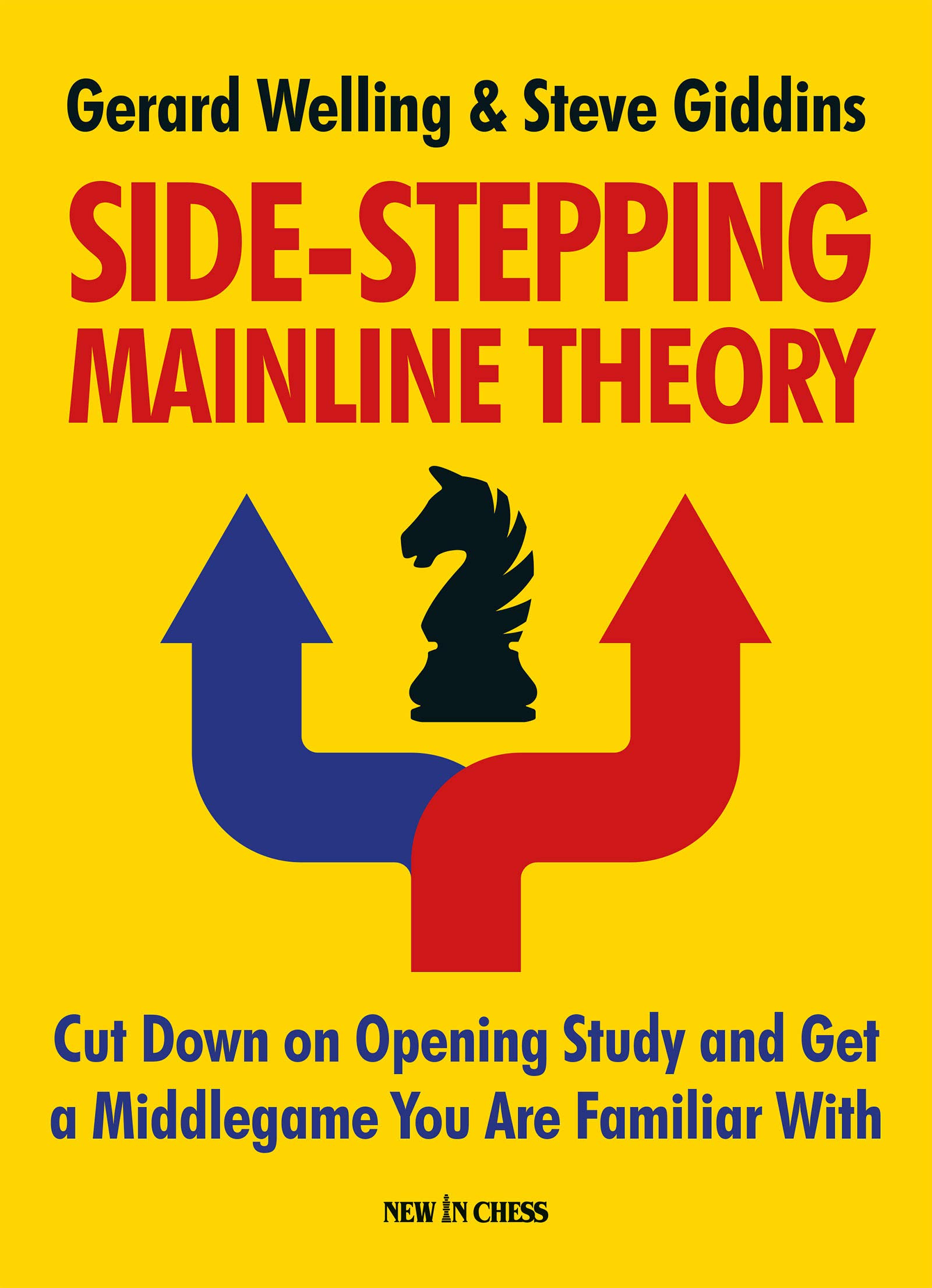
BCN wishes Happy Birthday to FM Stephen William Giddins (29-01-1961)
Here are his games from chessgames.com
We reviewed his most recent book, co-authored with IM Gerard Welling : Side-Stepping Mainline Theory

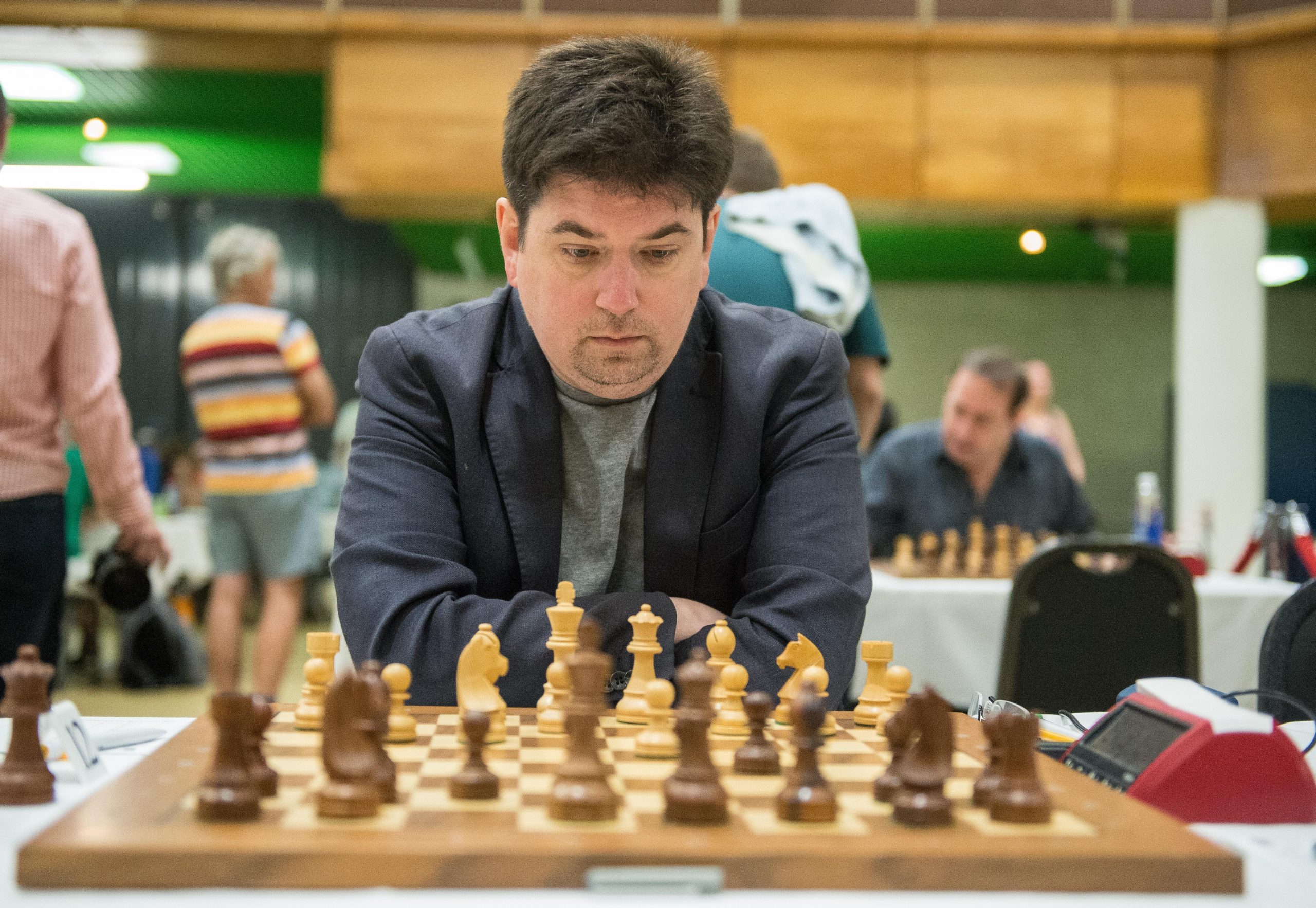
Best Birthday wishes to IM Richard Adam Bates born on this day (January 27th) in 1979.
Richard has won the Southern Counties (SCCU) championship in the 2015-16, 2016-17 (with Nick Pert) and 2017-18 seasons.
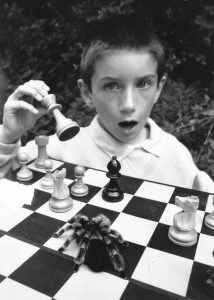
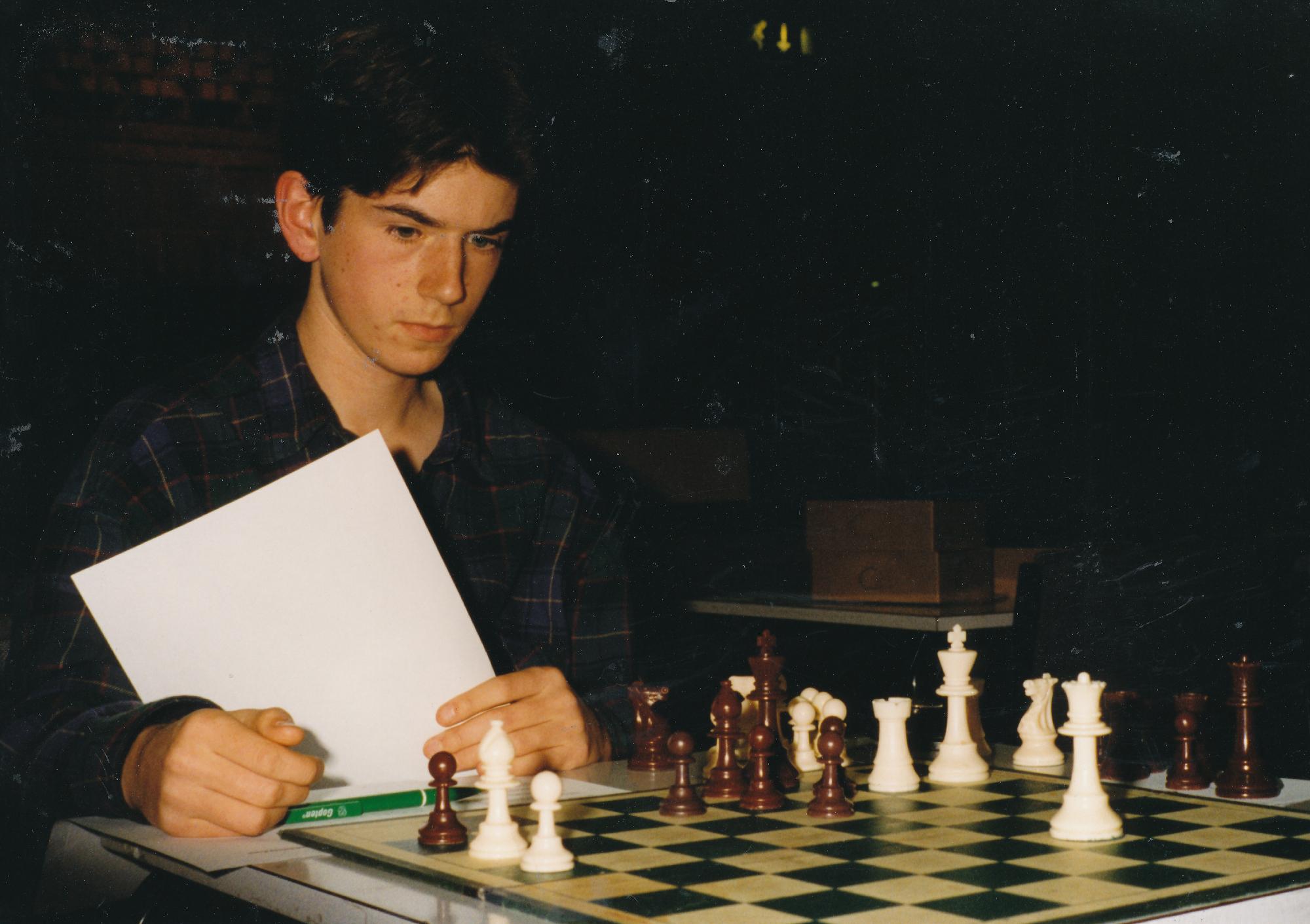

IM Richard Bates
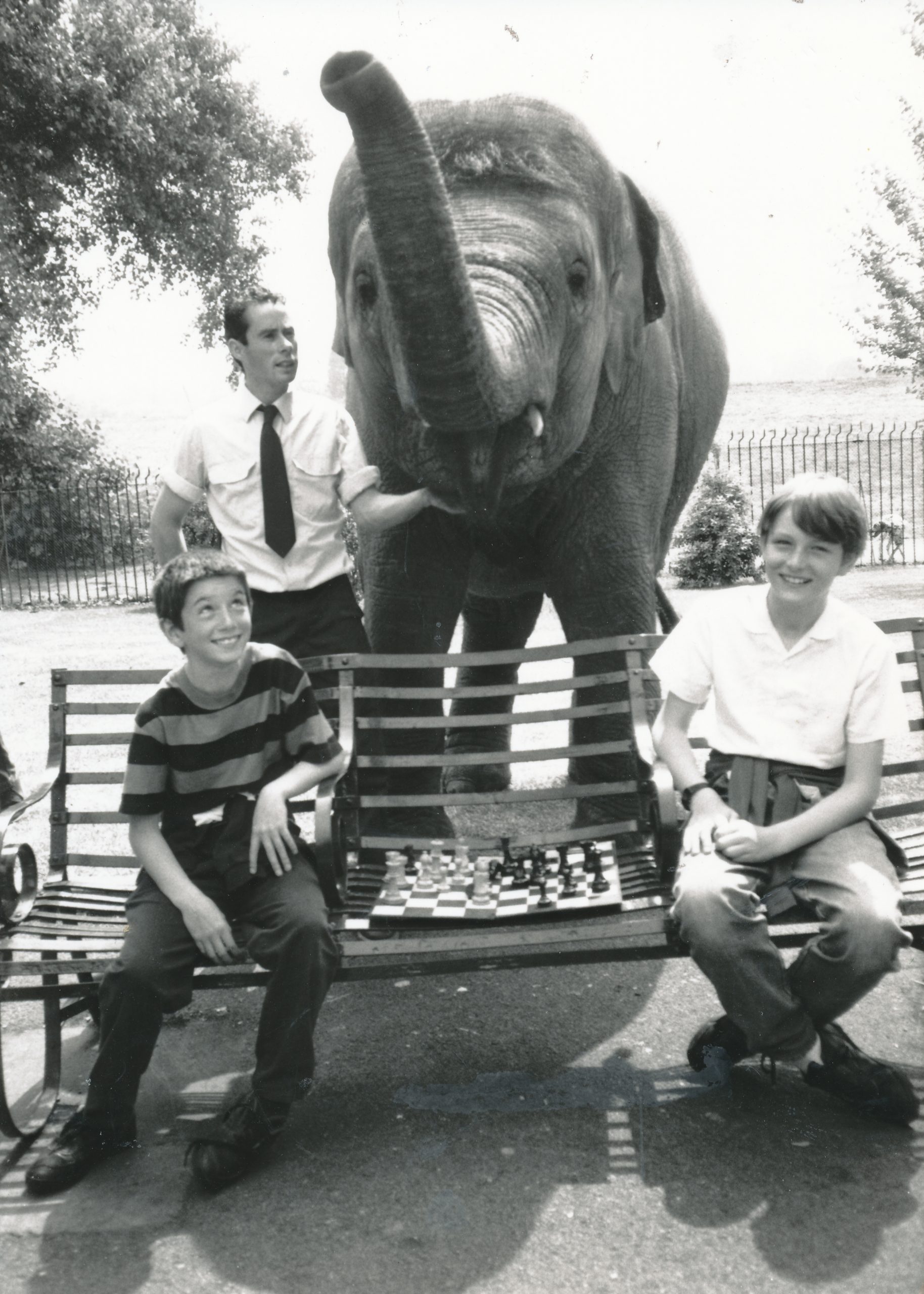
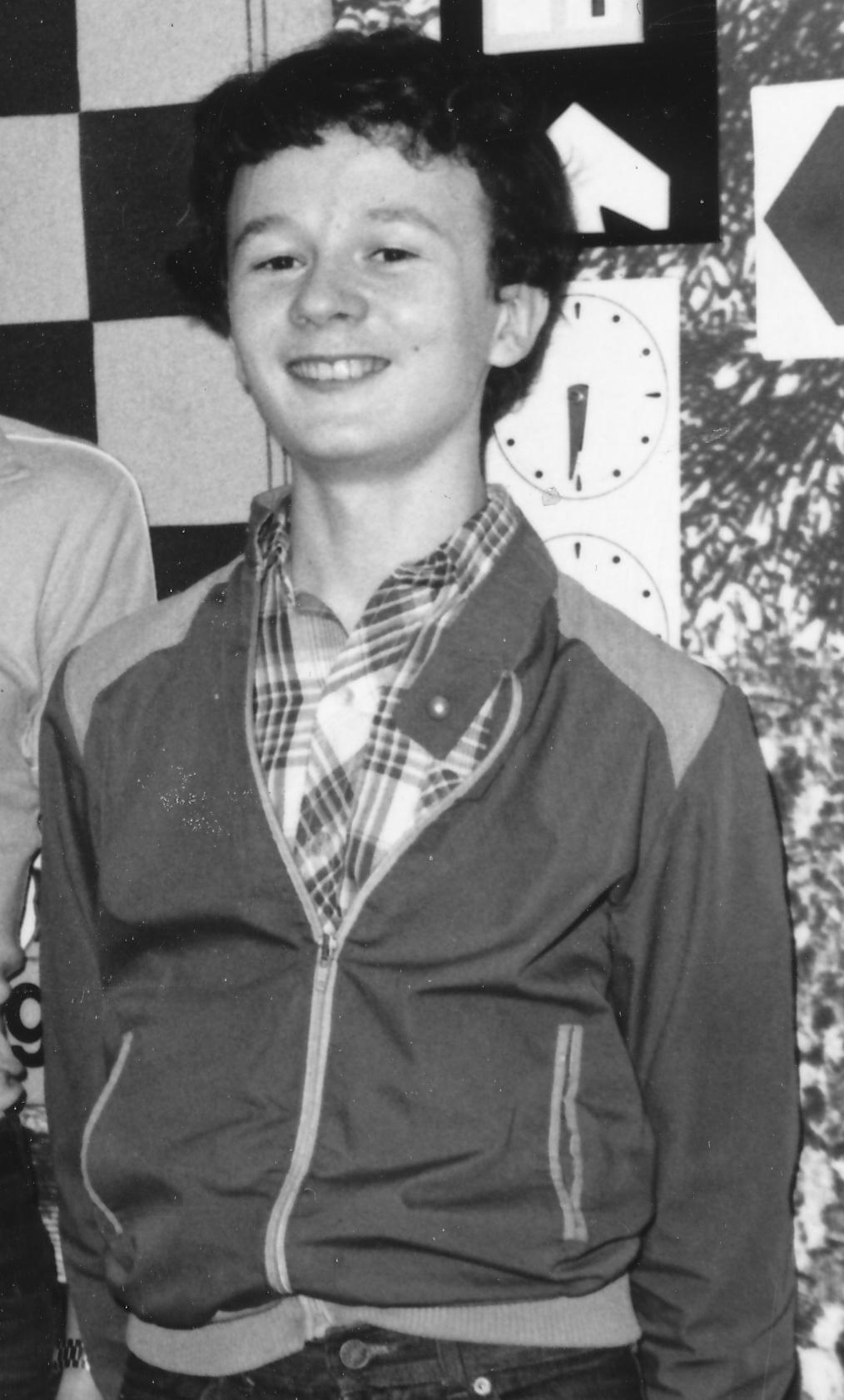
We remember Ian Duncan Wells who very sadly passed away on this day (January 25th) in 1982 aged seventeen years.
From Chessgames.com :
Ian Duncan Wells was born in Scarborough, England. He was awarded the FM title in 1982. At the Islington Open in December 1981 he finished 1st= with John Nunn and Tony Miles. Following a 5th= placing in the Golden Pawn of Brazil Junior tournament held in Rio de Janeiro he and other players went swimming outside their hotel. He got into difficulties and although he was brought ashore by lifesavers he died after six days in a coma.
Here is an excellent article from chess.com written by Neil Blackburn.
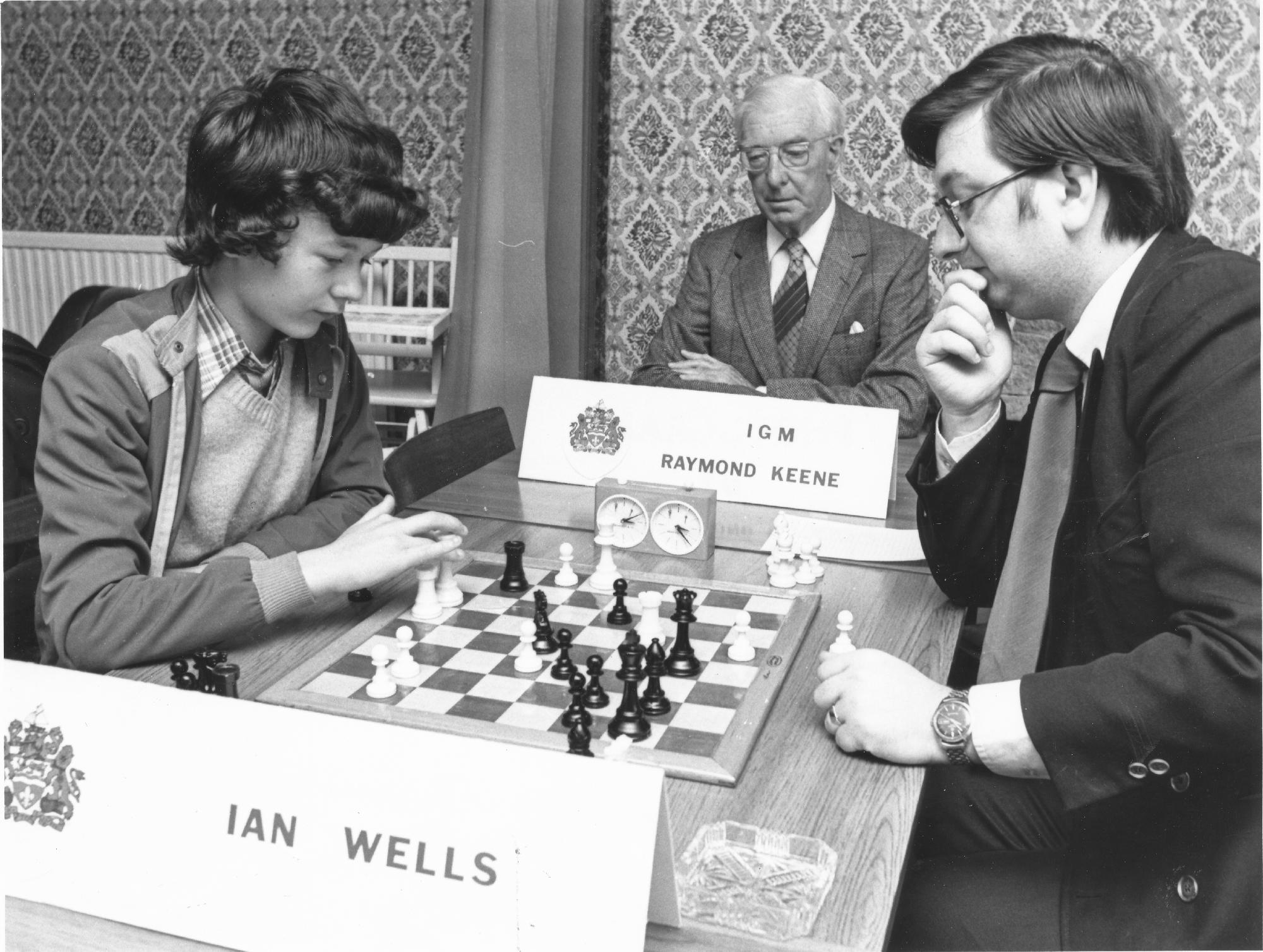
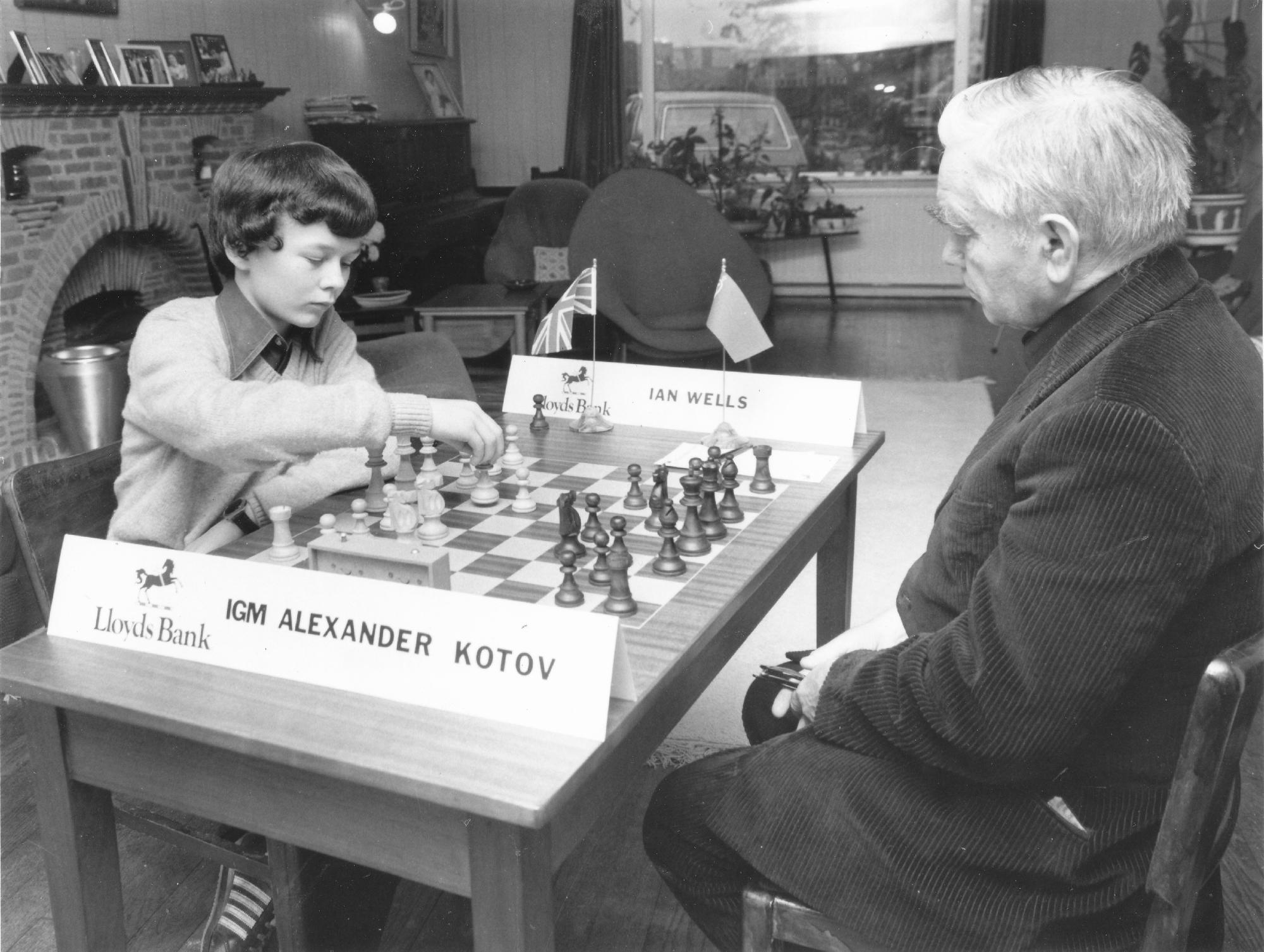
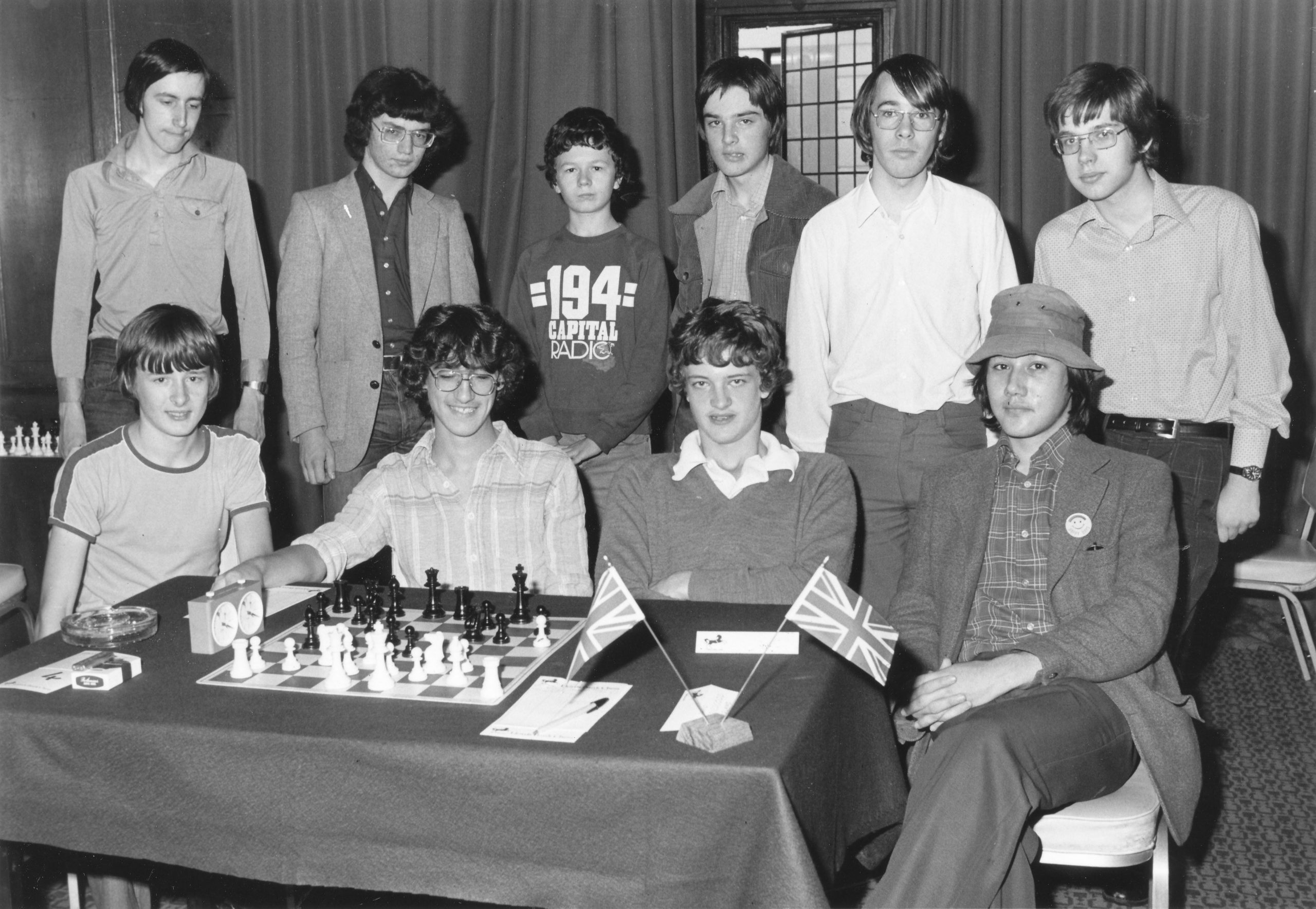
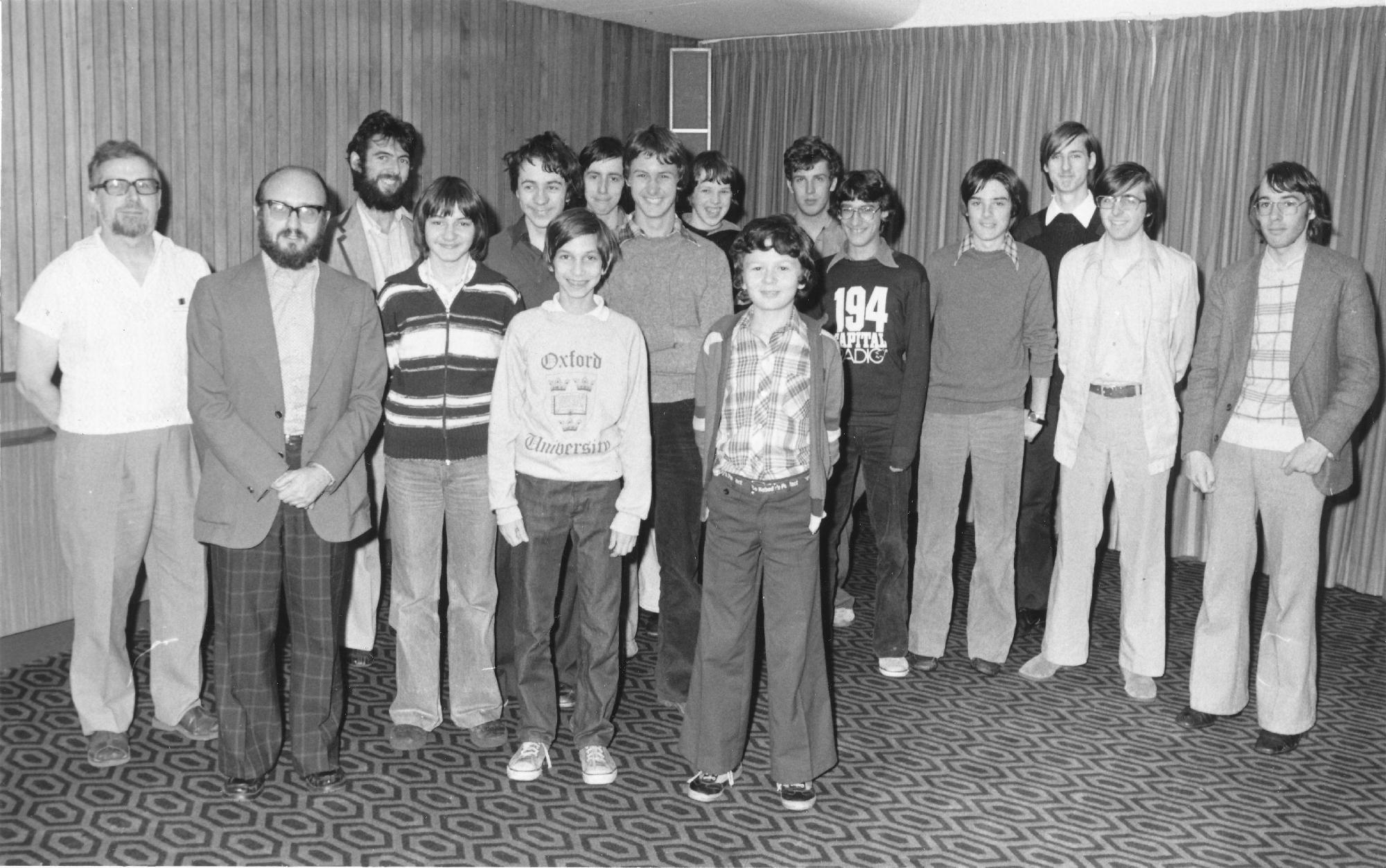
We send best wishes to IM Adam Taylor on his birthday.
Adam C? Taylor was born on Friday, January 23rd, 1998 in Colchester, Essex. Adam has a sister, Nathalie Leanne Taylor who also plays and studied History & Economics at The University of York. His mother Deborah was always supportive during his chess career.
He attended The Gilberd School, Colchester until 2014 and then Colchester Sixth Form College and currently resides in Colchester, Essex.

Adam’s first recorded rapidplay event was the Basildon Junior Congress resulting in a published grade of 34D and his first graded standard play event was the 2009 London Junior Under-12 Championships and his first published standard-play grading was 73E.
In that same year at Torquay Adam won the British Under-12 title sharing with Radha Jain.
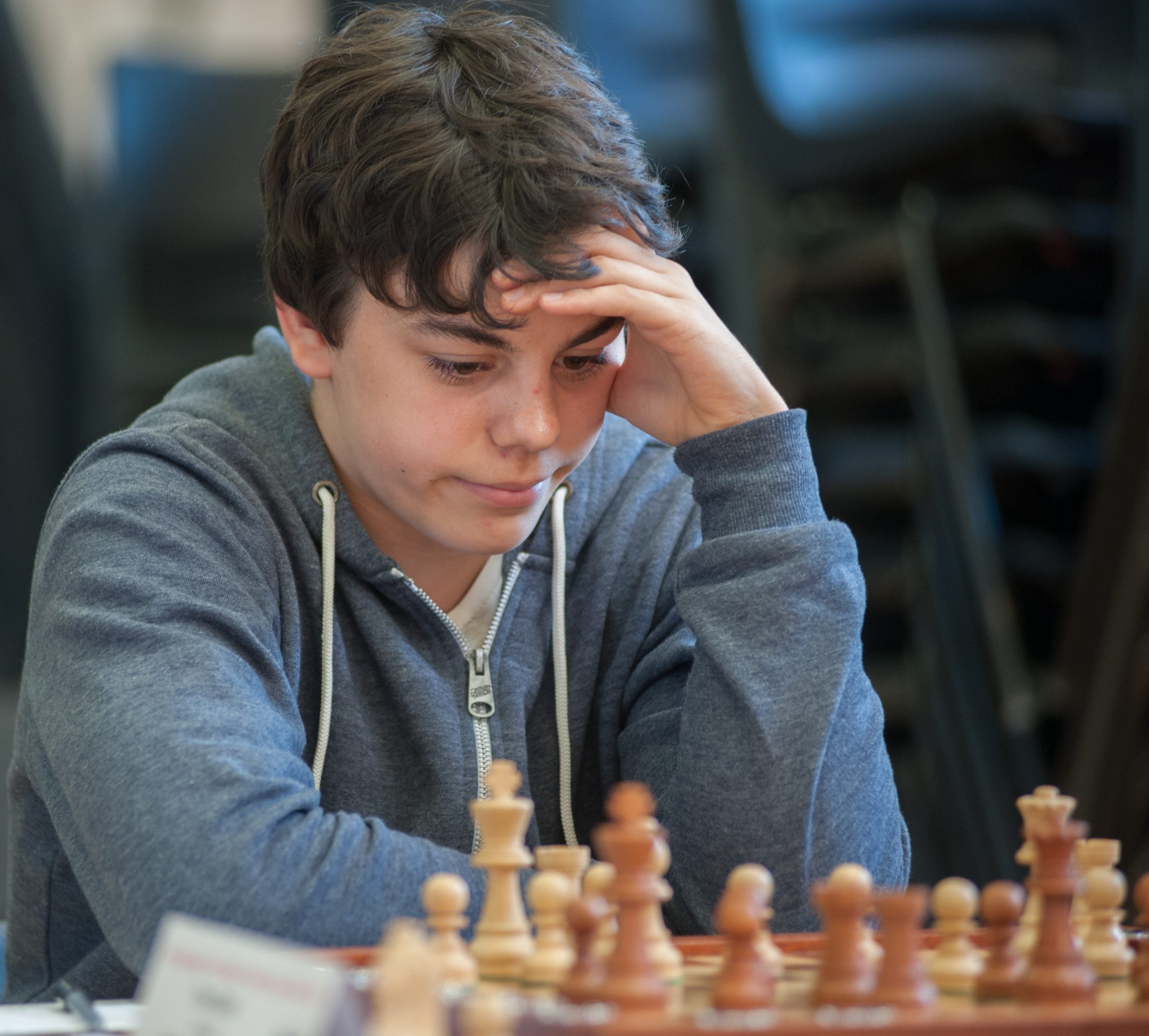
Adam made his first 4NCL appearance in May 2012 for SC Stars followed by Anglian Avengers. In 2018 the lure of the big lights of Division One beckoned and Wood Green became Adam’s team now playing for Wood Green Monarchs in the Online 4NCL championship.
In 2017 Adam scored an impressive 6/9 (and =2nd) when he travelled to Greece to play in the Heraklion 1st Capablanca Memorial.
The Hastings Open in 2018 saw an excellent =7th with 6.5/10.
Adam’s IM title was ratified in June of 2019 in Baku and currently (January 2021) holds a FIDE standard play rating of 2347 and an ECF standard play rating of 2260A. His highest ECF standard play grading was 230A in July 2019. We expect this to be exceeded once OTB play resumes.
Battersea Chess Club celebrated Adams’s title in style with this article written by Leon Watson
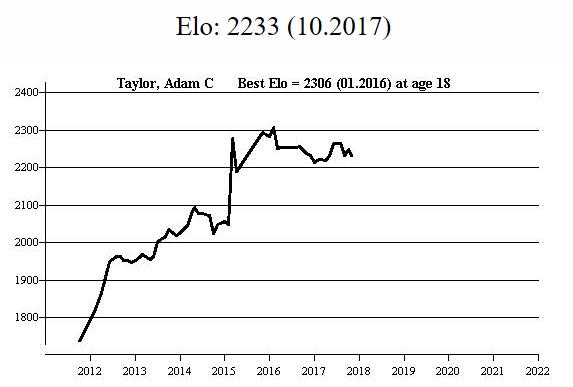
Adam has played for Bury St. Edmunds and Manningtree and now Battersea in the London League and Wood Green in the Four Nations Chess League (4NCL) and has made many appearances in the UKCC Terafinal.
Adam is known as ? on chess.com and as AdamTaylor2301 on LiChess.com and regularly streams on Twitch and other platforms.
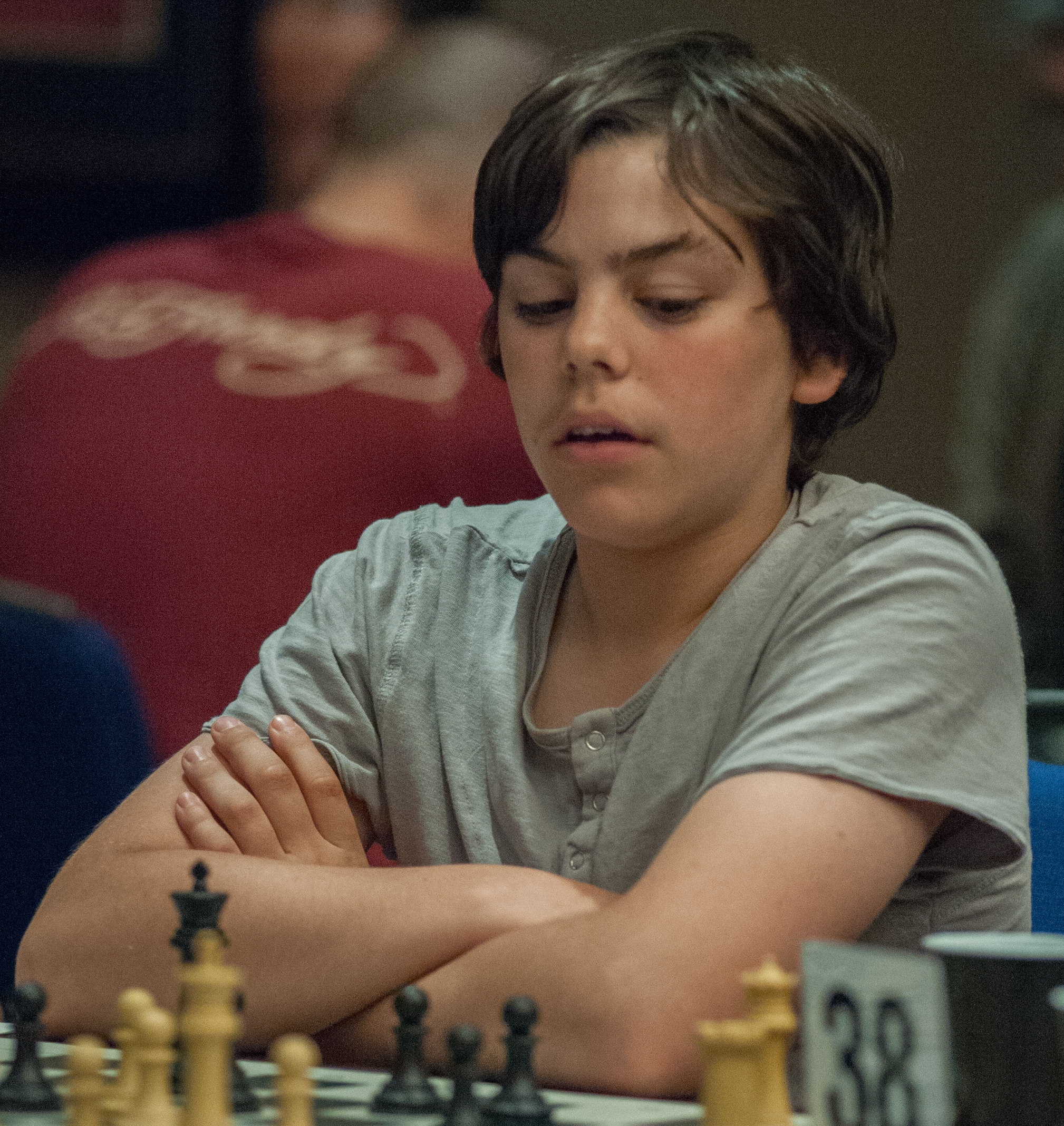
On the 13th of September 2019 Adam became the sole director of MakingGrandmasters Limited which lists on its web site a number of leading young English players engaging in coaching such as Matthew Wadsworth, Ravi Haria and Daniel Fernandez to name but a few.
One of Adam’s more notable students is Guildford Chess Club member Jessica Mellor who, in 2018, won Gold in the Under-11 category of the European Schools Championship.
More recently Adam has taken a back seat from chess and has become a golf professional.
With the white pieces Adam favours a Reti/English set-up where c4 quickly follows a king side fianchetto. Here is a typical game of Adam’s with the white against a strong opponent :
With the black pieces Adam essays the Berlin Defence and the Sicilian Najdorf as well as the Benko Gambit and Nimzo-Indian Defence.
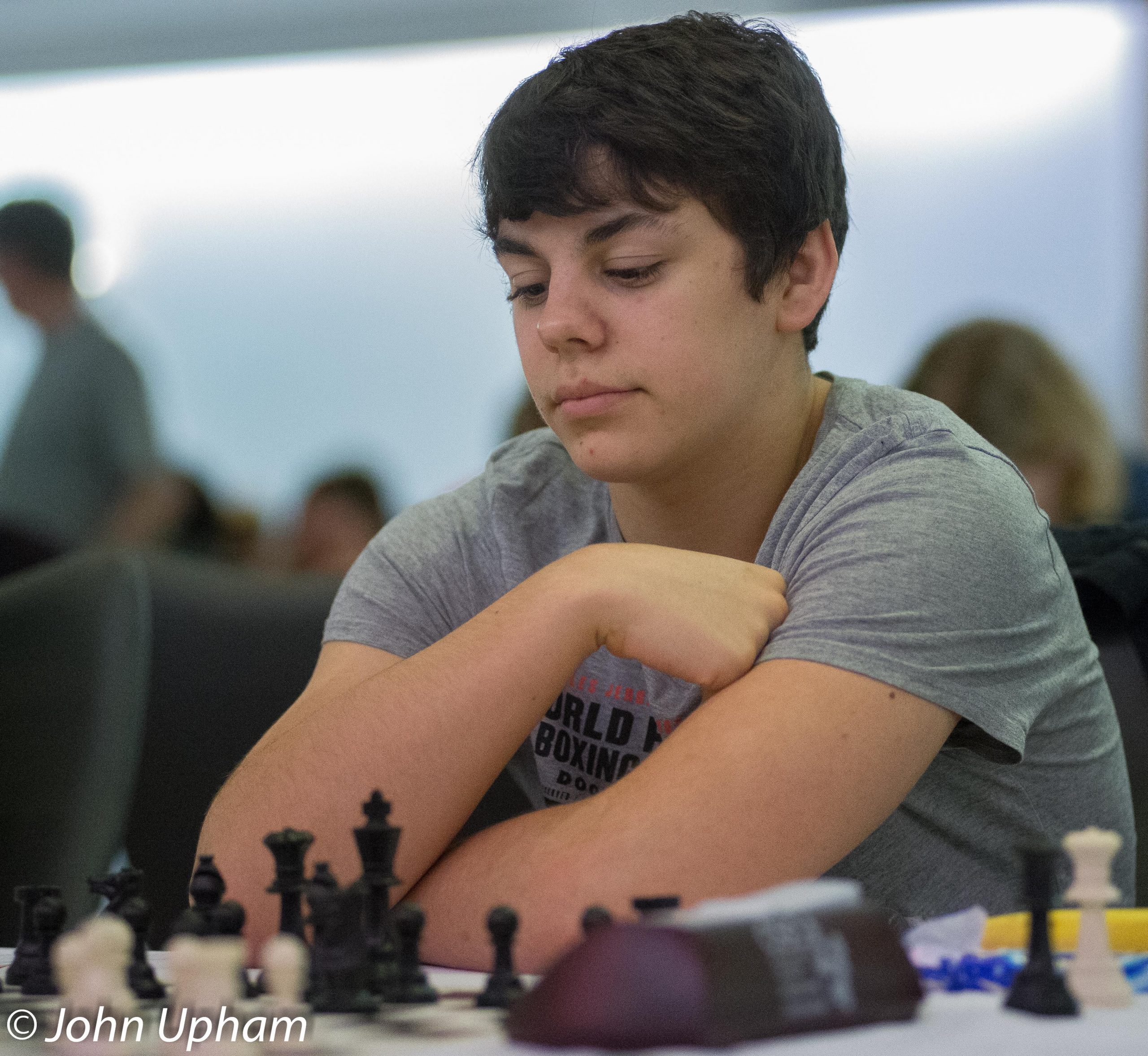
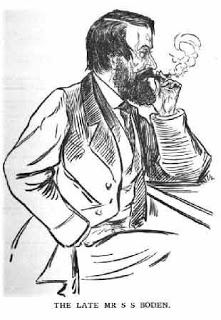
We remember Samuel Boden, who passed away on this day, Friday, January 13th in 1882 at 3 Tavistock Street, Bedford Square, Middlesex.
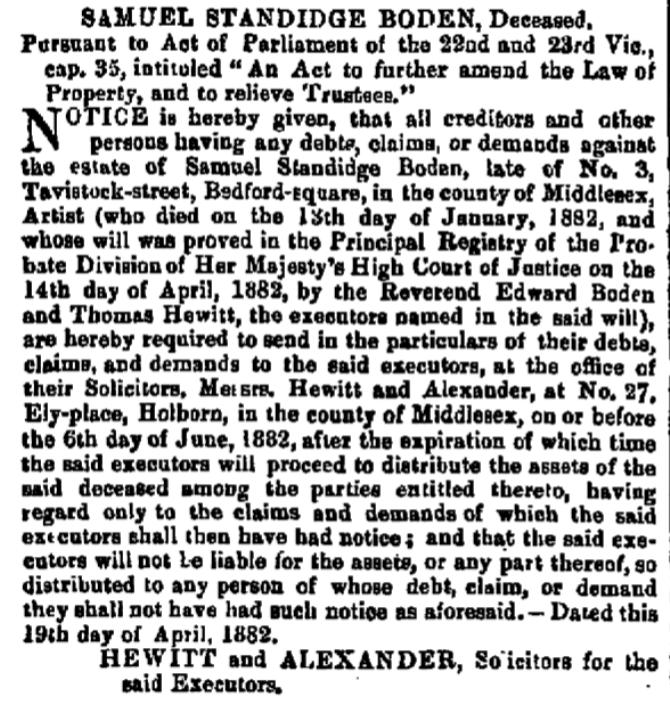
Samuel Standidge Boden was born on Thursday, May 4th, 1826 in East Retford, Nottinghamshire. His parents were James (b. 1795/96) and Mary Frances Boden (b. 1800/01).
(Several secondary and tertiary sources give the birth month as April. It would appear that a transcription error was responsible.)
James was an Independent Congregational Minister who worked in West Retford and was responsible for recording parish birth and baptismal (and probably marriage) records including those of his own children.
Samuel was baptised by his father (for the first time!) on July 27th at Chapel Gate (independent) Church.

Samuel had at least nine siblings and the details of these plus other family members (including multiple baptisms) may be found on Steve Mann’s Yorkshire Chess History.
From The Encyclopaedia of Chess by Anne Sunnucks :
“Boden was considered by Paul Morphy to be the strongest player in England in 1858. However, he is generally considered to have ranked below Staunton and to have been either the second of third strongest player, the other player being Buckle.
Born in Hull on 4th April 1826, Boden first came to the notice of British chess players when he won a provincial tournament in 1851. In 1858 he played two matches against John Owen , winning both, the first by +5 -3 =1 and the second by +5 -1. He played in very few major tournaments and his strength ws judged mainly from friendly games and small tournaments. He was the author of A Popular Introduction to Chess and conducted the chess column in The Field for 13 years.
He died of typhoid fever on 13th January 1882 and is buried in Woking, Surrey.”
According to Steve Mann :
“He was buried on 17/01/1882 at Brookwood Cemetery, Brookwood, Surrey. This cemetery was also known as the London Necropolis, having been specially instituted to take London’s dead at a time when space within London was becoming scarce. A transcription of the Surrey Burial Registers gave his name as “Samuel Standage Boden” and his age to be 55. The burial date, the deceased’s age, and the nature of the cemetery, together make it clear this was the chess-player, even though they misspelt his middle name.”
From The Oxford Companion to Chess by David Hooper & Ken Whyld :
English player active in the 1850s. In 1851 he wrote A Popular Introduction to the Study and Practice of Chess, an excellent guide introducing the Boden-Kieseritzky Gambit which at once became popular. In the same year he won the ‘provincial tournament” run concurrently with the London international tournament. At Manchester 1857, a knock-out event, he came second to Lowenthal— he drew one game of the final match and then withdrew. In 1858 Boden defeated Owen in a match ( + 7=2-3) and he played many friendly games with Morphy, who declared him to be the strongest English player; since Staunton and Buckle had retired this judgement was probably right. Also in 1858 he restarted the chess column in The Field , handing over to de Vere in 1872. The column has continued uninterruptedly ever since. Besides chess and his work as a railway company employee Boden found time to become a competent amateur painter and an art critic.
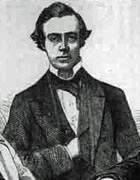
From The Encyclopaedia of Chess by Harry Golombek OBE :
British master, considered by Morphy to have been the strongest opponent whom he played while in England (Boden’s record against Morphy in casual games was +1-6=4). Tournament results include 2nd Manchester 1857 and 2nd Bristol 1861. Chess editor of The Field 1858-1873. His name is linked with the Boden-Kieseritsky Gambit : 1.e4 e5 2.Bc4 Nf6 3.Nf3 Nxe4 4. Nc3 Nxc3 5.dxc3 f6 (article authored by Ray Keene).
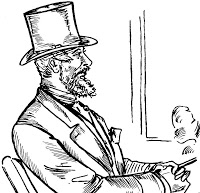
Boden’s name is associated with a variation of the Philidor Defence:
and a line of the Ruy Lopez:
Most players will be familiar with this mating pattern that is Boden’s Mate using two bishops in a cross pattern.
Here is an example puzzle from 1001 Chess Exercises for Club Players that demonstrates the pattern :
White to play and checkmate.
Here is an in-depth article about Boden’s Mate from Edward Winter
We remember William Ritson Morry who passed away thirty years today on Saturday, January 8th, 1994.
(A point of detail : It is incorrect, but many do, to write WRM hyphenated. His first name was William, his middle name was Ritson and his surname was Morry. He chose to use his middle name and was known by his friends as Ritson. Maybe this was because he father was also William Morry?)
WRM was born in the Wirral on Monday, September 5th 1910 and his father was William Doughty Morry (born 16th July 1877). William was a sub-postmaster and seller of fancy goods. His mother was Norah Morry (née Holloway) who undertook “unpaid domestic duties”.
Ritson attended Friars School, Bangor (established in 1557) along with BH Wood. BHW was one year and three months older than WRM so it is entirely possible that they had met.
In the 1939 register he is recorded as being a solicitor with his own practice and was living at 294 Walmley Road, Royal Sutton Coldfield, Warwickshire with his parents : he was 29 years old.
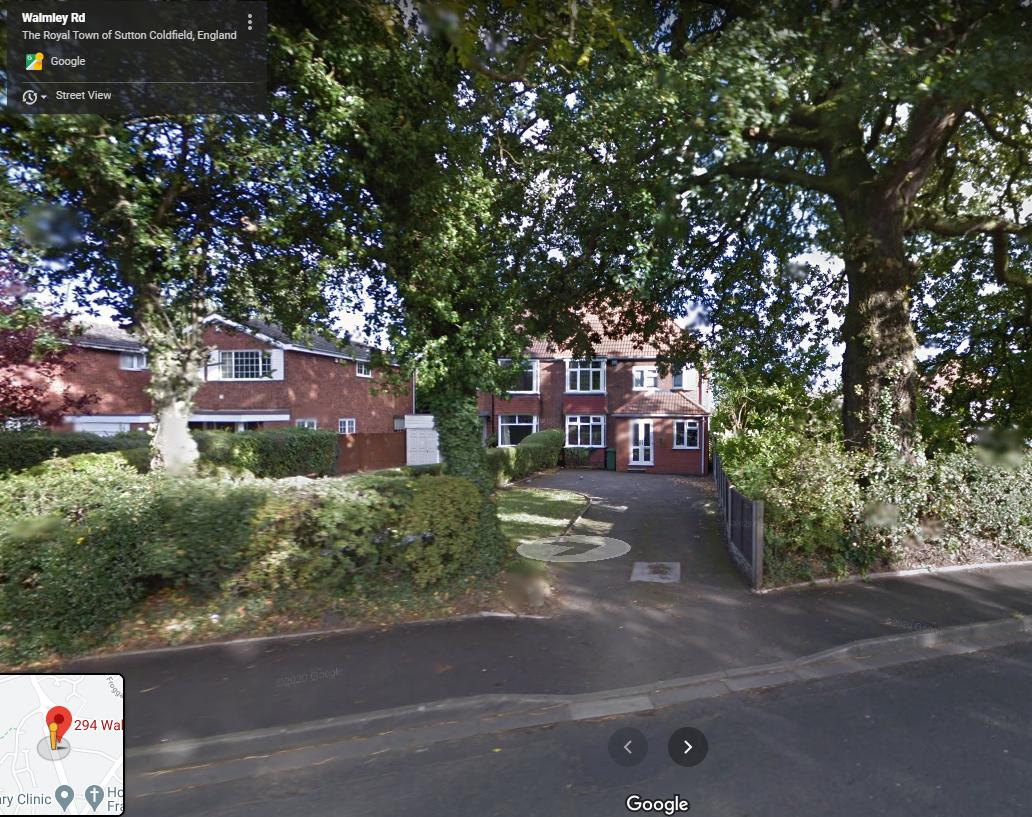
In 1940 WRM married Nellie Cooper in Sutton Coldfield.
In 1943 WRM was mentioned in the London Gazette several times:
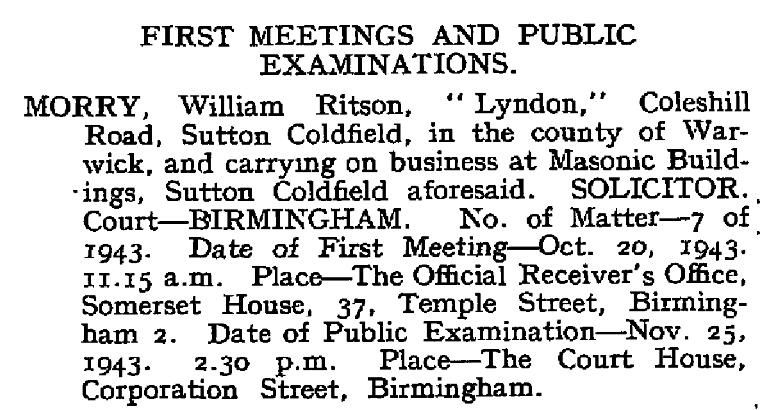
It would appear that this was the start of his first bankruptcy proceedings..
WRM was, by now, living at “Lyndon”, Coleshill Road, Sutton Coldfield, Warwickshire :
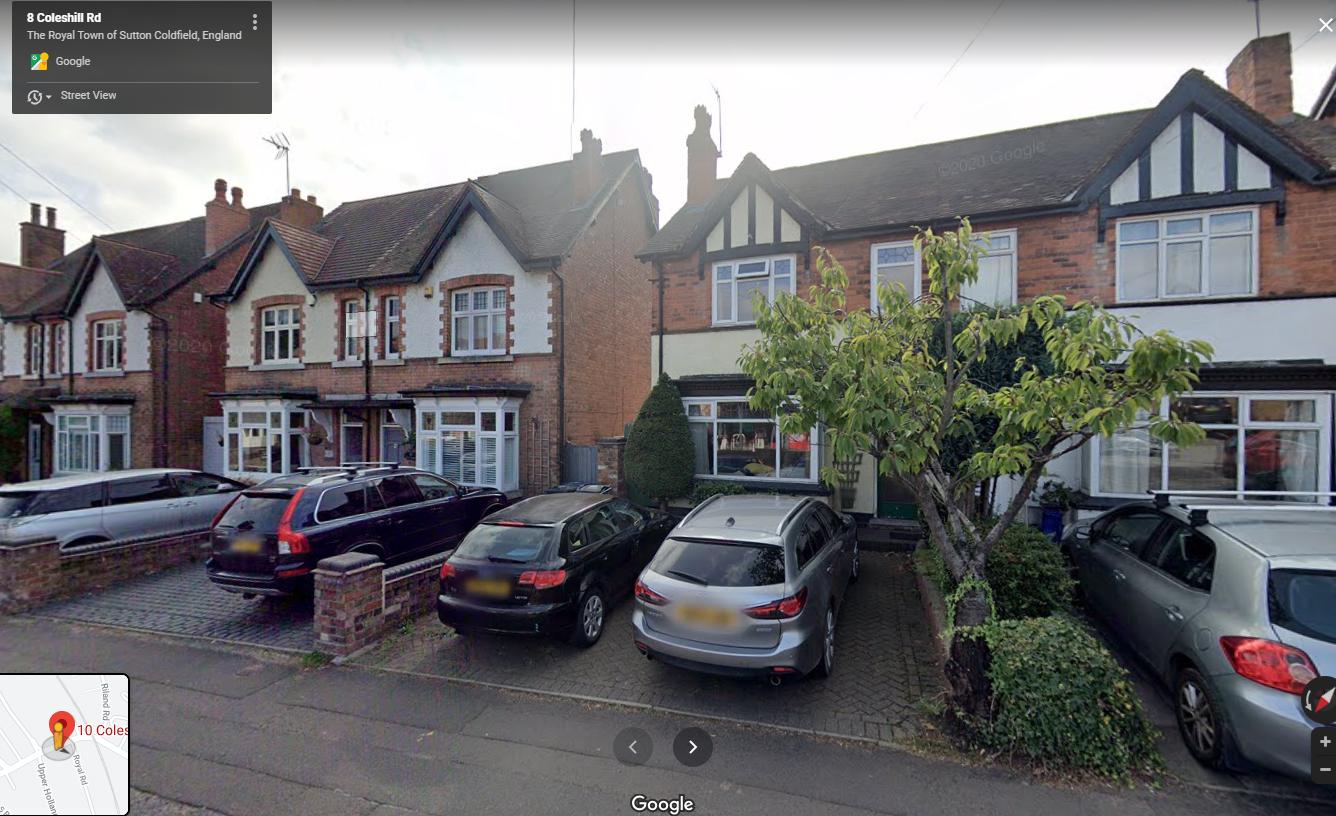
and in the same year on September 30th he was officially made bankrupt as recorded in the London Gazette, order number 195. This notice was repeated in the Edinburgh Gazette of the same year.
On the 8th of June 1944 he was recorded as being struck-off the list of solicitors under the Solicitors Acts of 1932 to 1941. It was determined that WRM had engaged in “fraudulent conversion of clients money”
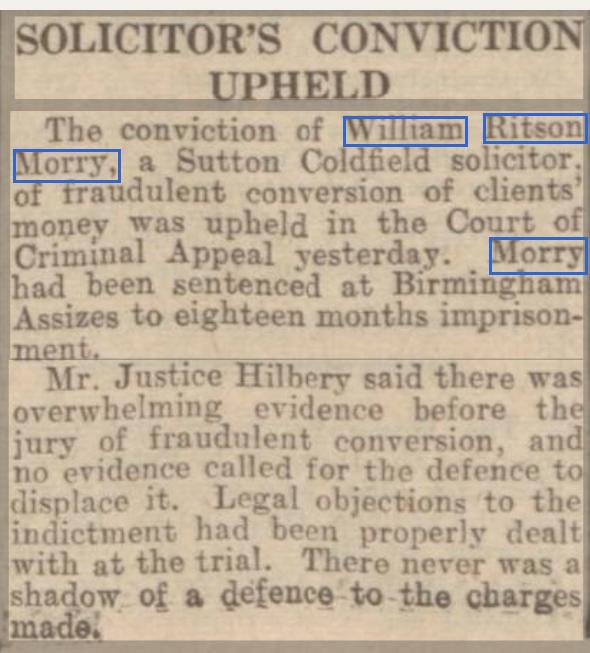
For more on this see the excellent Chess in the Courts by Edward Winter.
Here is an image of the organisers of the 1953 Whitsun Congress at Ilford including WRM:
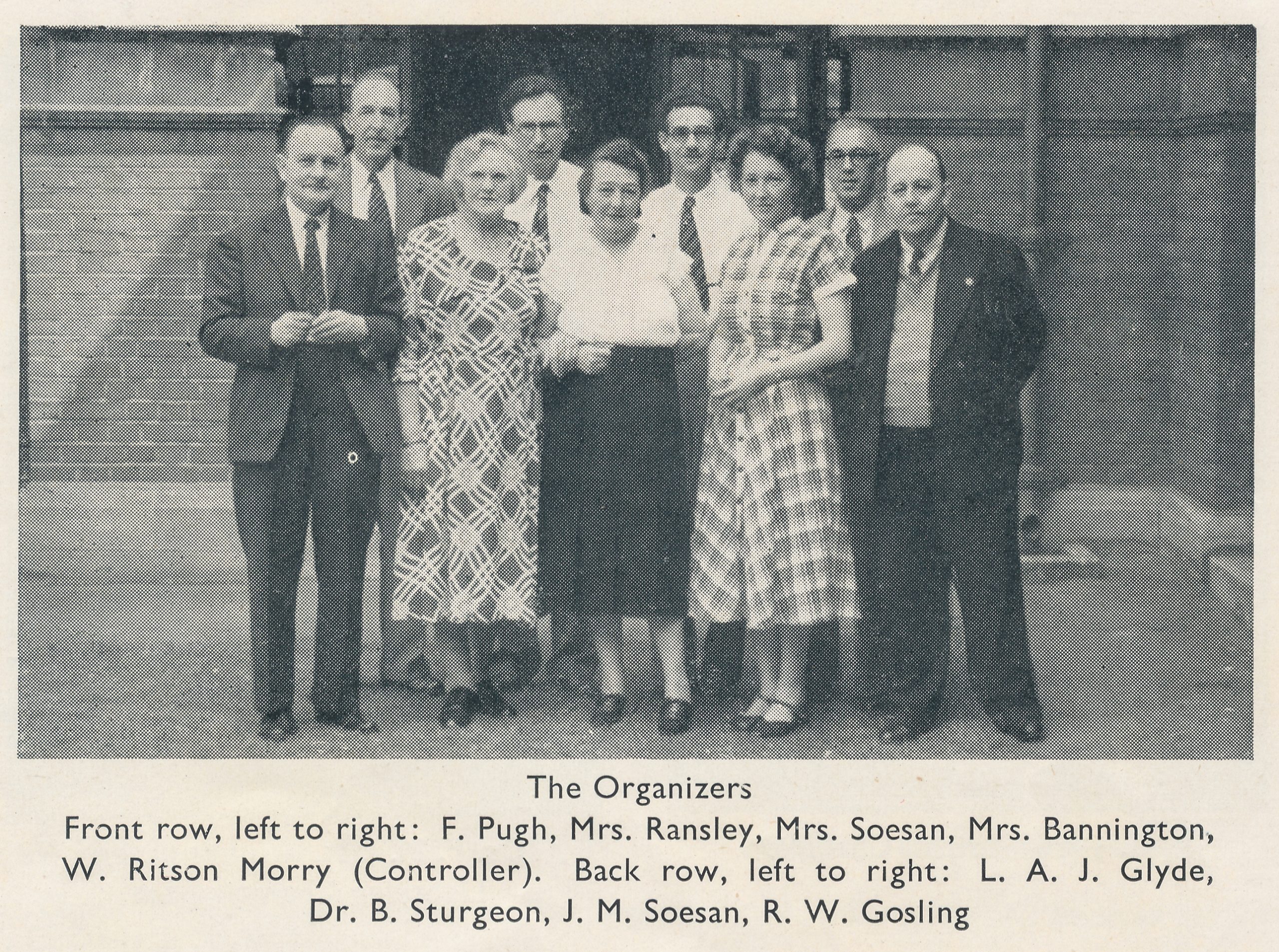
In 1954 WRM sued BH Wood for libel over a letter BHW sent to Henry Golding of the Monmouthshire County Chess Association warning him of WRMs financial history. Here is a summary of the action :
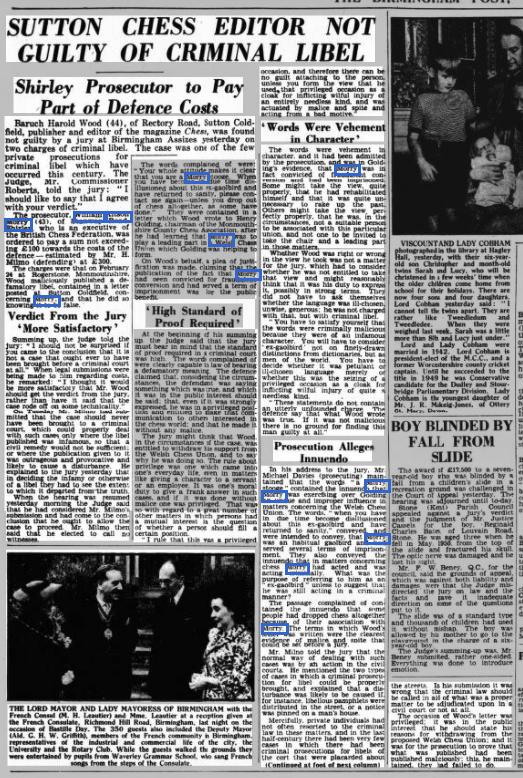
In 1983 WRM was living at Flat 2, 53, Mayfield Road, Moseley, Birmingham, West Midlands and recorded as a Retired Chess Journalist. Elsewhere he was recorded as a freelance chess and cricket journalist.
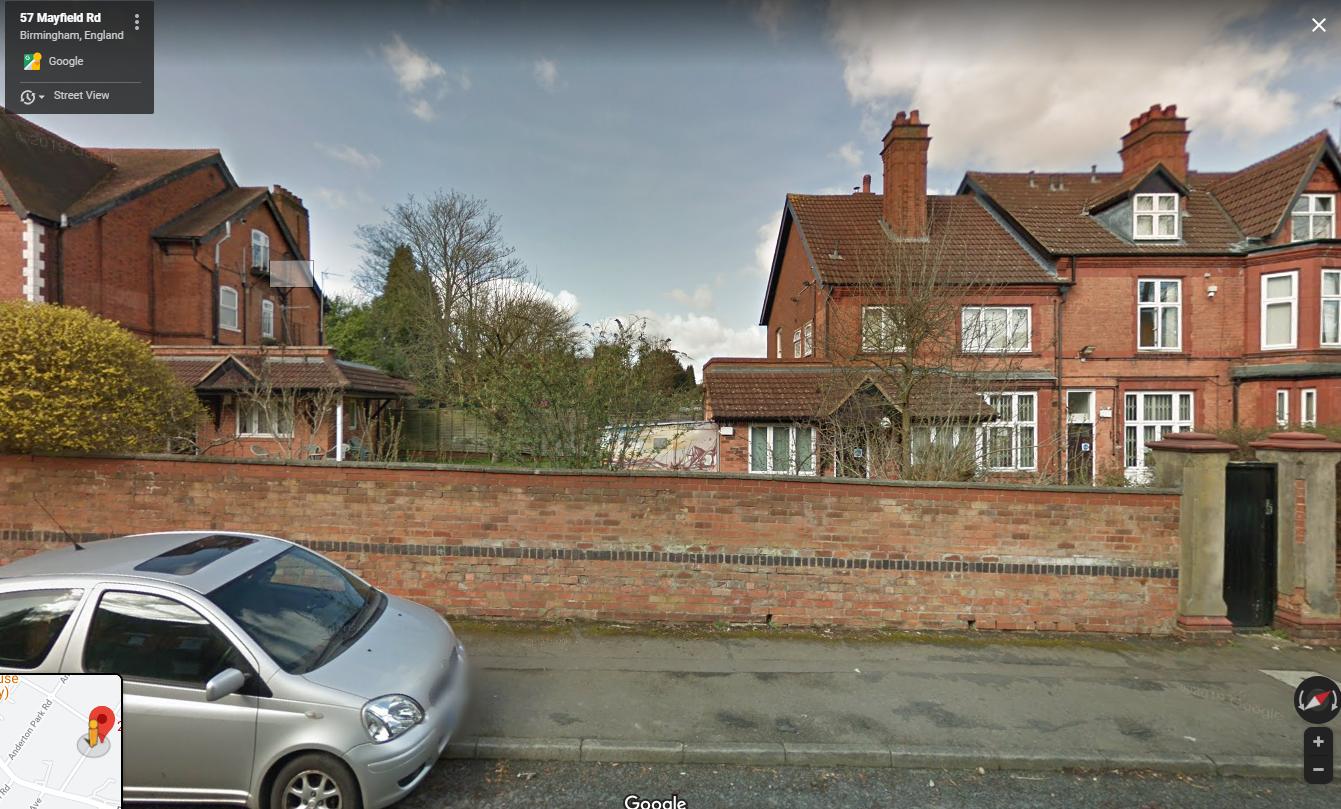
and, unfortunately, in this year he made another appearance in the London Gazette (2nd September 1983) having been made bankrupt.
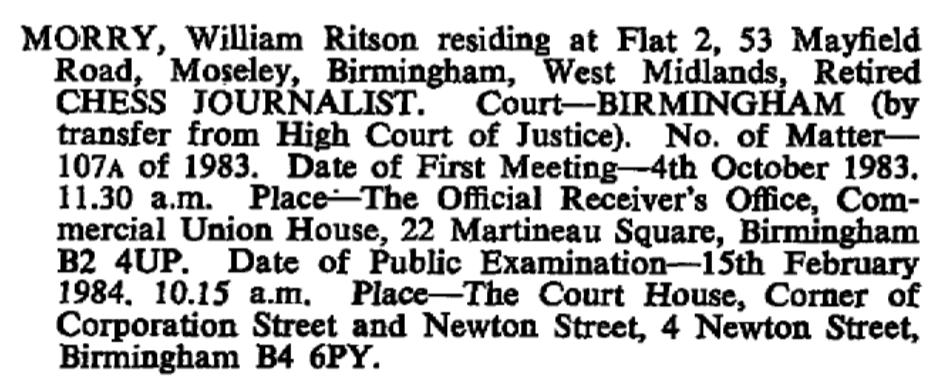
However, despite these unfortunate life events WRMs contribution to chess goes above and beyond them as he won the BCF President’s Award in 1984.
From British Chess Magazine, Volume CXIV (114, 1994), Number 2 (February), pp. 98 – 99 we have this obituary from Bernard Cafferty:
W Ritson Morry – a Tribute
That great chess character, known to everybody simply as Ritson, has left us in the fullness of years, coincidentally during the first Hastings Congress he missed for decades.
William Ritson Morry (5 ix 1910-8 i 1994) was a player, organiser, writer, arbiter and occasional sponsor of tournaments whose life touched so many aspects of chess that it is hard to know where to begin.
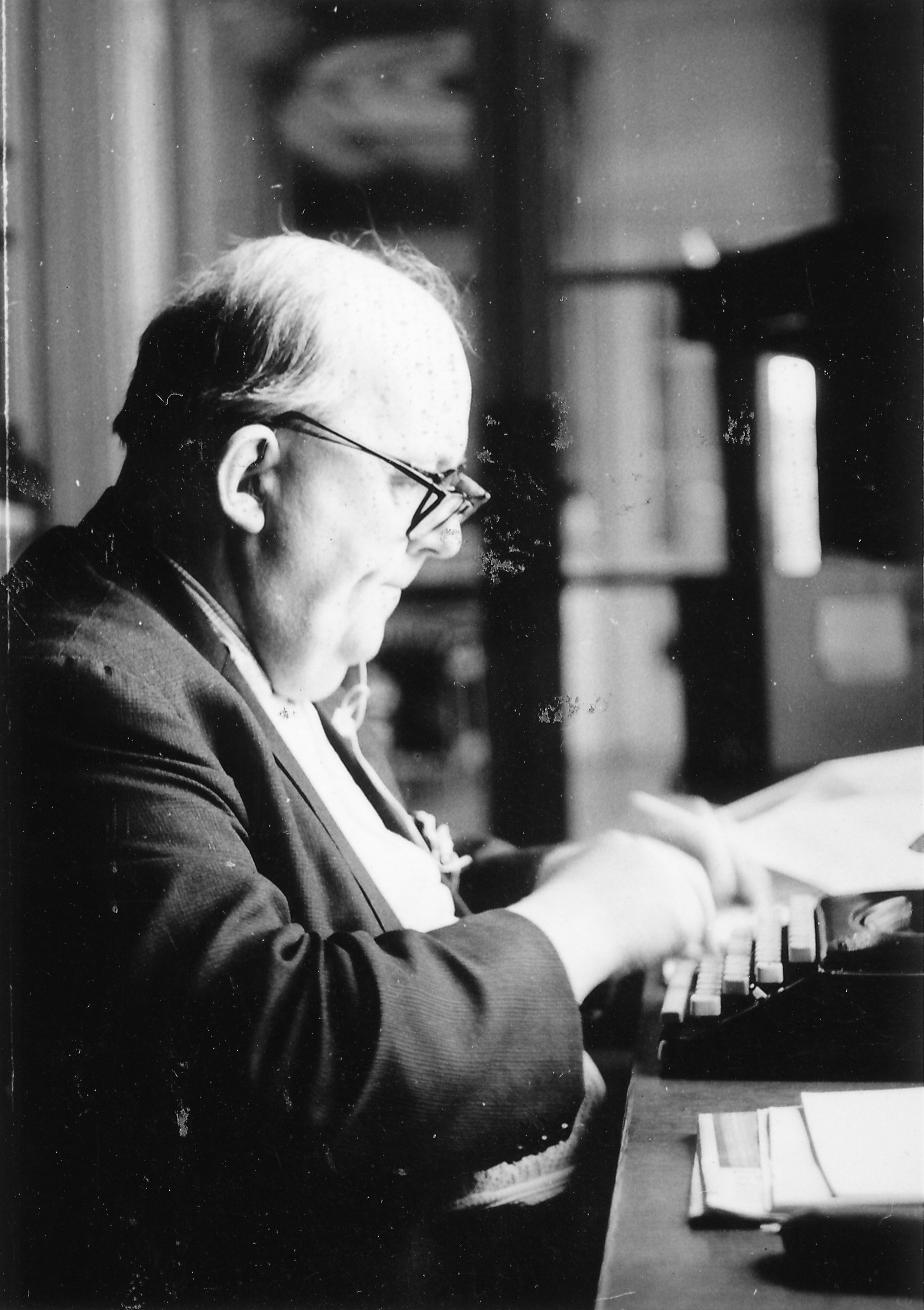
Ritson was educated in North Wales at the same school as BH Wood. Both were at Birmingham University at the same time, after which Ritson trained as a solicitor. As early as 1930 he founded the Birmingham Junior League, and a little later wrote a chess column for a time for a local newspaper, though Ritson is hardly the first person you think of as someone who would hit deadlines consistently. He was equal second in a rather unrepresentative British Championship of 1936 and equal third in 1951. An unfortunate incident in the mid-1940s led to him being struck off, whereupon he became a chess professional, who eked out a precarious living for the last 48 years of his life. Yet, I never heard him complain, for he was able to immerse himself in chess full time, and what could be better than that?
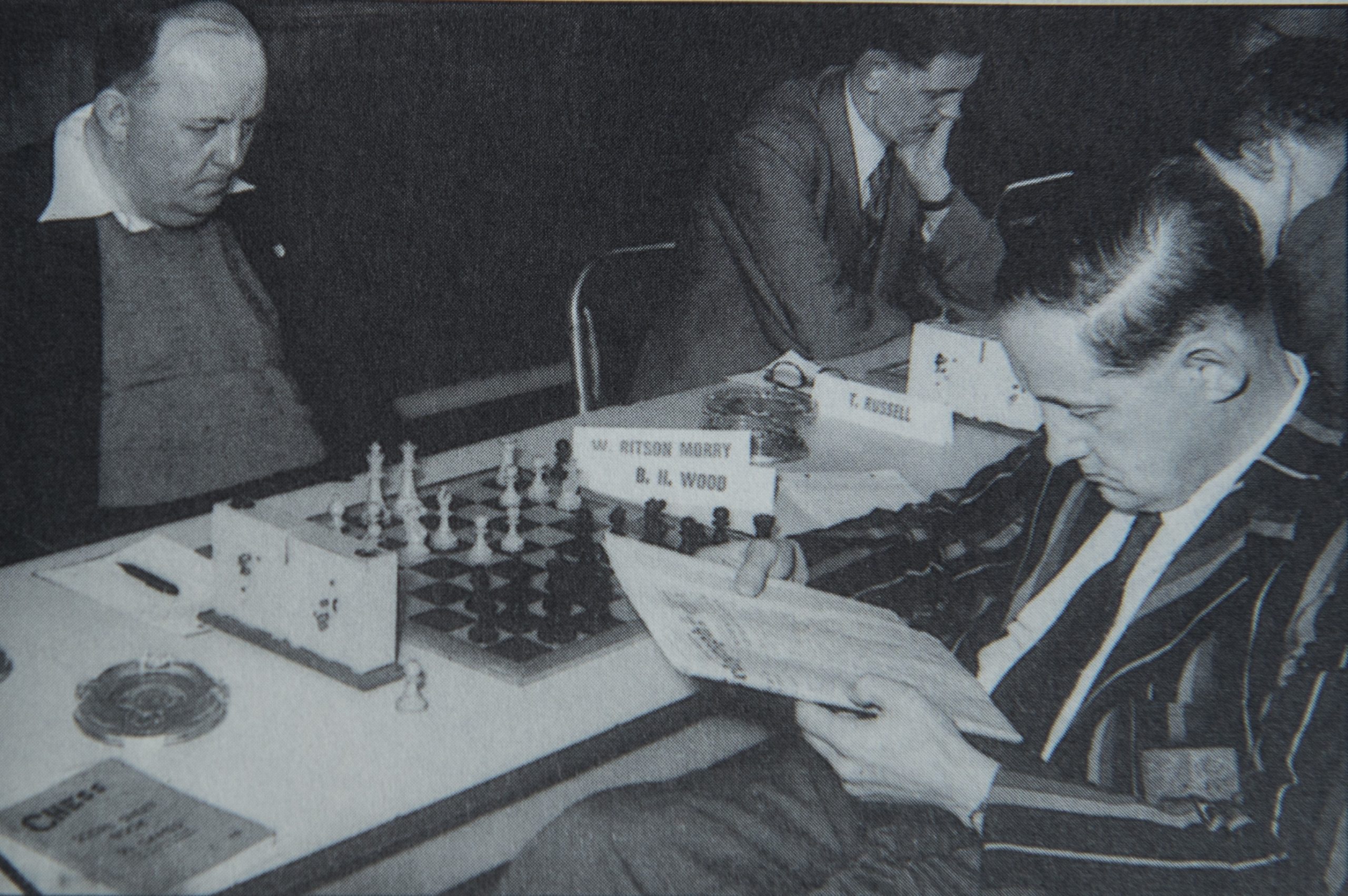
He ran a series of newsletters, which hardly covered their expenses and produced and British Championship and Hastings bulletins for many years. 1951 was a significant year in his life, for he gained the FIDE Arbiter title (he was always an expert on the rules and many of the conventions we all play to were codified by him, or under his guidance). Later on Ritson, a great raconteur, was the life and soul of the show in Hastings which, along with the Warwickshire chess team and Erdington CC, was the great love of his life.
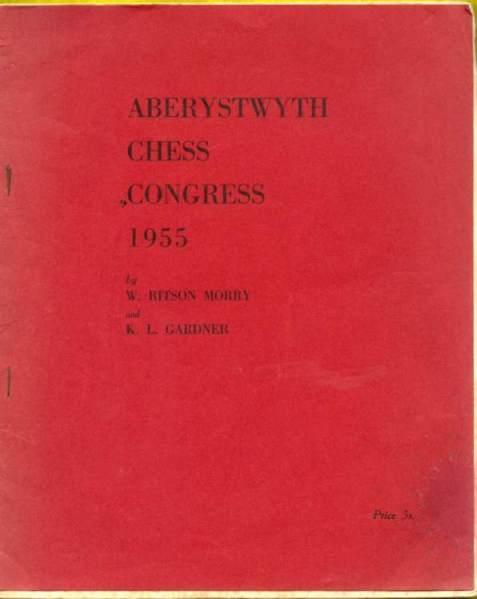
At times he seemed to run Hastings almost single-handed in the Frank Rhoden era. In fact GM Vasyukov went back to Moscow in 1966 and wrote that Ritson Morry was the only controller to be seen in the morning, afternoon and evening sessions of play. I recall that Ritson was amused when I told him of this, but did not demur. To show that there was life in the old dog, he organised a series of Birmingham international tournaments in the 1970s at which Tony Miles got much of his early experience.
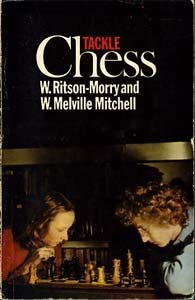
One such tournament was financed by him alone, on the basis of the sale of a piece of land in Sutton Coldfield where a change of planning status had led to a windfall profit.
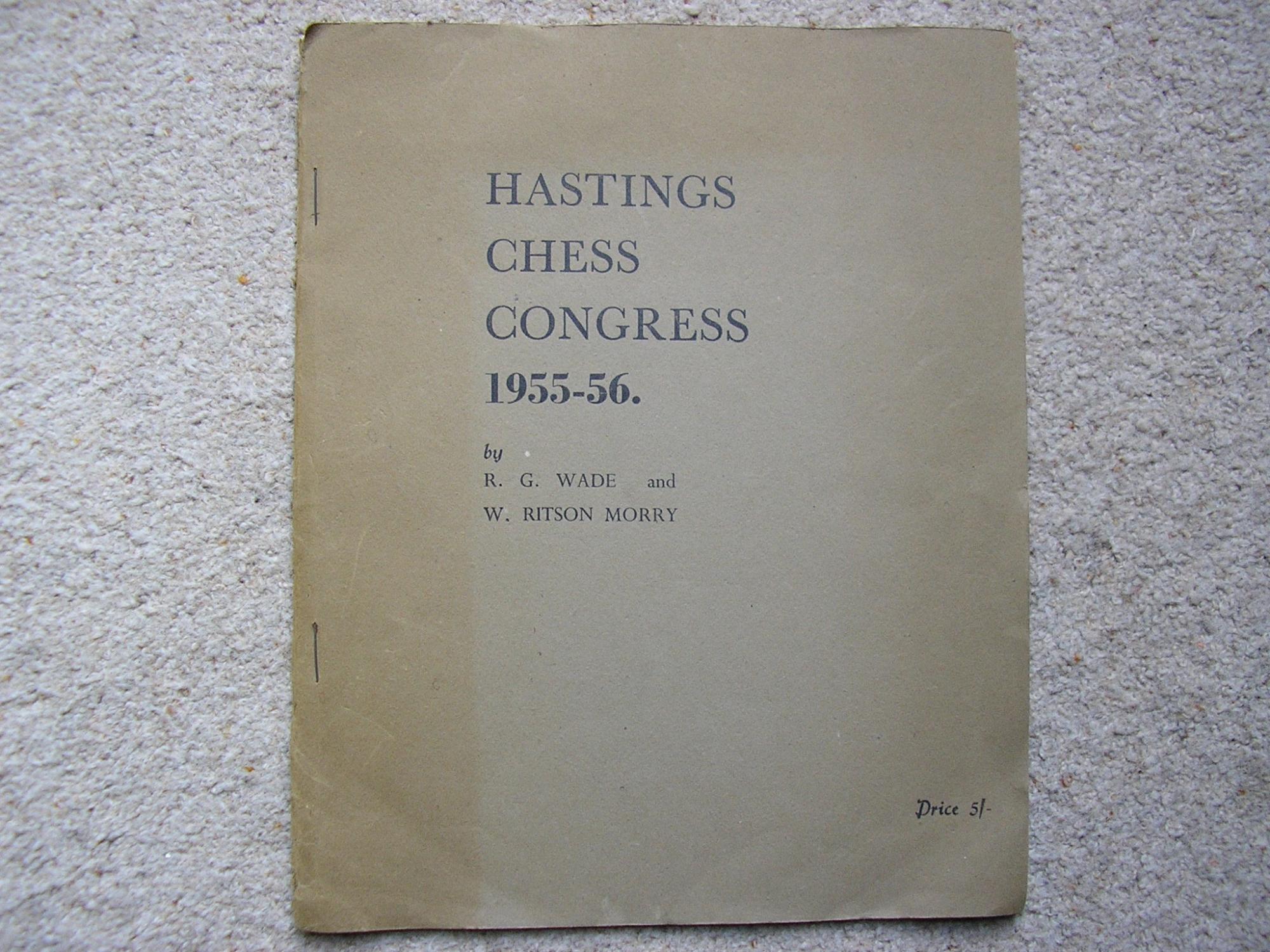
He also saved Hastings in late 1974,by giving a partial guarantee when another sponsor reduced his contribution. A few years later the Inland Revenue made him bankrupt when they could not get their piece of the action out of the deal. Doubtless Ritson thought that the money had gone to a worthier cause. I must not fail to mention his love of gambling or his erudition. Many is the time when you could have an exposition from him of the law of England, the practice of the courts and the police, or the political news of the day.
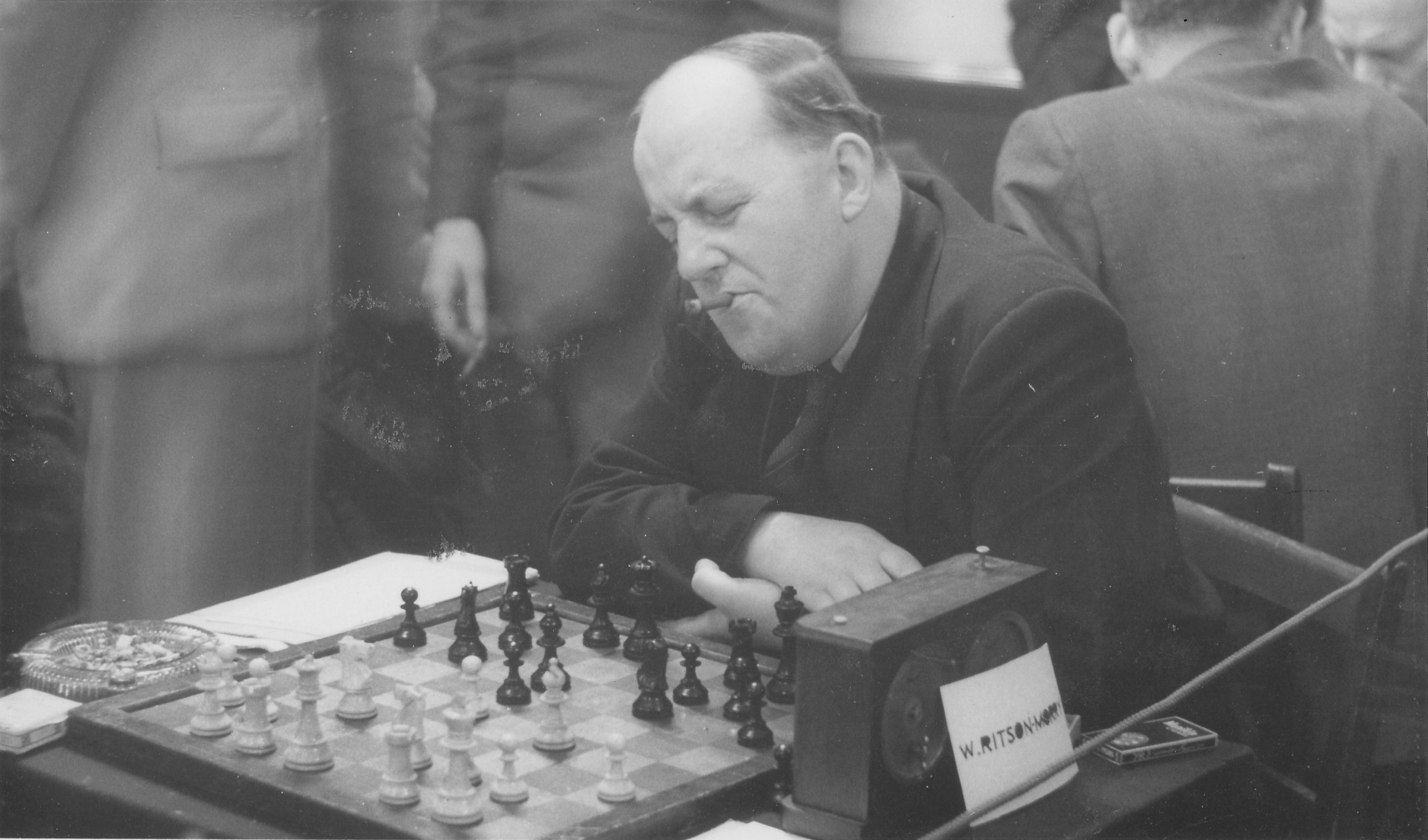
He was deeply immersed in local Labour Party politics in Birmingham and was a friend of football referee, ‘rainmaker’ Dennis Howell, one-time Minister for Sport. Ritson also played a great deal of postal chess, winning the British title in 1943. His book on the game written in conjunction with a Birmingham schoolmaster Mel Mitchell is a very instructive one, and he also wrote many reports and amusing articles for BCM, particularly one on of the failings of the Elo rating system regulations.
Here is a game Ritson won against the veteran German GM at the London Easter congress of 1940:
Bernard wrote about WRM a year later for the centenary edition of the programme for the Hastings International Congress :
“‘Ritson’ as we all knew him was an institution in British Chess, active as a player, writer, organiser, drafter of rules and well-known for his skill as a raconteur, Educated in North Wales, he spent the rest of his life, from university days onwards, in Birmingham, but the Hastings Congress was very close to his heart. He played in a number of pre-war events, and also a few post-war, but by the time of the Frank Rhoden revival of the mid-1950s he was firmly in the saddle organising the post-Christmas traditional event. In fact I recall how perturbed Frank Rhoden was when the news came that Ritson might emigrate to the West Indies. It was not clear then how he could be replaced, for he supervised the morning, afternoon and evening sessions at the Sun Lounge (his favourite venue) and later at the Falaise Hall when the congress was still of such a size that we could all, including the Premier, be fitted into one room.
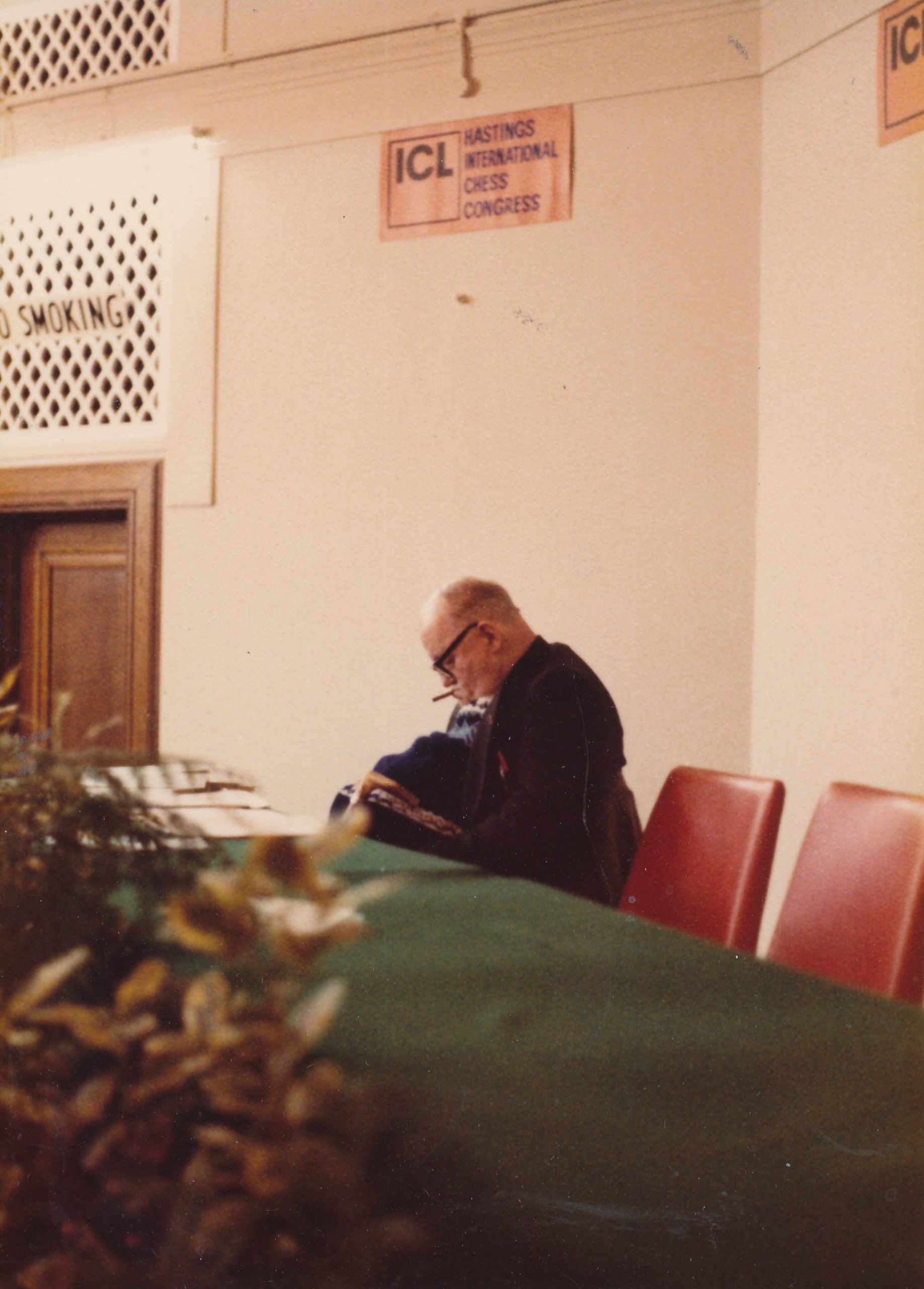
Ritson also did game commentaries for some years and produced a bulletin for at least three decades. He was greatly encouraging of younger talent and the objective historian has to recall the indignation he felt when players like Tony Miles and Nigel Short were not happy with the restraints imposed by financial stringency.
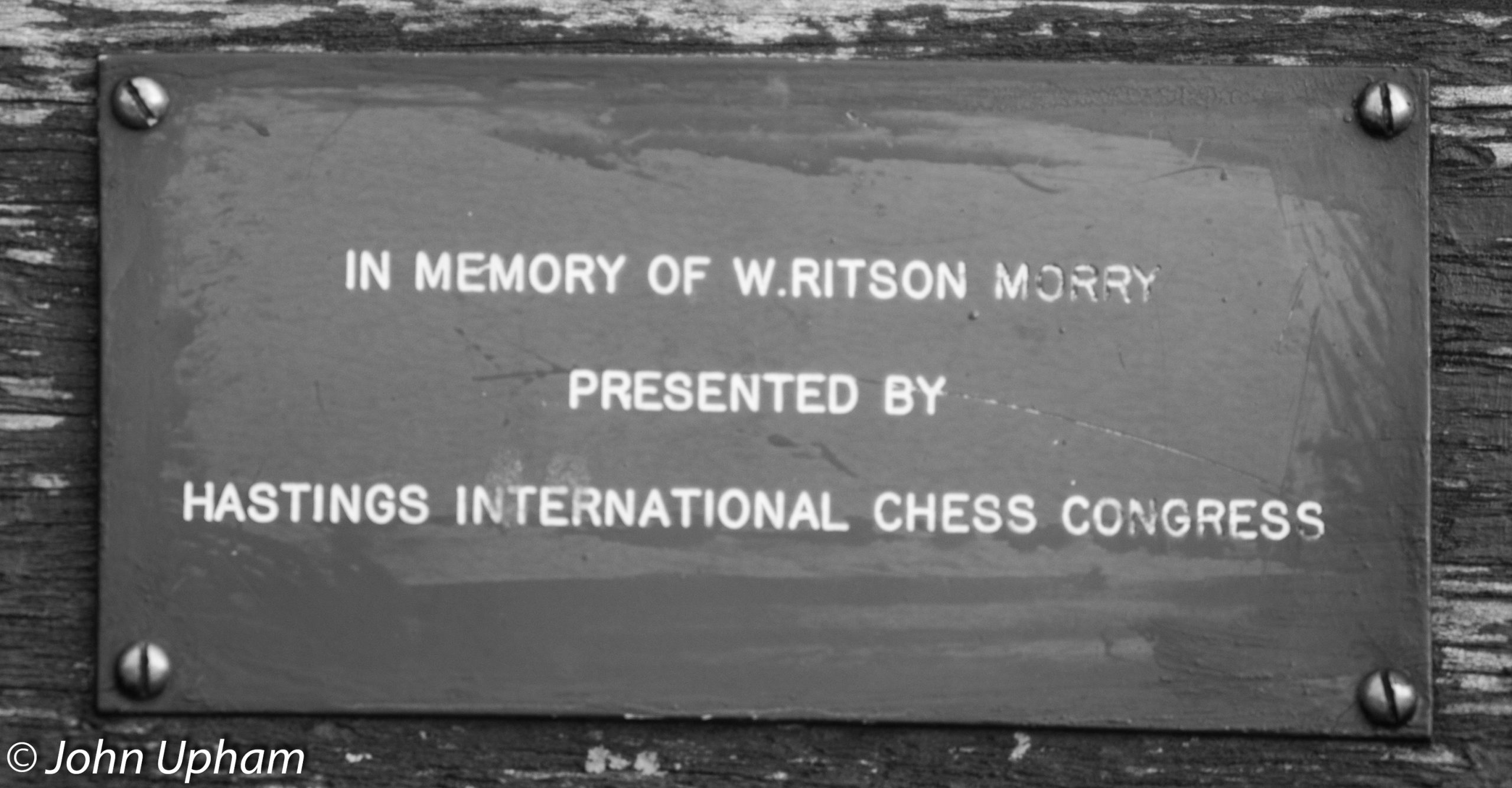
In his declining years Ritson was still a regular until his illness of late 1993, and a fixture at the “gate” where the public paid their entrance money at the Cinque Ports Hotel. The choice of word is deliberate as a visit to the dogs and the bookmaker was one of his rare pleasures outside chess. Best of all, however, one recalls him telling his fund of stories and reminisces to anyone who cared to listen. His voice, alas, has been stilled, and we are left to recall his selfless devotion to chess and, in particular, to the Hastings Congress.
Here is an obituary from the Midland Counties Chess Union
Here is an in-depth article from William Hartston in The Independent

Here is a biography from the Midland Counties Chess Union newsletter from 1994.
From The Encyclopaedia of Chess by Harry Golombek :
Midlands organiser and player who was a chess professional and journalist. As a player his best performances were an =2nd in the British Championship 1936 and an = 3rd in 1951.
In the international field his best results have been an =3rd with List in the Major Open A section of the Nottingham congress of 1936 and =1st with Milner-Barry in the Premier Reserves A at the Hastings congress 1946/7. He has played for England in international matches against the Netherlands (thrice) and against Czechoslovakia and Yugoslavia.

A keen and accomplished correspondence player, he had the title of British Postal Master on account of his winning the British Correspondence Championship in 1943.
But it is as tournament and congress organiser that he is best known. He founded the Birmingham Junior League in 1930 and has organised thirty-four Birmingham congresses. He conceived the idea of a junior world championship and in 1951 he held the first World Junior Championship tournament at Birmingham (won by Borislav Ivkov). In the same year he was awarded the title of FIDE judge. He has also had much to do with the organisation of the Hastings Christmas chess congresses in the 1970s.
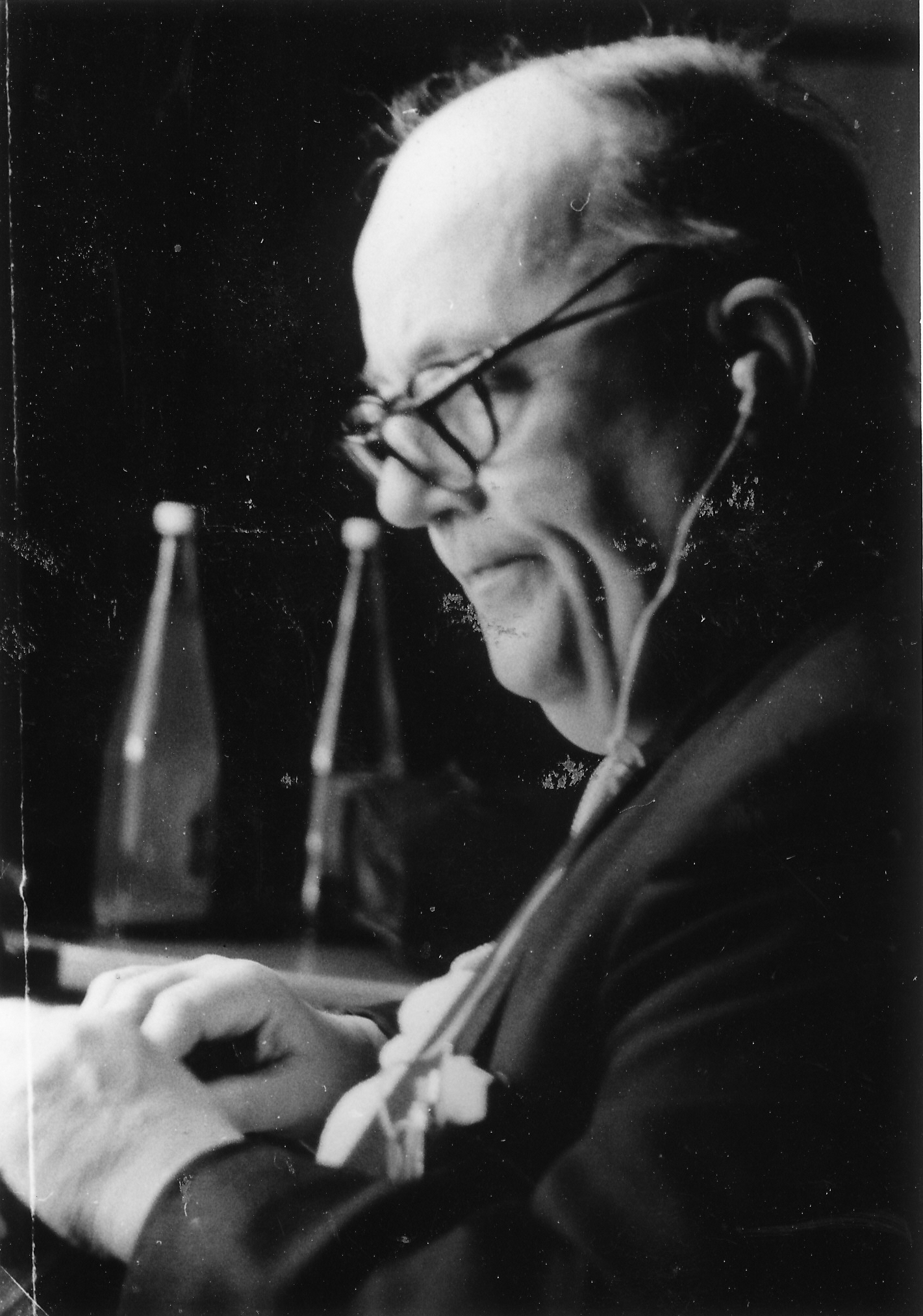
He has written much for British chess magazines and was the co-author along with the late W. R. Mitchell of Tackle Chess, London, 1967.
We send birthday wishes to IM George Steven Botterill born on this day (January 8th) in 1949.
Here is his Wikipedia page
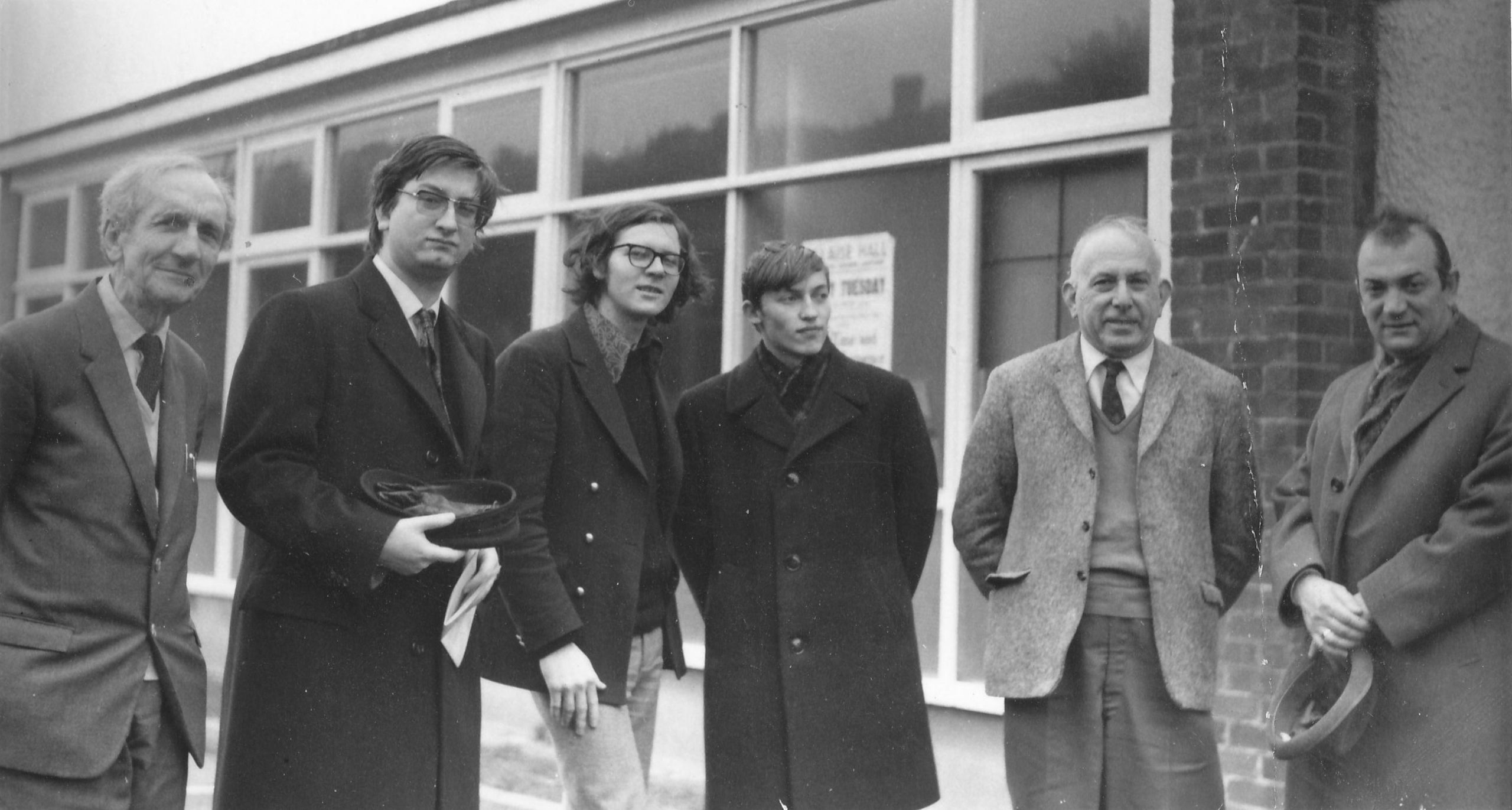
and here is his academic page
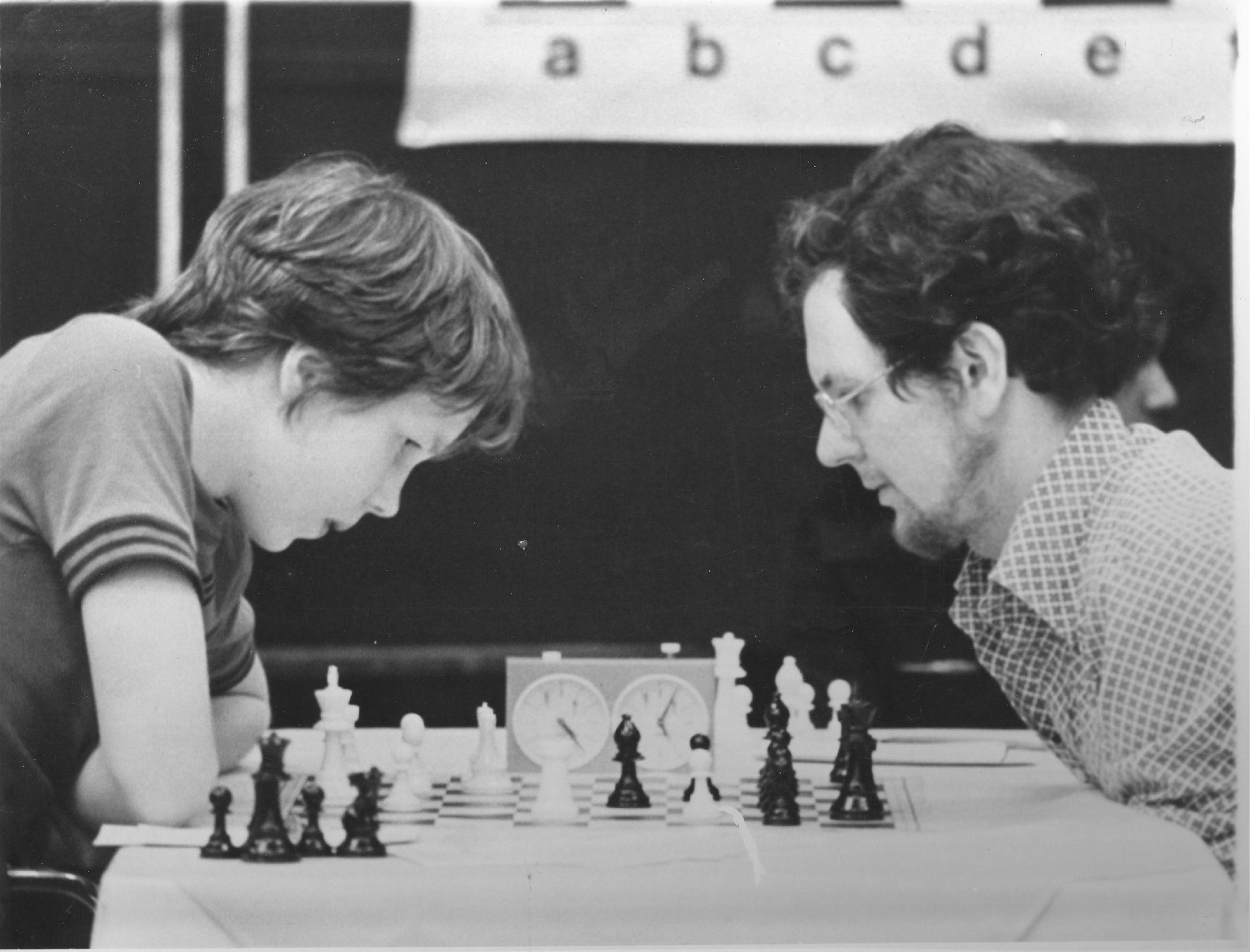
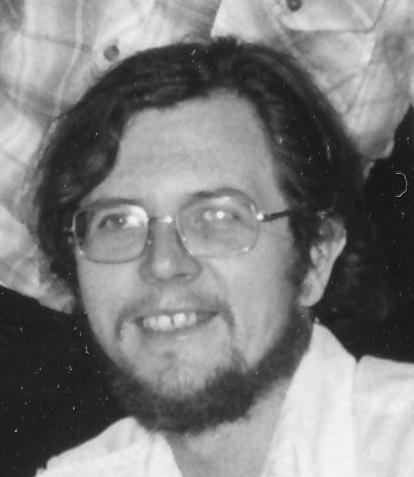
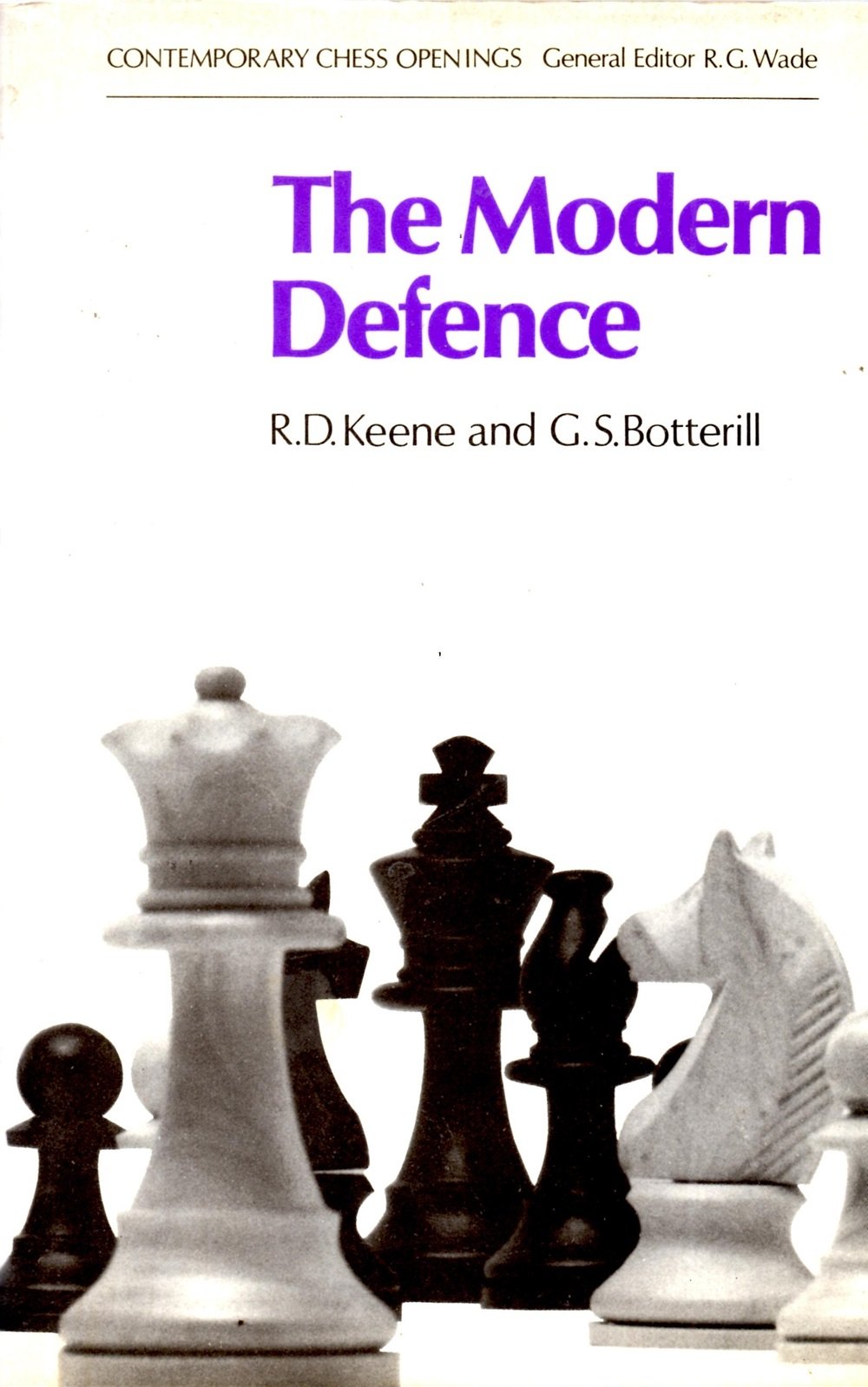
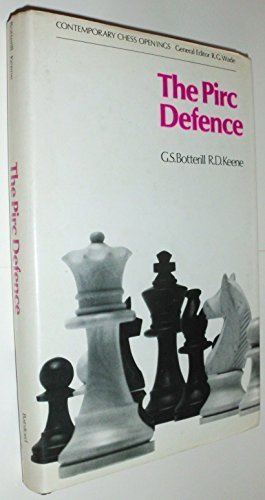
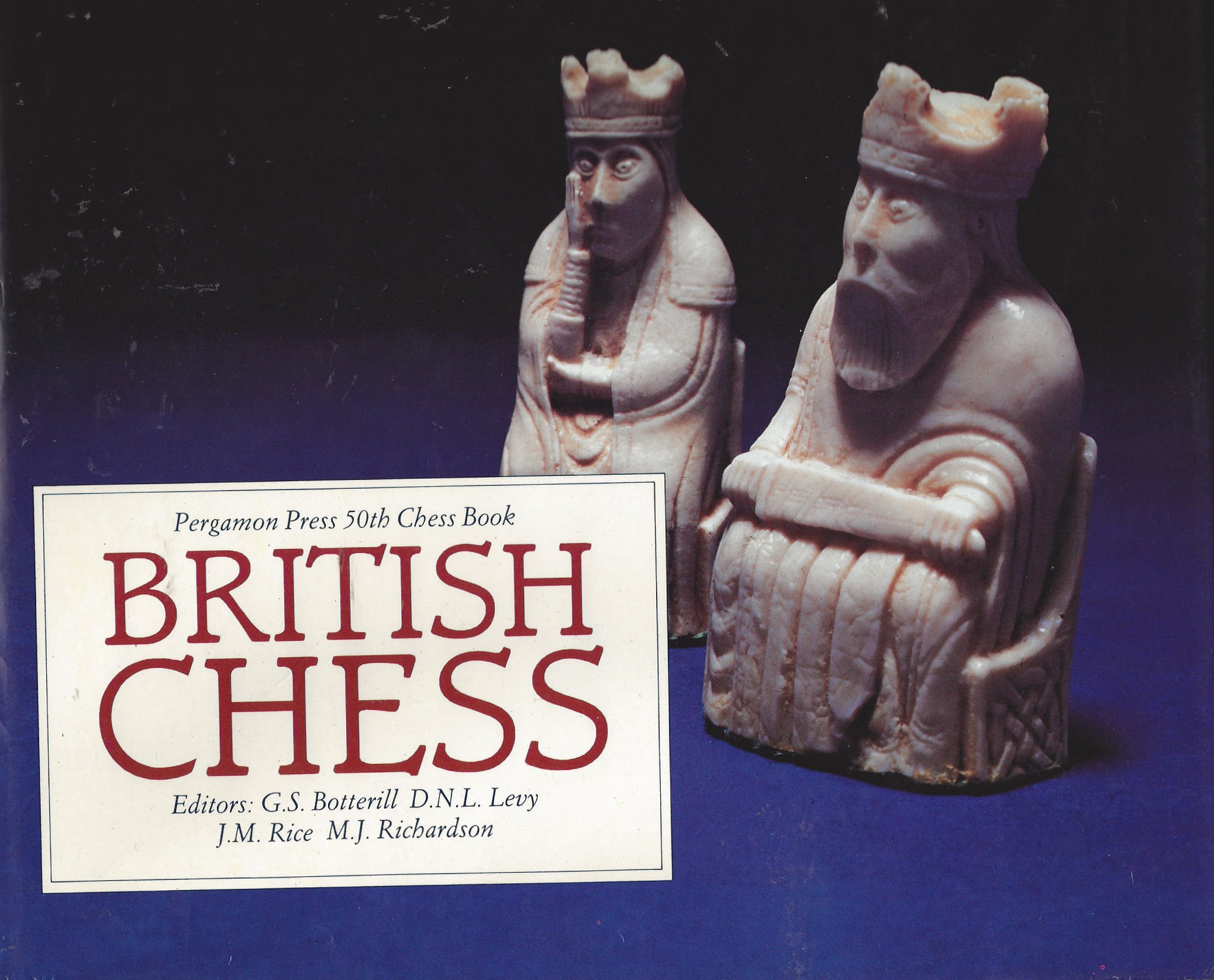
We send birthday wishes to GM Keith Arkell, born this day (January 8th) in 1961.
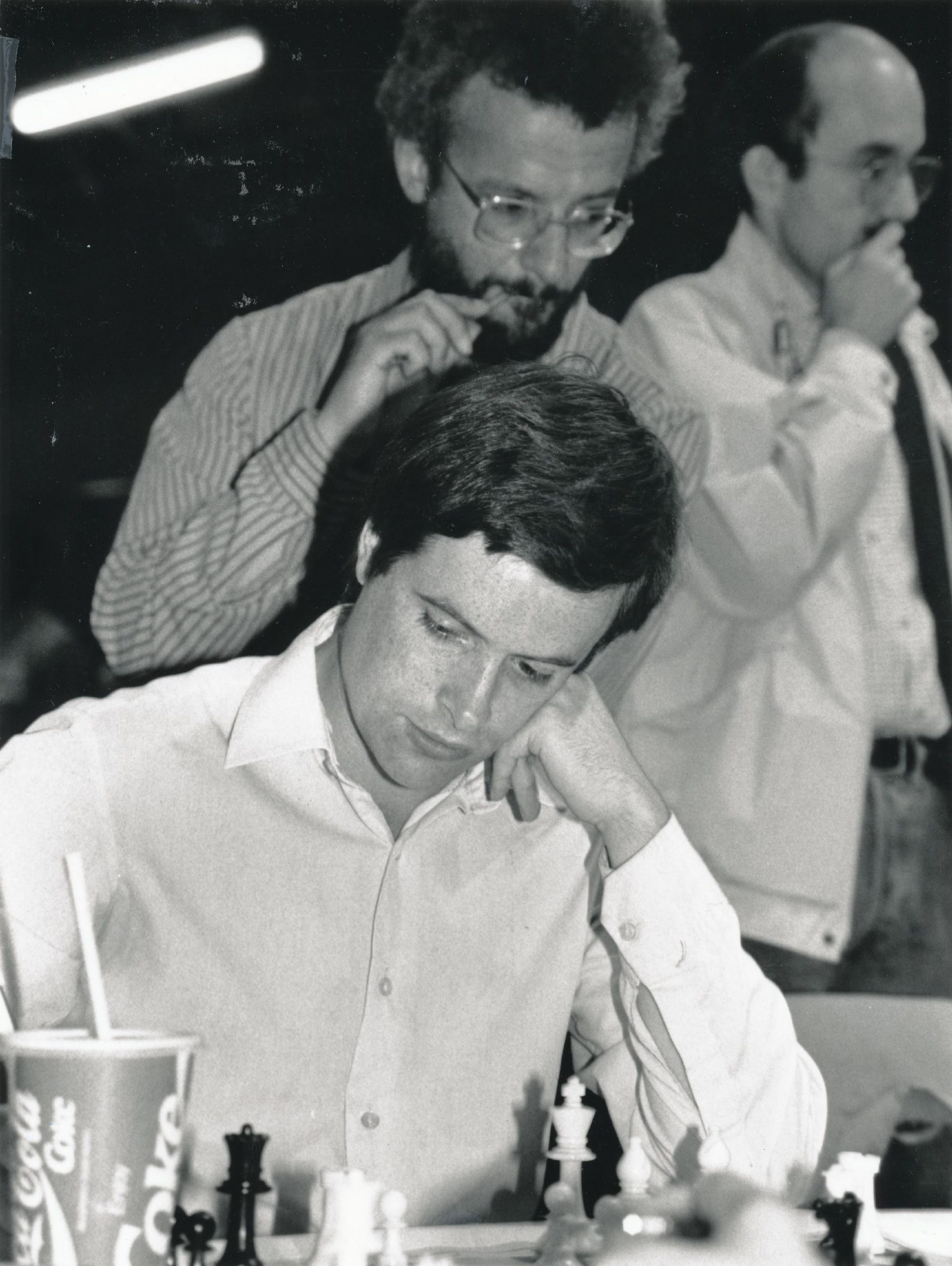
Here is Keith’s Wikipedia entry
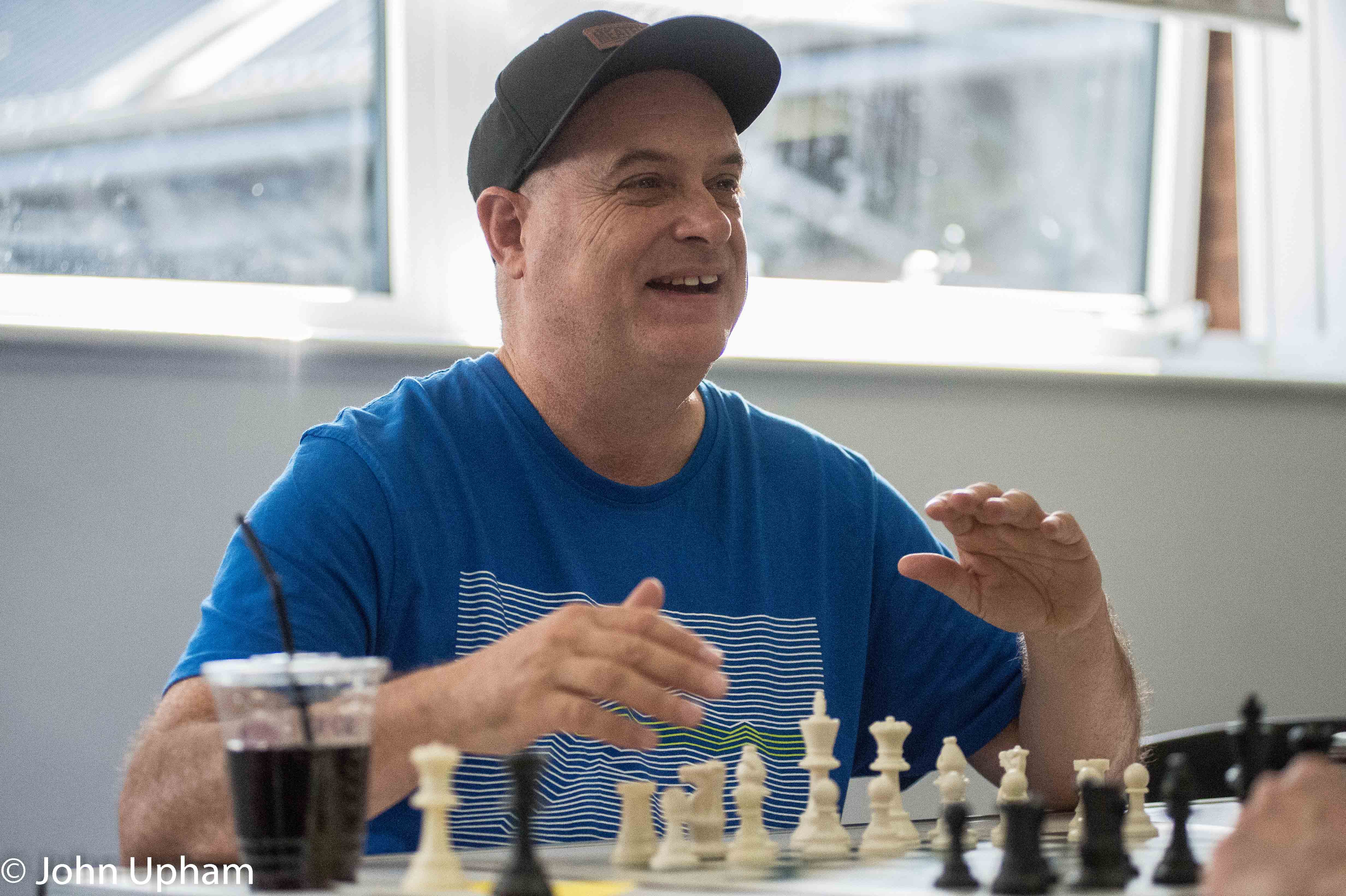
This was written about Keith aged 18 prior to the 1979 Spassky vs the BCF Junior Squad simultaneous display :
“Rednal, Birmingham. Rating 188. 2nd Lloyds Bank junior international, 1979.”
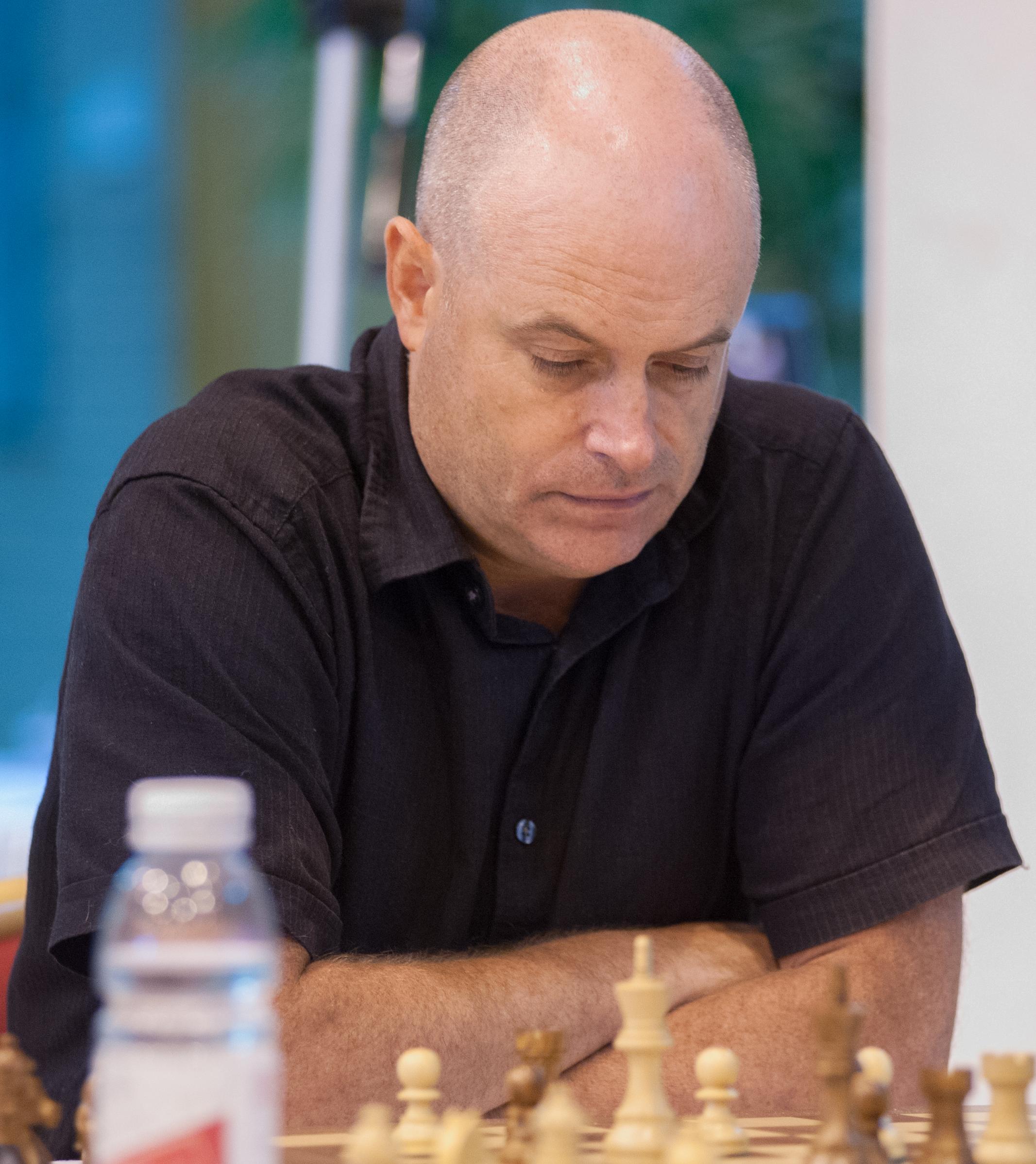
Keith was Southern Counties (SCCU) champion for the 2014-15 season sharing with Jonathan Hawkins
Keith finally secured the Grandmaster title in 1995 as a result of the final leg of the French League Championship. Keith gained the IM title in 1985 and then made his three norms at Ostend 1990, Parthenay in France in 1993, and in the French League finishing in March. He became England’s 26th holder of the GM title.
On August 8th 2021 Keith became the 2nd British Online Champion
Here is an interview with ChessBase from 2016.
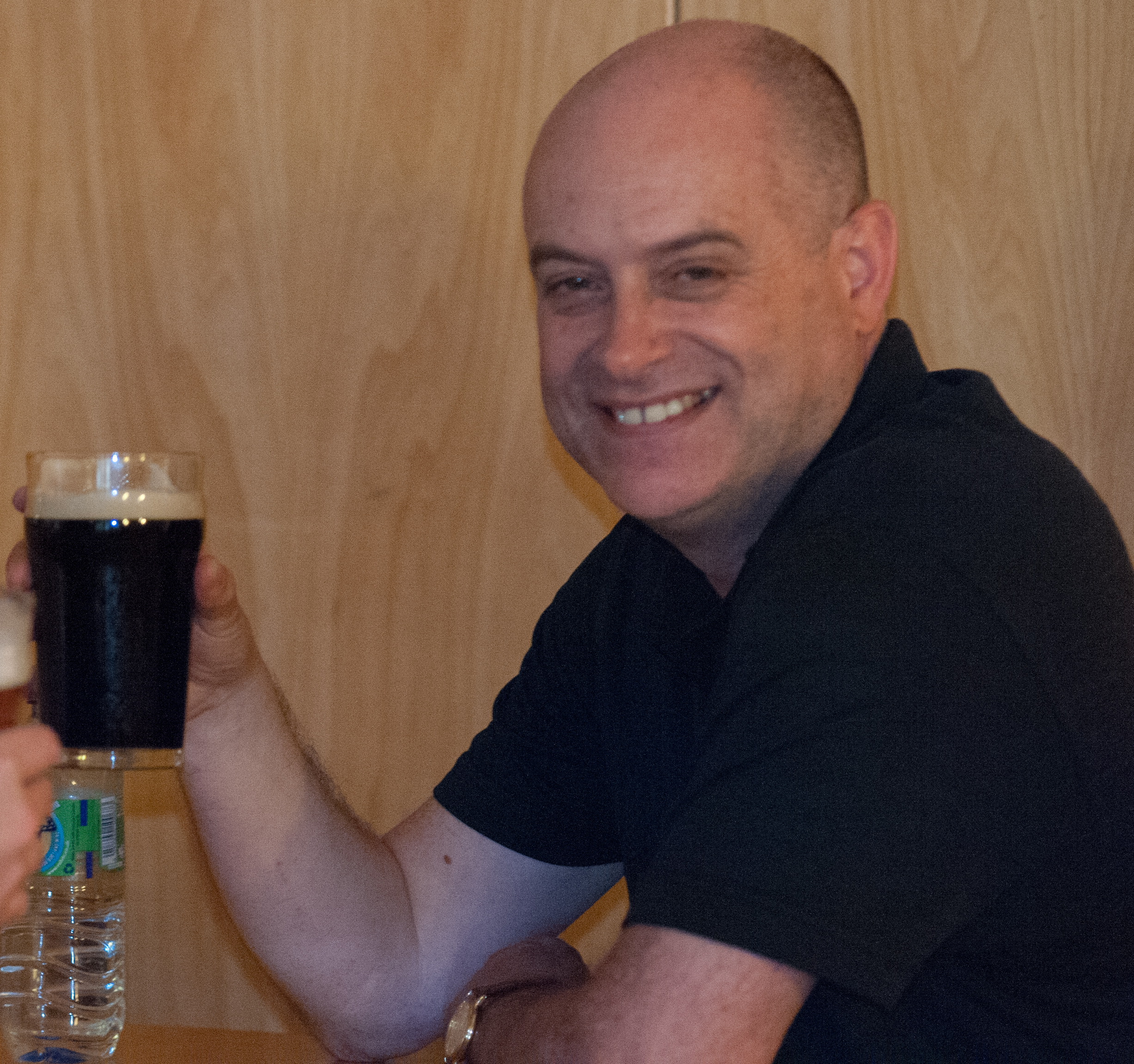
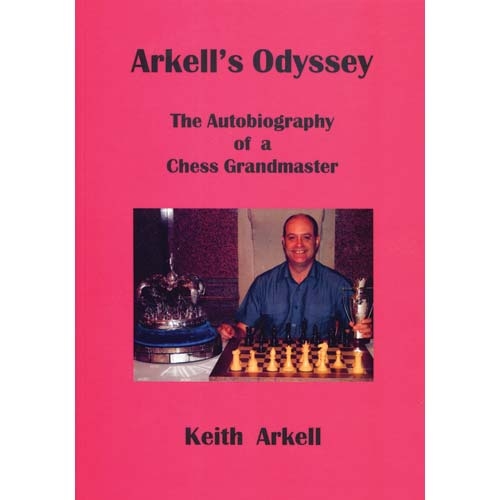
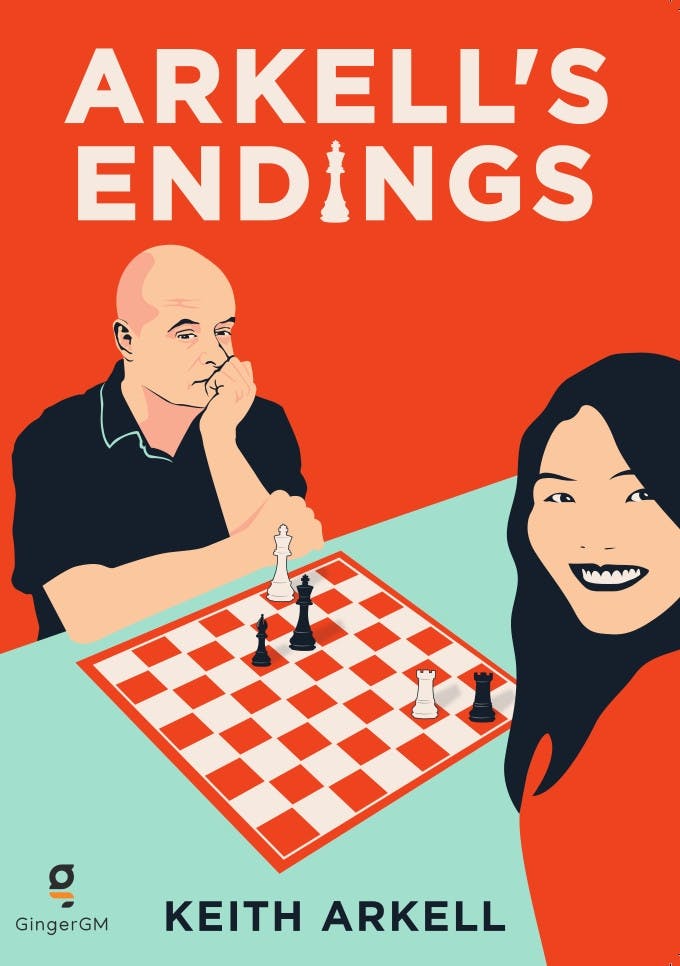
BCN has reviewed Arkell’s Endings in depth

We remember Harry Golombek OBE who passed away on Saturday, January 7th, 1995.
The Amersham Advertiser of Wednesday, 18th January 1995, on page 6, reported, “His funeral was due to be held as 12.30pm (today), at Chilterns Crematorium, Whielden Lane, Amersham.” (Thanks Steve Mann!).
Harry Golombek was born on Wednesday, March 1st, 1911 in Lambeth, London and his parents were Barnet (Berl) Golombek (Golabek) (1878-1943) and Emma Golombek (née Sendak) (1883-1967).
The Polish word Golabek translates to “small dove” in English.
Barnet was a “Dealer of gas fittings” and was 33 when Harry was born and Emma was 26. Both of his parents were born in Zambov which is in the Lomza Gubernia region of the Kingdom of Poland which existed from 1867 – 1917. Their nationalities are both recorded as Russian in the 1911 UK census. we don’t know (as yet) when Barnet and Emma settled in the UK.
Harry had a brother Abraham (born in 1906) and a sister Rosy born in 1908. The family lived in 200b, Railton Road, Herne Hill. Lambeth.
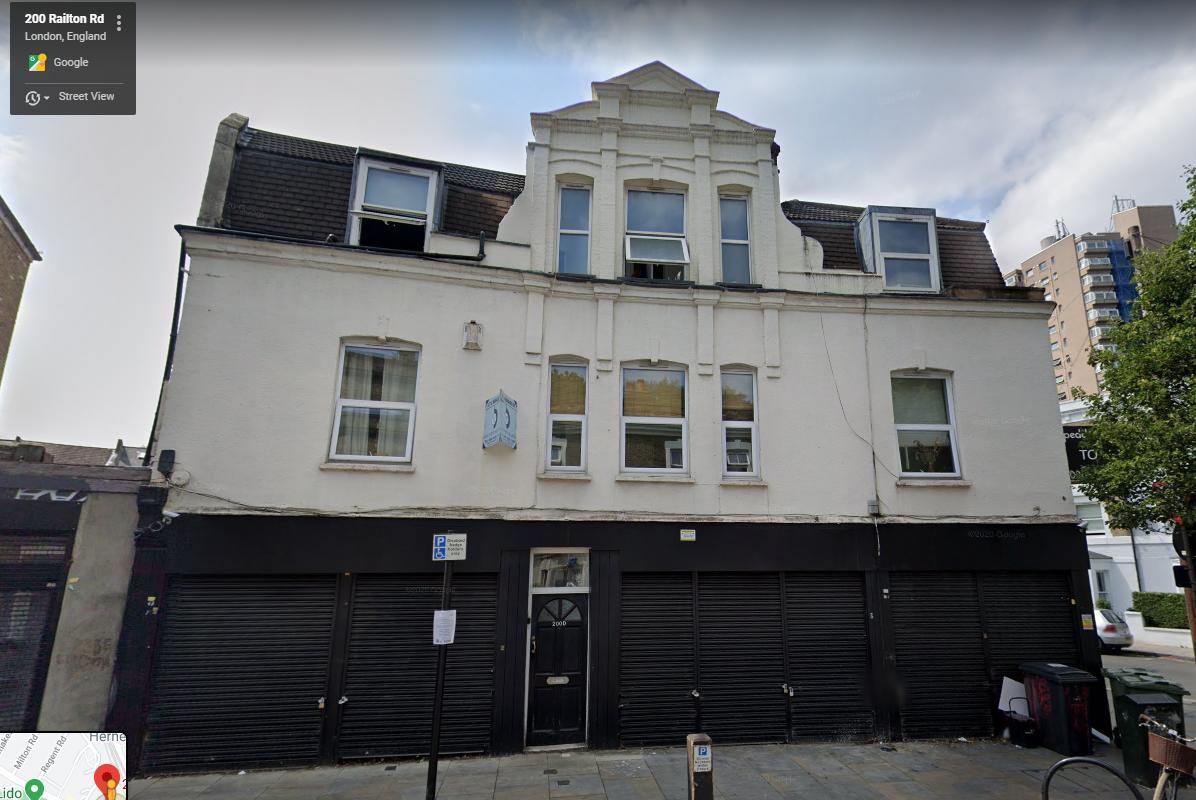
He is a recorded with a service number of 992915 as being a member of The Royal Regiment of Artillery in 1939 and was discharged as having reached the age limit in 1956 aged 45 and one day.

Harry married his long time nurse, Noel Frances Judkins (1941 – 2011) in January 1988 and they had (born in 1992) one son : Oliver Golombek-Judkins BVSc MRCVS who is a successful Somerset based veterinary surgeon. The marriage was recorded in the district of Kensington & Chelsea.
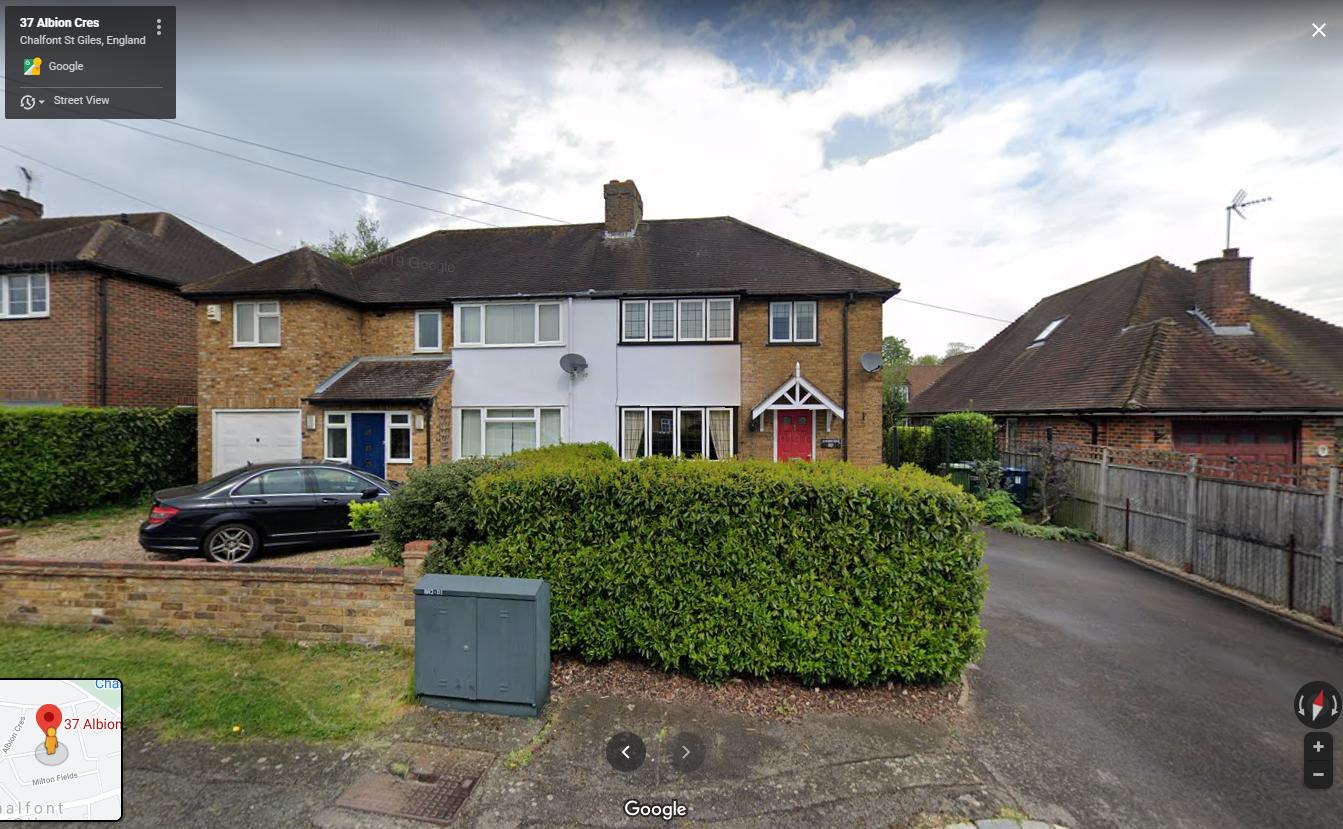
The date of probate was 22 Mar 1995 and the executor of HGs will was David Anderton OBE.
In 1966 Harry became an Officer of the Order of the British Empire (OBE), Civil division awarded in the 1966 Queen’s Birthday (rather than New Years) Honours list.
The citation read simply :
Harry Golombek. For services to Chess : He was the first UK person to be so honoured.
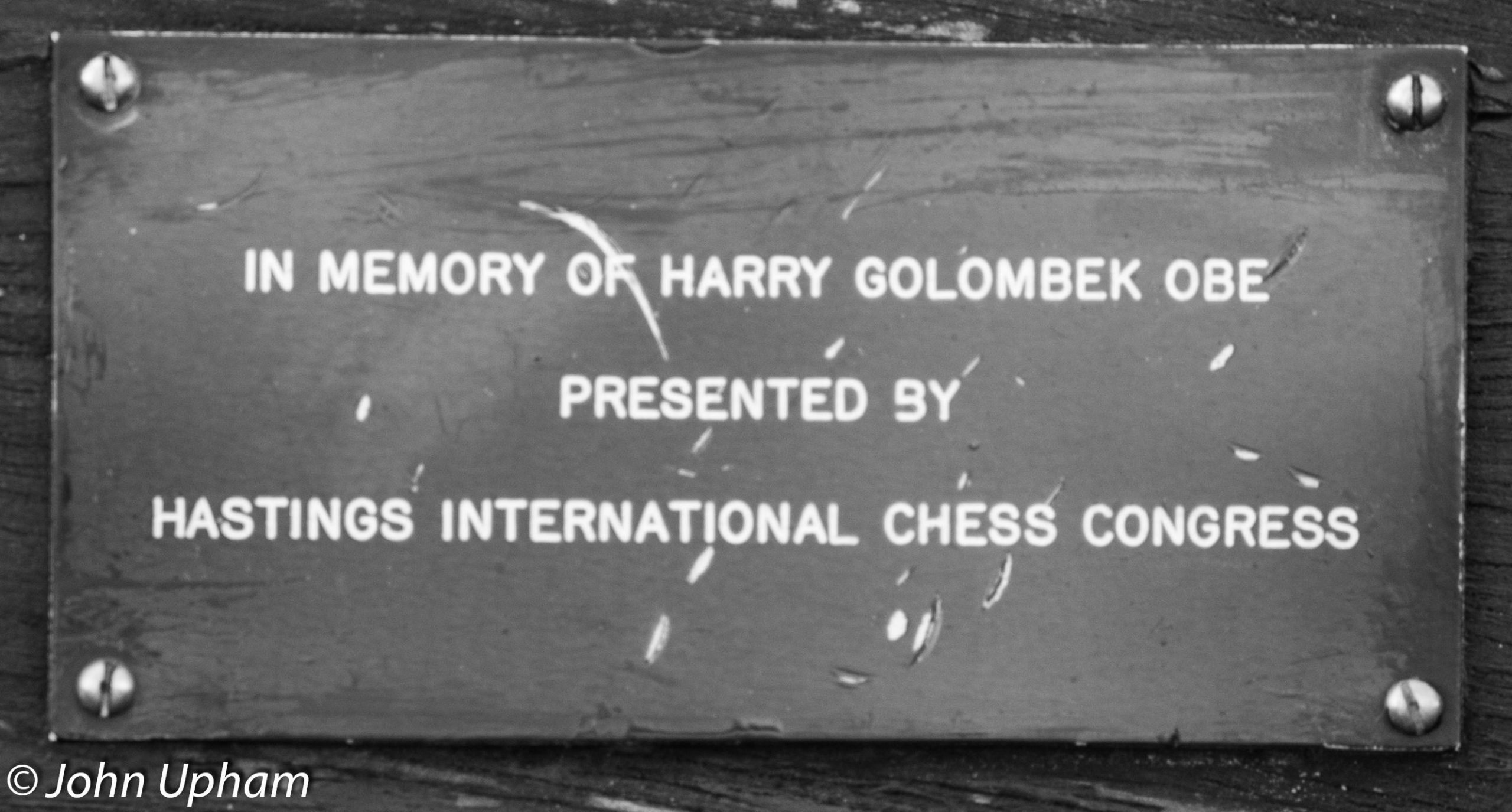

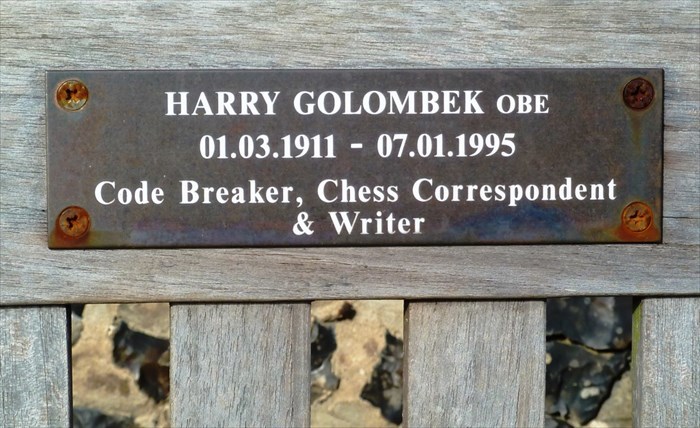
Harry was Southern Counties (SCCU) Champion in the 1955-56 and 1963-64 seasons.
Harry was in 1974-82 a FIDE Zonal President and from 1978-96 he was the FIDE Permanent Fund Administrator.
Sadly, he never received the Presidents Award for Services to Chess from either the BCF or ECF : maybe a posthumous award is long overdue?
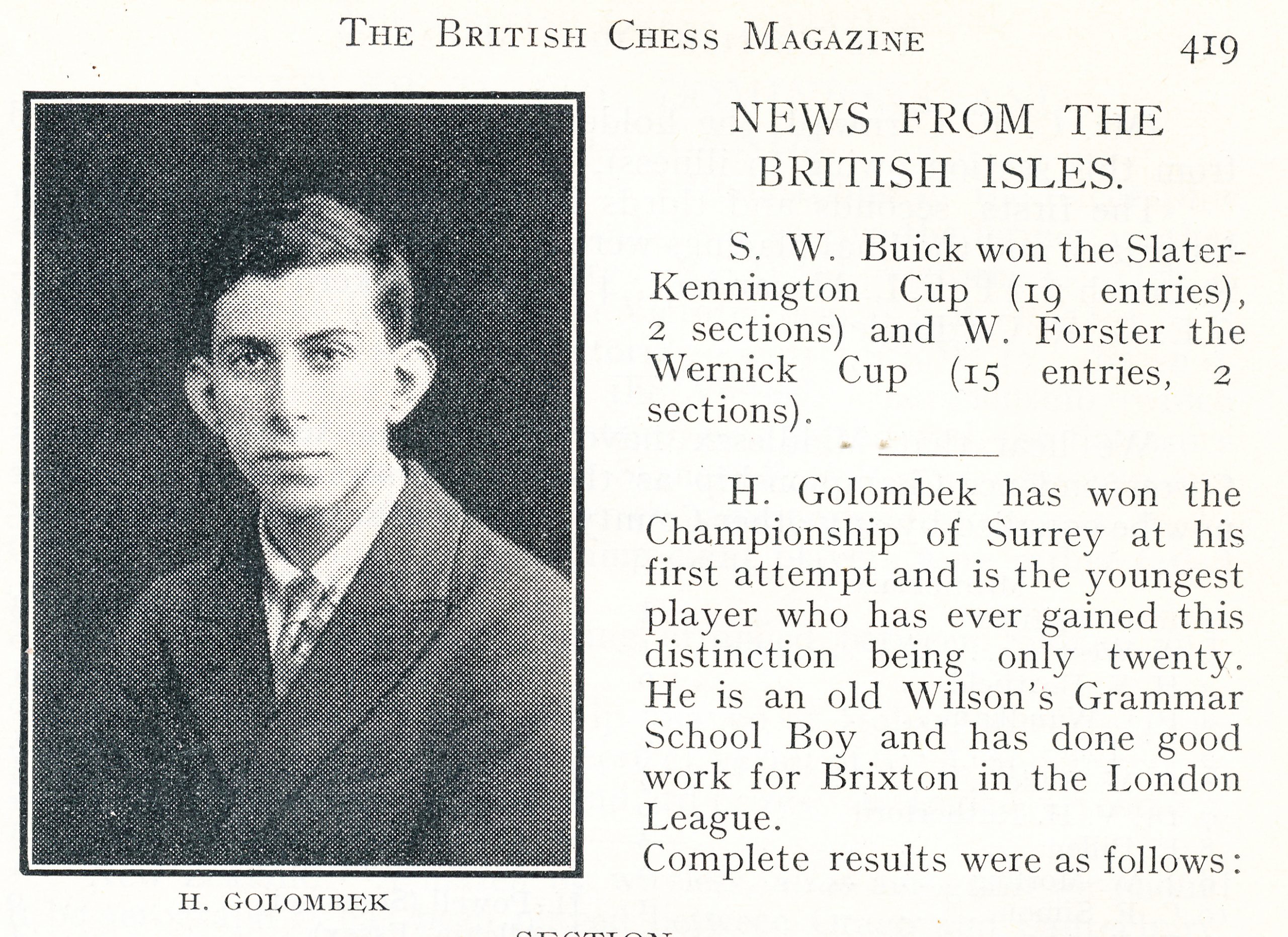
Here (from British Chess Magazine, Volume CXV (115), 1995, Number 2 (February), pp.83-85 is this obituary from Bernard Cafferty :
Harry Golombek OBE (1 iii 1911-7 i 1995), British Champion in 1947, 1949 and 1955, was a grandmaster amongst journalists and book writers, and “Mr Chess” for many of the British public in the decades after the war when his Times column was the main source of up-to-date information on the doings of Botvinnik, Bronstein, Smyslov, Keres, Tal and the other top players.
Harry ran a weekly Saturday column along with daily reports during World Championships, British Championships, Hastings, Paignton …when only The Guardian provided a similar service to the chess community up to 1972. I often recall him grumbling at editorial incisions of his column, which, even so, was more extensive and ‘heavy’ than anything we enjoy now. He loved references to music, the theatre and the arts as a parallel to chess. In fact, he was columnist and correspondent with the paper from 1945 till 1985, and columnist of the Observer 1955-1979. His work at The Times came to an end after he suffered a mild stroke, though he struggled on for a time when, in pre-Wapping days, his work was handicapped by ever earlier deadlines.
Harry was the BCF delegate to FIDE for decades after 1948 and played a part in framing the rules. His view was that the Soviet Union, which he visited as arbiter for Botvinnik’s matches in the 1950s and 1960s as well as for the second part of the 1948 World Championship Match-Tournament, did not throw its weight about so much until after 1970 when a sort of cultural offensive in FIDE and elsewhere was undertaken.
Harry played for England at three Olympiads before the war and six after. Educated at a London grammar school, he was the son of immigrant Polish parents who had been repressed by the last Tsar, to whom his father once sent a message of defiance from the safety of England. A favourite reference of his was the London Boys’ Championship of the late 1920s where he first came to prominence.
His first experience of chess journalism came in the period 1938-40 when he was editor of BCM, till being called to army service. Harry worked in the code-breaking department at Bletchley Park during the war; the Official Secrets Act prohibited him from revealing much of what he knew of this fantastic scientific operation where he was associated with such famous names as Alan Turing, Jack Good, Hugh Alexander and Stuart Milner-Barry. A graduate of London University in Modern Languages, Harry had been called up into the Royal Artillery, but his knowledge of languages, particularly German, meant that he was soon transferred to the Intelligence Corps.
Harry was a life-long supporter of Surrey Cricket Club. His family ran a grocery shop near Kennington Oval which he sold after 1945 when he made the decision to become a chess professional’ He was reputed to have one of the finest chess libraries in Britain, which he has left to the BCF to form the nucleus of a national chess library with bequests from Sir Richard Clarke, RJ Broadbent and GH Diggle.
Amongst the many books he wrote, pride of place must be taken by his work on Capablanca’s best games and the one on the 1948 Match-Tournament at the Hague and Moscow as well as a later book on Reti. Who can forget his account of the delay at the Polish border for the train which was taking players and journalists to Moscow from the Hague in 1948? A Polish general, forgetful of recent history, declared that the train could riot proceed since no-one crossed the Polish frontier without the appropriate documentation and security checks (Euwe’s extensive analytical notebooks in Dutch were the stumbling block). It only needed Botvinnik to hear this for him to phone up Moscow and have the Polish authorities overruled by those who enjoyed real power in the post-war world.
Another famous article which comes to mind is Harry’s long account of the 1967 Sousse Interzonal, complete with the J’adoubovich incident, Fischer’s fickleness, and the camel on the beach. This appeared in the BCM, of course, where H. G. was the editor for Overseas News and the Games Department from the late 1940’s until the late ‘sixties. His work here was a cut above most contemporary chess journalism’ since he was so often on the spot at top events and he had access to all of the world’s chess press. As a consequence, he was often the contact man for arranging participation of the world’s leading players at Hastings. From this flowed his work for The Friends of Chess, the body that raised funds and helped gain invitations to foreign events for our up and comings. It was in 1966 that he gained the OBE for services to chess.
Harry had a dry acerbic wit and a fund of stories that made him a welcome after-dinner speaker and lecturer. He seemed to be a life long bachelor, but he married late in life (this corrects an error in the Times obituary of 9 January. In his declining years he spent his last days in a rest home for the elderly in Gerrards Cross where his main contact with the outside world was Gerry Walsh who had often driven him to and from the Hastings Congress in the last couple of decades of his life.
Harry Golombek, was, without a doubt, one of the finest chess writers ever, and his lengthy stint as Overseas News editor of the BCM results in some classic reports.
As a tribute to Harry’s work we (BCM) have decided to reprint word for word, his extraordinary account of the 1967 Sousse Interzonal. The article that follows is an exact reproduction of his eyewitness report, as it appears in the 1968 BCM Bound Volume, January magazine. This was the tournament that had everything: Bolbochan vanishing, Fischer withdrawing, Larsen winning, and much more.
We are sure that our current readers, young and old, will be as enchanted with the tale as BCM readers were nearly three decades ago.
Here (from British Chess Magazine, Volume CXXXII (132), 2011, Number 3 (March), pp.150-154 is an affectionate collection of memories from Bernard Cafferty :
“In recalling four decades of knowing the GOM of 20th century English chess, one has to stress the ‘English’ aspect. The ‘Harry’ part of his name was much more significant than the Polish surname, and, though he was the most cosmopolitan of men, who fitted into any milieu, my abiding memory of him always throws up the quirks that are the sign of an Englishman. I wonder how many of my readers recall the classic English actors Naunton Wayne and Basil Radford, whose main preoccupation in their films was…. getting to know the latest cricket score from Lords or The Oval.

Indeed, Harry was a long-time member of Surrey Cricket Club, and once, when he came back from being an arbiter at an international tournament in Tenerife, his main comment to me was not about the event or the players, but rather that the volcanic rock of the Atlantic island made for brackish water, so that one could not get…. a decent cup of tea!
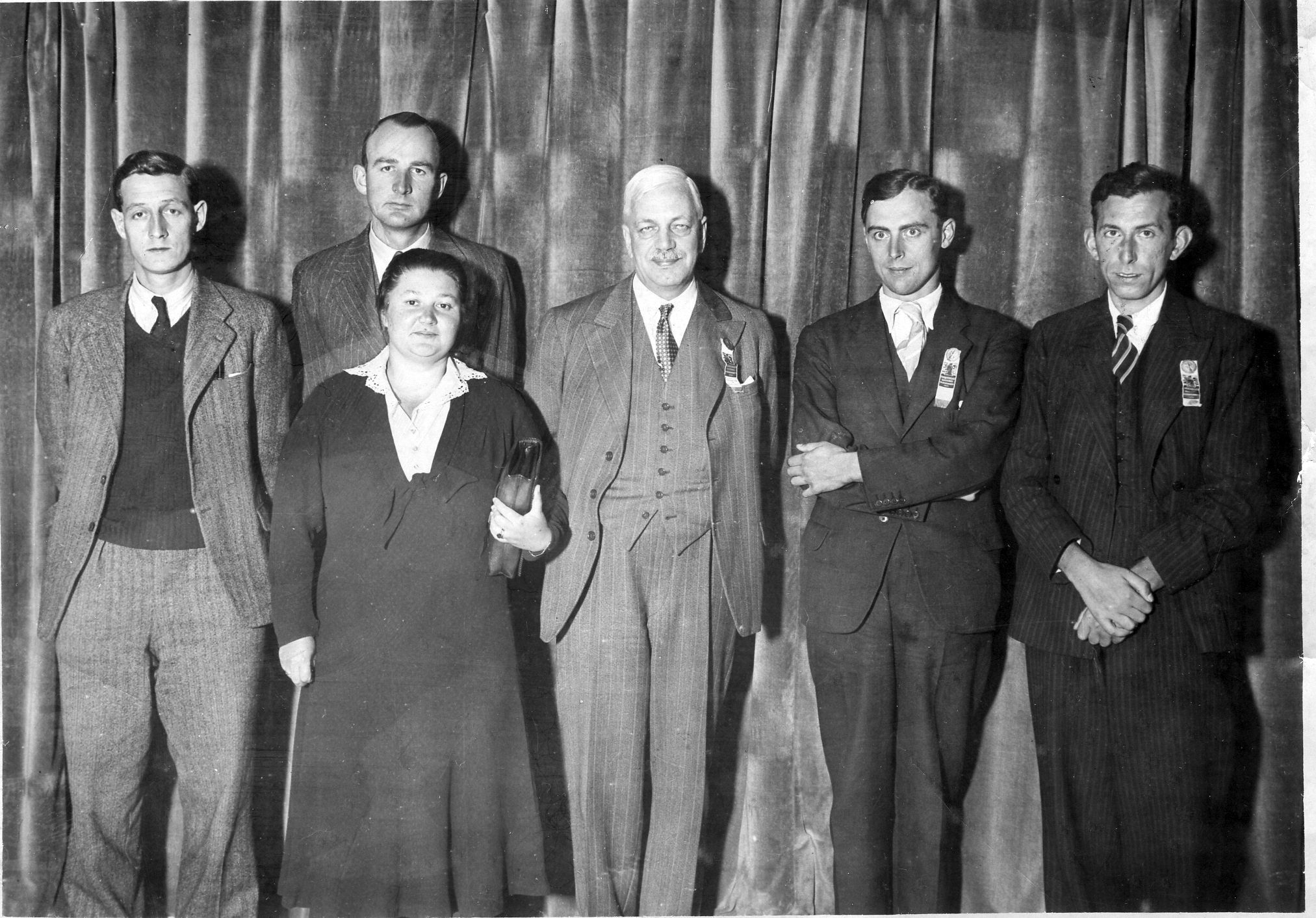
I first met Harry in the early 1950s when I was a teenage student keen on chess and accordingly spent my meagre pocket money on a day out in Manchester to watch the Counties Final match between Lancashire and the all-conquering Middlesex side of those years. Harry and I were about the only spectators. He was there reporting for The Times. I recall that the top board game was between the veterans William Winter and WA Fairhurst. The game duly appeared in the BCM with Harry’s notes, for he was the long-serving Games Editor of that august publication.
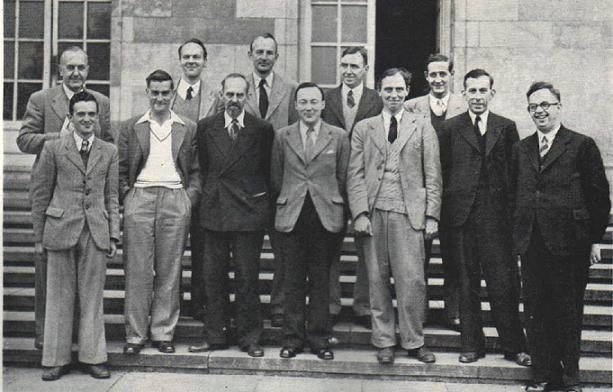
Perhaps I may enter a belated correction to “Who’s Who” here. Some editions stated that he was editor of BCM after the Second World War. Not so. His stint in the editorial chair was 1938-40, after which he was called up, initially being assigned to the Royal Artillery. Perhaps that is a sign of the speciality of the Services – fitting a square peg in a round hole – but he was swiftly transferred to the Intelligence Corps, perhaps at the behest of Hugh Alexander who knew that Harry had studied German at his London grammar school in Camberwell and then at London University.
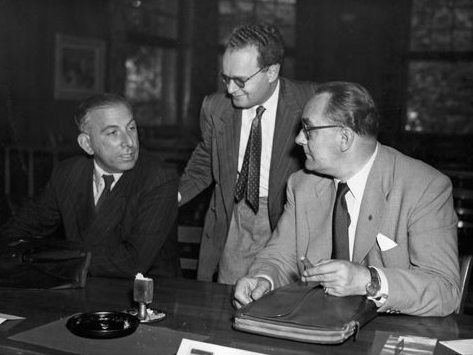
Clearly, under the conditions of 1940, a linguist was just what was needed to make up the team of mathematicians, cryptographers and such like who were tasked with breaking the secrecy of German coded messages.
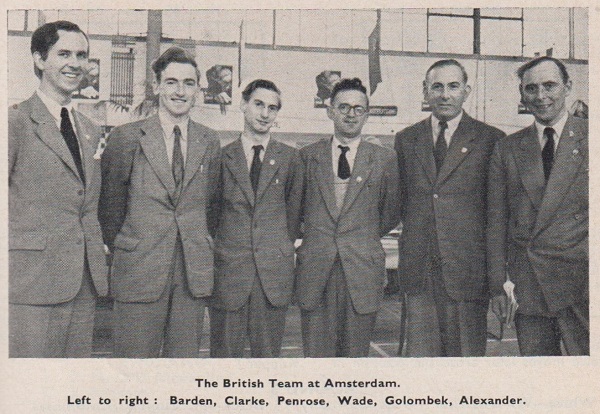
I once mentioned the misunderstanding over the “Who’s Who” entry to Brian Reilly. He laughed it off, saying that it was almost certainly the abiding fault of HG – not taking Brian’s repeated advice to fit a new typewriter ribbon!
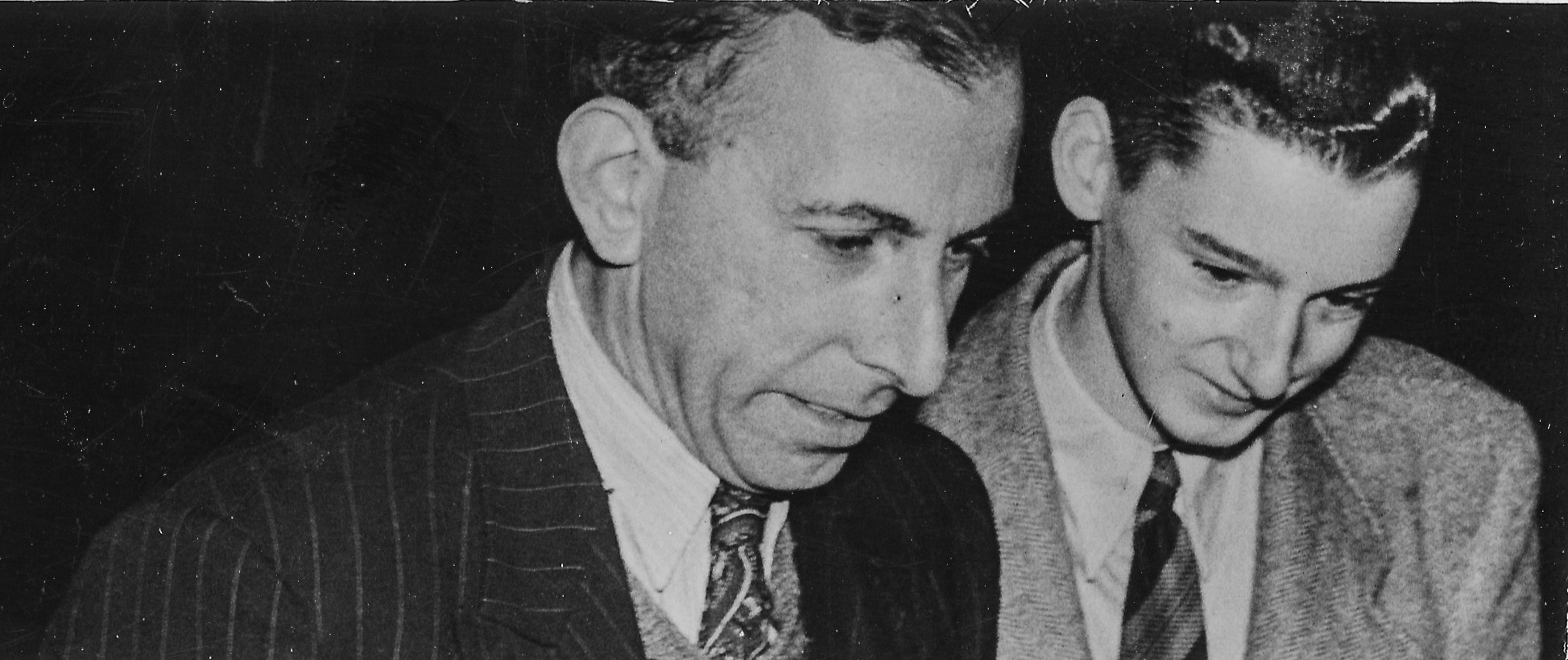
I could relate to that since Harry’s handwritten game scores, written in pencil and descriptive notation, were very hard to decipher, a real scribble that only the man himself could make sense of. When I asked him why he did not use algebraic notation, he commented that he wrote for so many English-language outlets: The Times, The Times Weekend Supplement, Observer and chess book publishers like Bells and Penguin who knew their audiences of those years were supporters of the Pawn to King’s Knight Three school. In fact, Harry commented, he had made more money out of his Penguin book The Game of Chess than from all his other extensive book authorship and journalism.
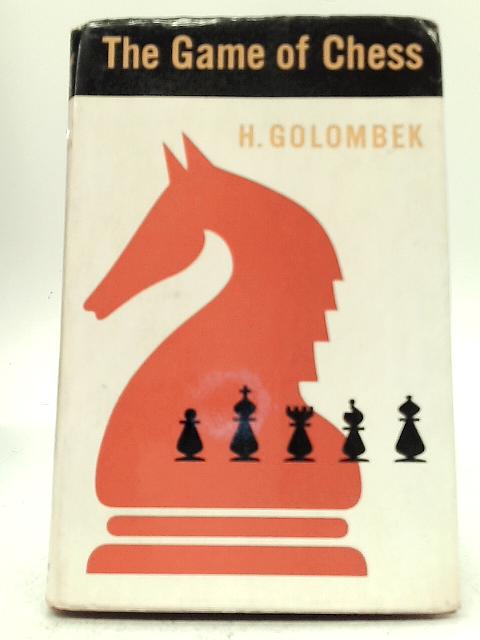
and the paperback version :
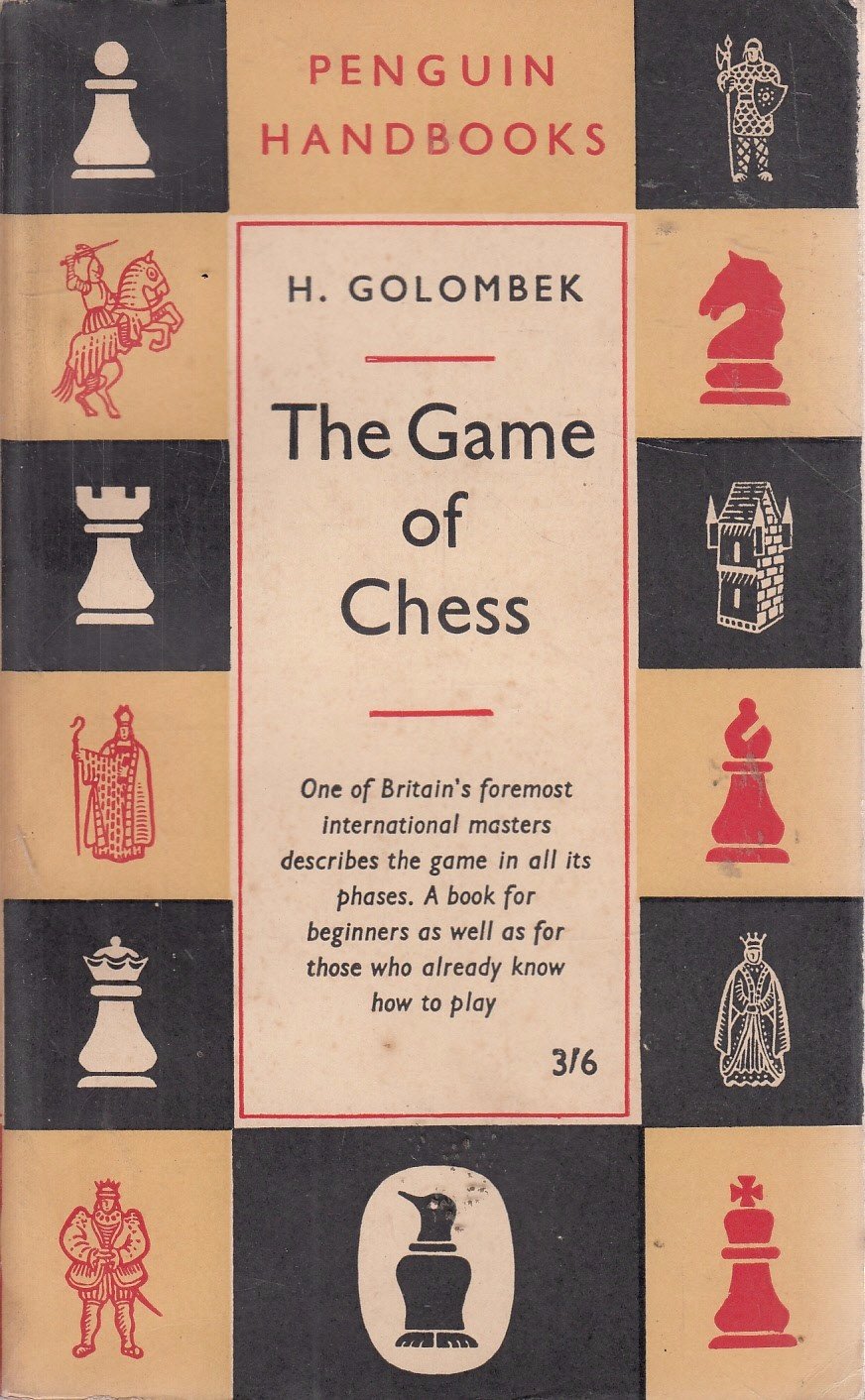
Moreover, it took him about three whole days to assemble the documents and papers to enable him to fill in his income tax form.
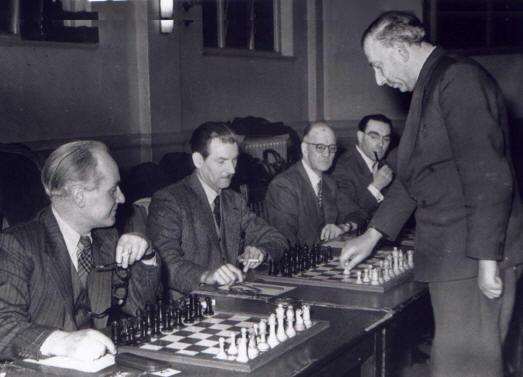
That reminds me that, when he was in his final years, and in an old person’s rest home, he arranged for his extensive library to be transferred in many large tea chests from his house in Chalfont St Giles, Bucks, to the St Leonards address where I had worked for the BCM for the last 12 years and which had recently been vacated as a result of Murray Chandler deciding to transfer BCM operations to London. I had the task, arranged with The Friends of Chess and the BCF, to do a sort-out and preliminary catalogue of his books and magazines which Harry was bequeathing to the BCF to form the nucleus of a National Chess Library. That would be a pleasant enough task, but it was prolonged into many weeks by having to decant the valuable chess material from the tea chests, much of it covered in dust and even spiders’ webs, from the many financial and other papers to do with his financial affairs. It was then that I first learned what a ‘tip sheet’ was, and it was not until stockbroker David Jarrett, BCF Hon Treasurer, came down for a visit that the dross amongst the many papers was separated from the gold and passed to Harry’s executor David Anderton.
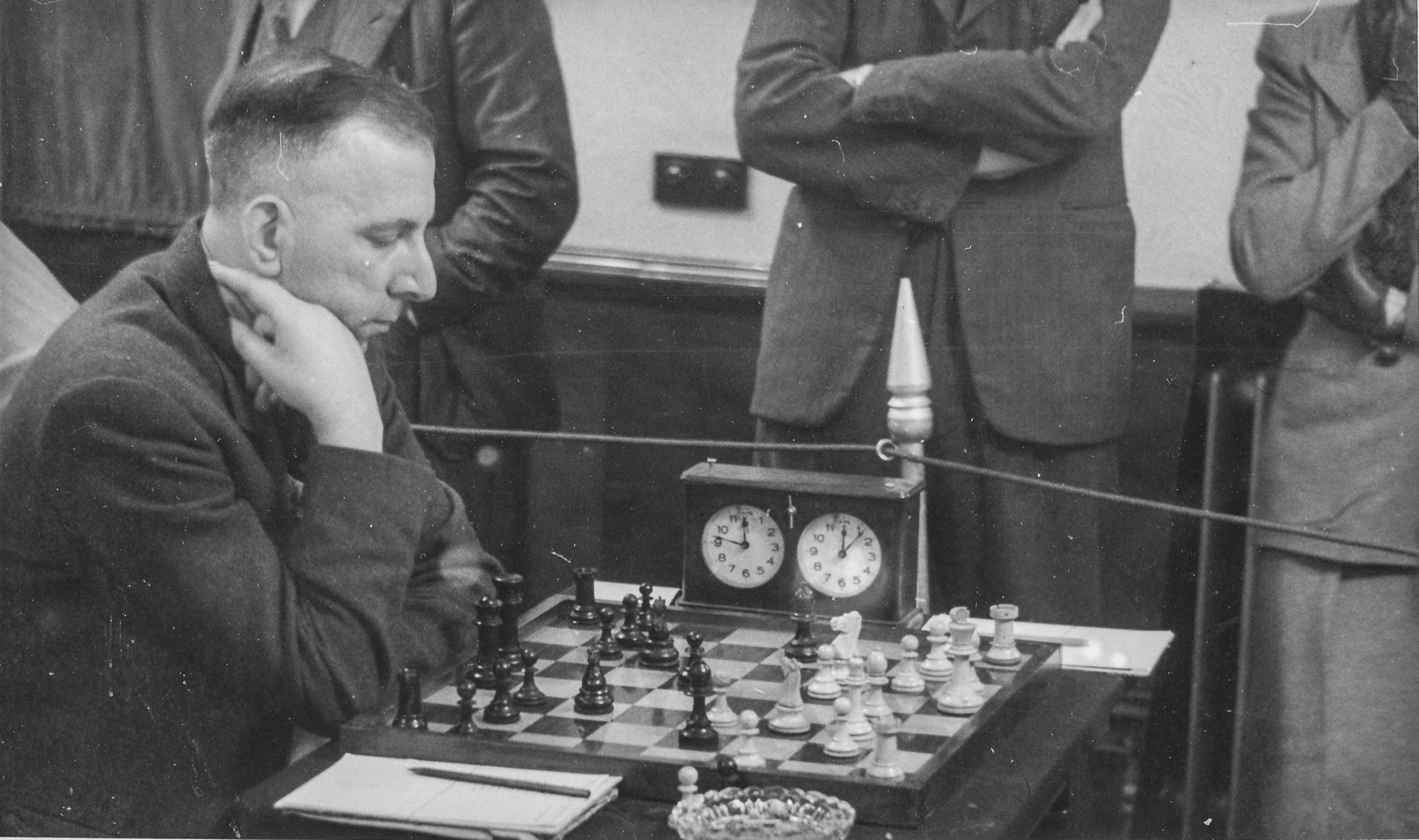
Reverting to the cup of tea story, the first time I got to know Harry well was at the British Championship at Leicester in 1960. Many of the participants were lodged in University accommodation near the venue. Every evening, after play had finished, a number of us got together for a chat over a cup of tea in the accommodation unit’s kitchen. There Harry would regale us with stories from his many visits abroad, particularly to Moscow for the world title matches involving Botvinnik. Harry had formed many interesting views on Soviet society. Amongst the stories he told was of the all-pervasive dead hand of the bureaucracy. He was used to filing his reports on the match in English at the Central Post Office. One day, a clerk behind the grille, told him he could not accept it, since the regulations stated that all outgoing material had to be in Russian.
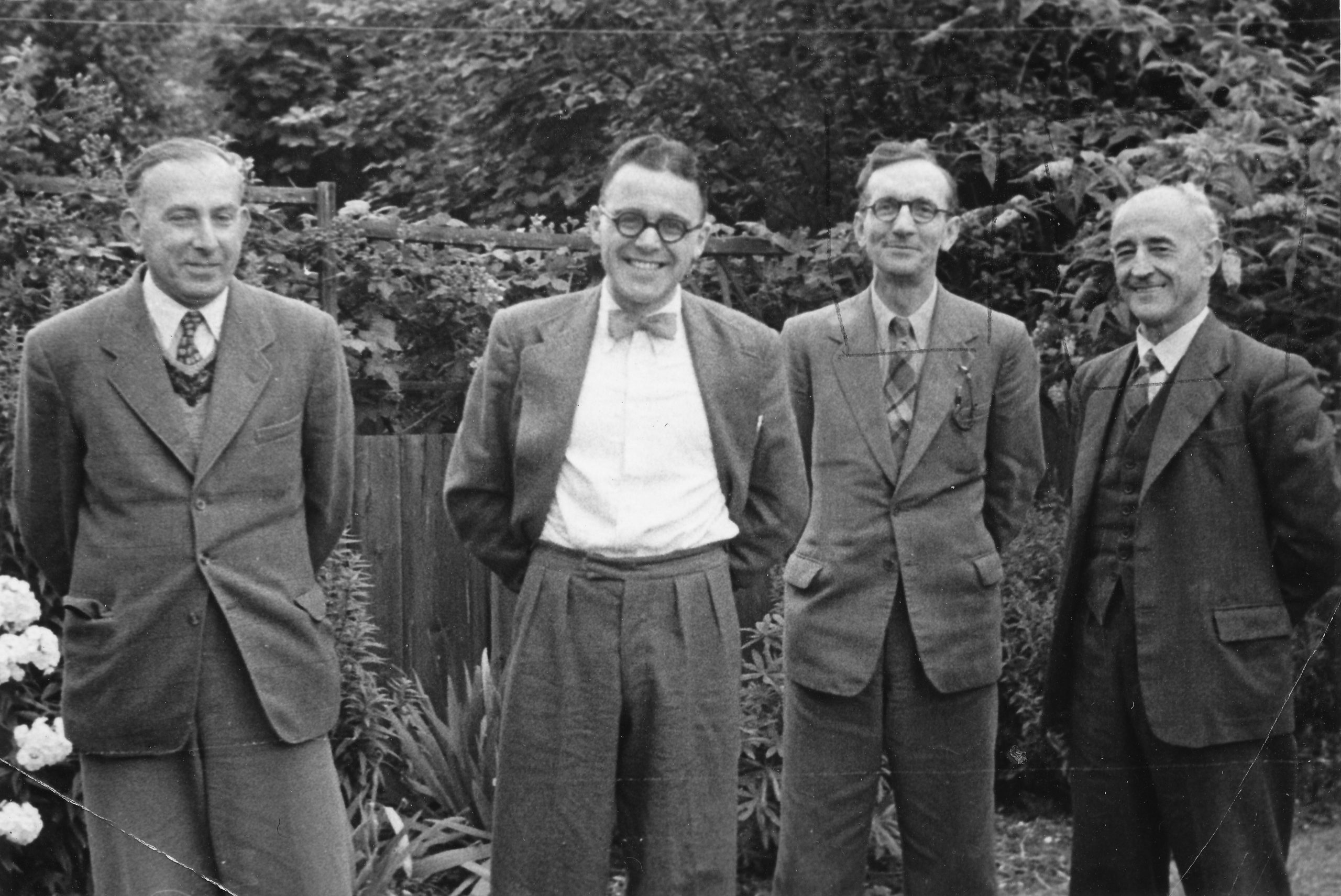
With his logical mind, and not appreciating the discipline and associated bureaucracy which the rulers tried to impose on Soviet society, Harry commented that “Yesterday, I submitted in English and it was accepted”, at which the clerk drew herself up to her full height and stated firmly: “Yesterday was yesterday, today is today”. Harry’s considered views included these: Communism would never be made to work properly in Russia, since the Russians lack the requisite discipline. “They should have tried it on the Germans. They might have made it work”. He once commented that when he went to Germany in the decade or so after the war, he was aware that some of those whom he met had been strong supporters of Nazism: “If they had had their way, they would have turned me into a bar of soap!”. I got a benefit from Harry being in Moscow. I wanted to get a copy of Chigorin’s collected games by Grekov, a very rare item. Harry duly promised to seek one out on his next visit to Moscow and a second-hand copy of this fine book came to me through the post some weeks later. No charge to me, of course.

Harry played a big role in drawing up the Rules of Chess as they applied to post-1945 competitive play. He served on the appropriate FIDE commission for decades and always argued that too precise a codification limited the discretion of the arbiter to apply a common sense solution to a concrete set of circumstances. Alas, that sensible approach has been moved away from in recent times, especially with the introduction of quick-play finishes and associated fine points about time limits.
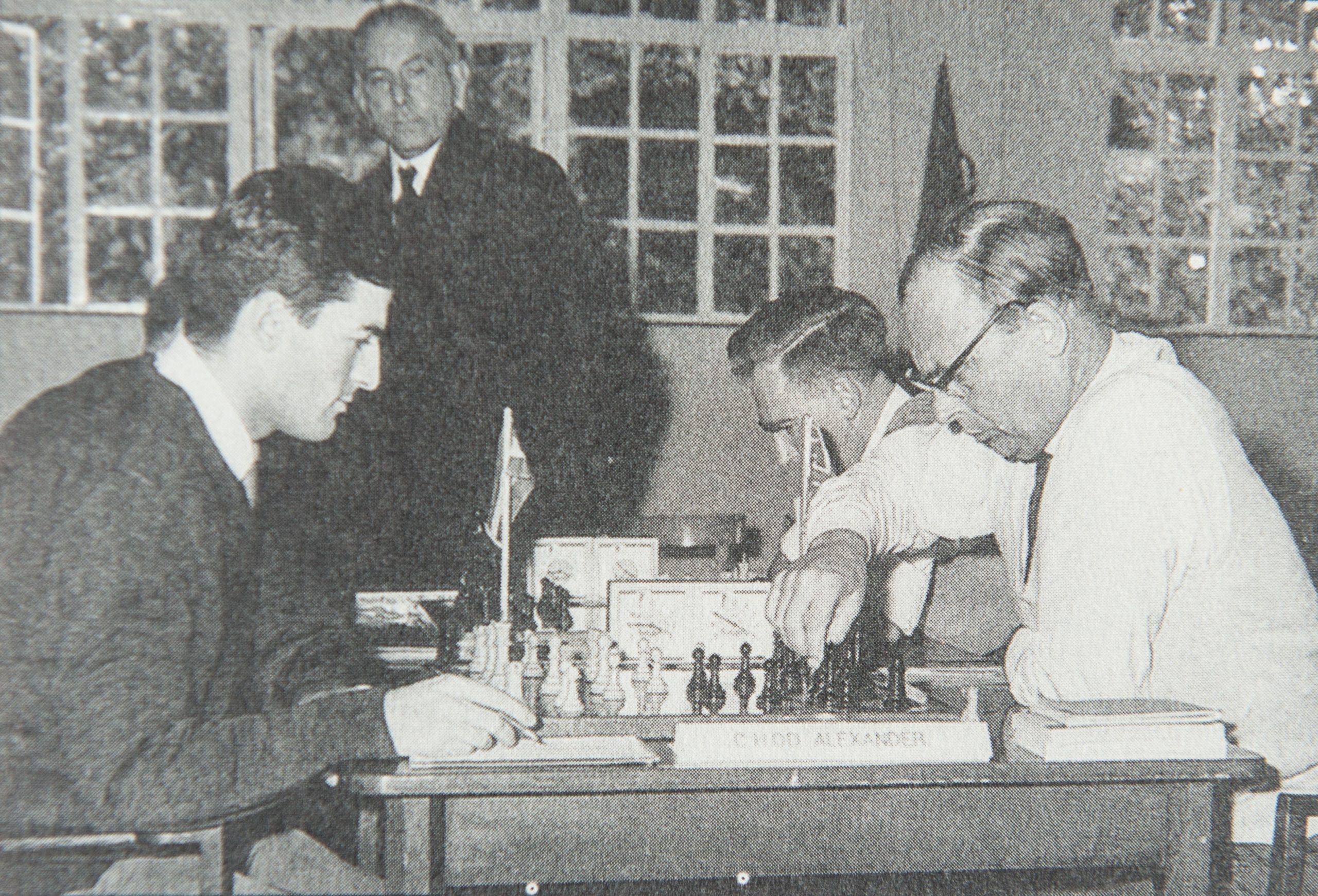
A final shrewd comment from Harry, based on his Moscow experience: “In 1917, the new Bolshevik regime claimed that they were abolishing all titles, privilege and so on. The result? Forty years later they have the most class-conscious society I have encountered.” One proof of this might be given – the Soviet internal passport system, one point of which required the holder (and for a long time no peasant was allowed such an identity document – who, then, could claim that the Tsar had abolished serfdom in the middle of the 19th century?) to state his/her ethnic origin: Russian, Ukrainian, Kalmyk, Armenian, Jew and so on. The Western mind boggles… ”
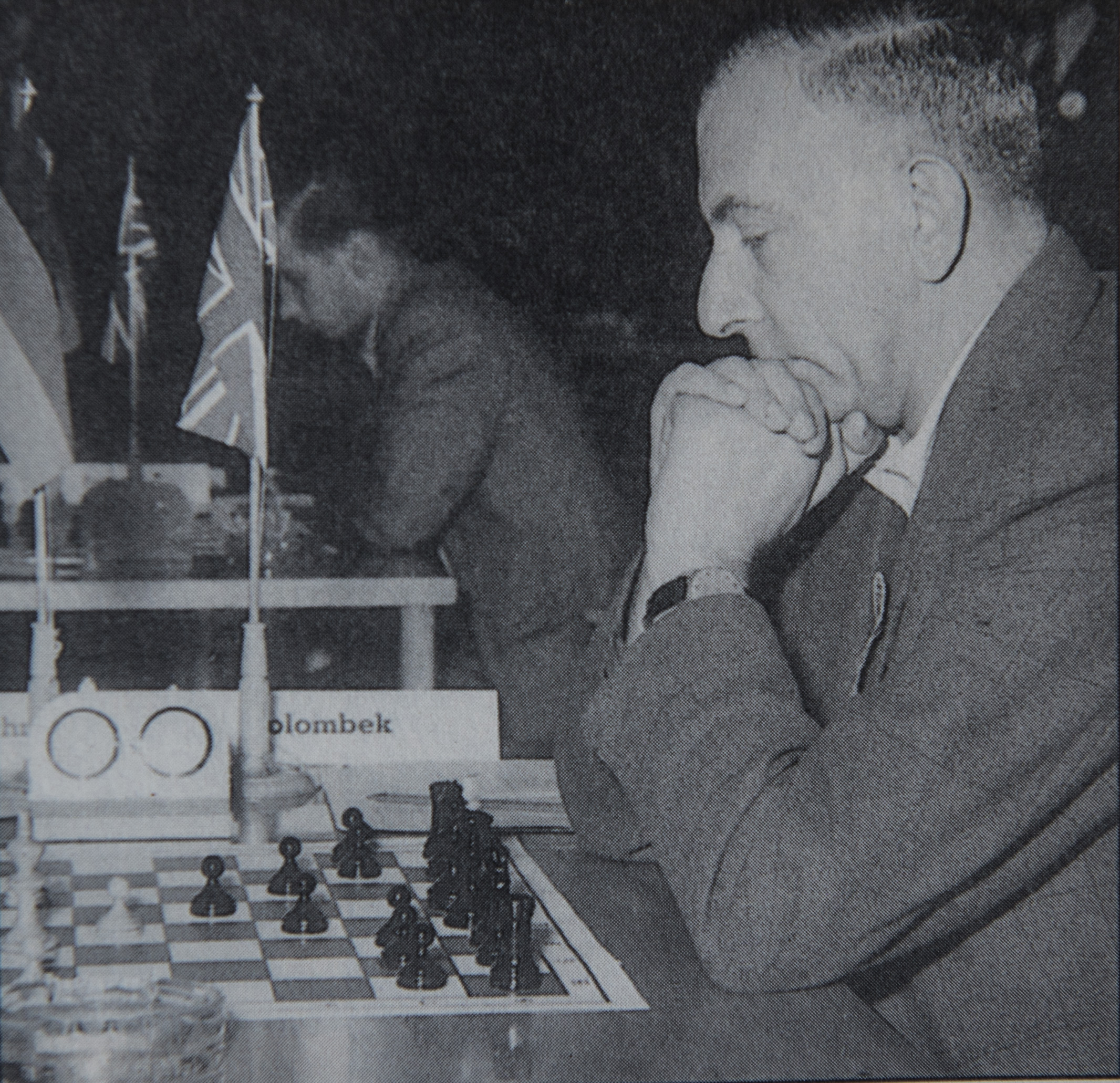
We leave the final word in reminiscences of Golombek to his near-neighbour in Chalfont St Giles, Barry Sandercock :
” Harry was a very interesting man to talk to and liked to talk about the early days when he played against some of the great players. He was also very knowledgeable on many subjects, the arts, music etc. I played him when he gave a simul at Gerrards Cross in 1955 (Jan.21st} and managed a draw after 3 hours play. I remember, the local paper once wrote an article about him, calling him an ex-world champion. I got a letter published where I pointed out that he was an ex-British Champion not ex-world champion. I hope he didn’t see that!”
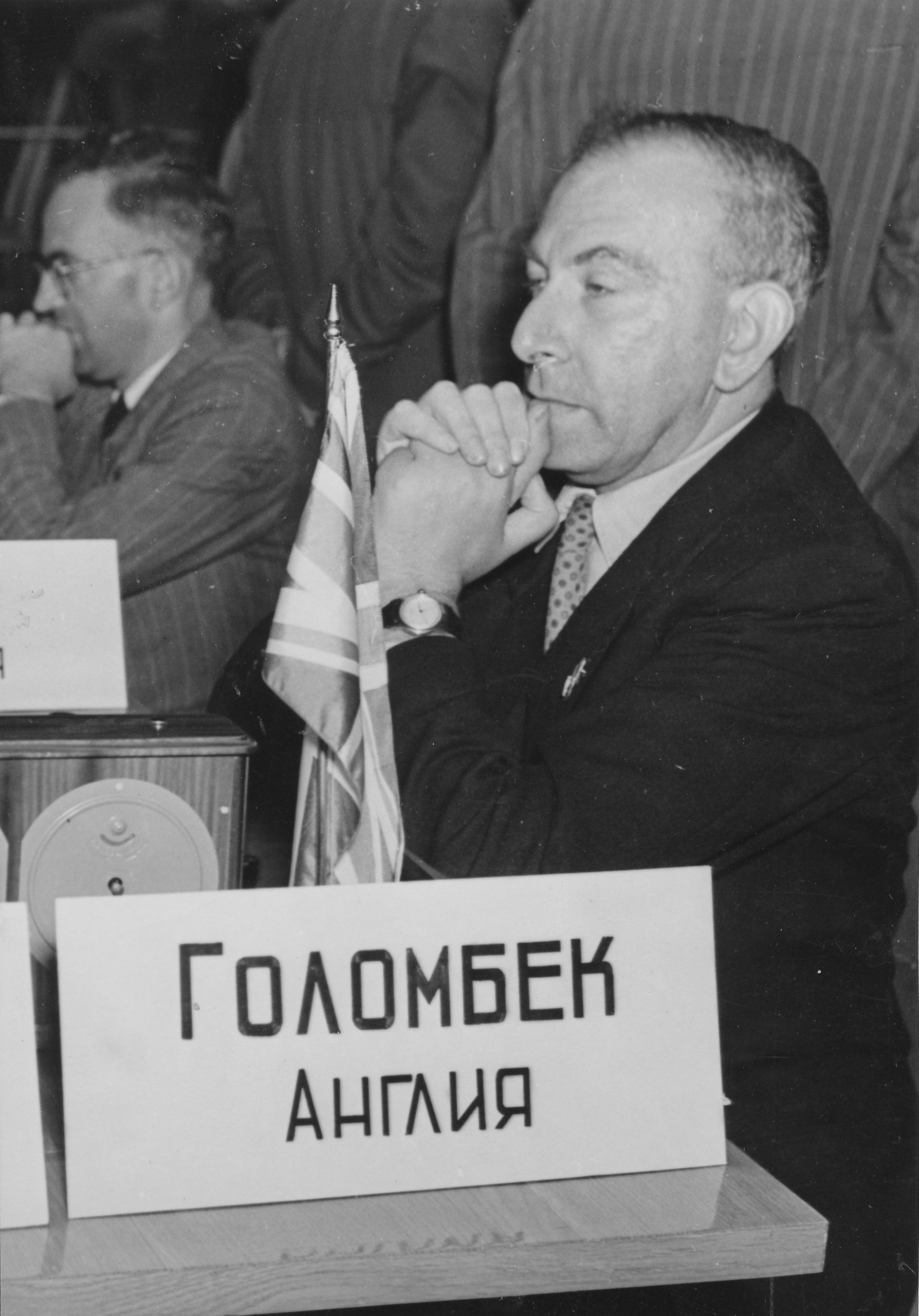
“To finish, a characteristic Golombek game, with his own notes. I (Ed) have selected one of the games from his victorious British Championship playoff match against Broadbent in 1947. It is characteristic of him in many ways. The game features a typically smooth positional build-up, from his beloved English Opening, played with the Nh3 development plan, which was a particular favourite of his. The notes are also very typically Golombek – concentrating in the main on verbal explanations, with relatively few variations, but also characterised by occasionally extreme dogmatism in his assessments, such as the notes to moves 1, 2 and 6, for example. The game and notes were published in the December 1947 issue of The British Chess Magazine.”
From The Anglo-Soviet Radio Chess Match by Klein and Winter :
“Harry Golombek is a Londoner, He was born in 1911, and learned chess when twelve years of age. He is another of those who went through the mill of the British Boys’ Championship, winning it in 1926. He has played in most English international tournaments, and has represented Great Britain in team tournaments. In the London International Tournament, 1946, he came fifth.
A graduate of London University, he served in the Foreign Office during the war, but has since retired to the country (Chalfont St. Giles). His literary activities include 50 Great Games of Modern Chess
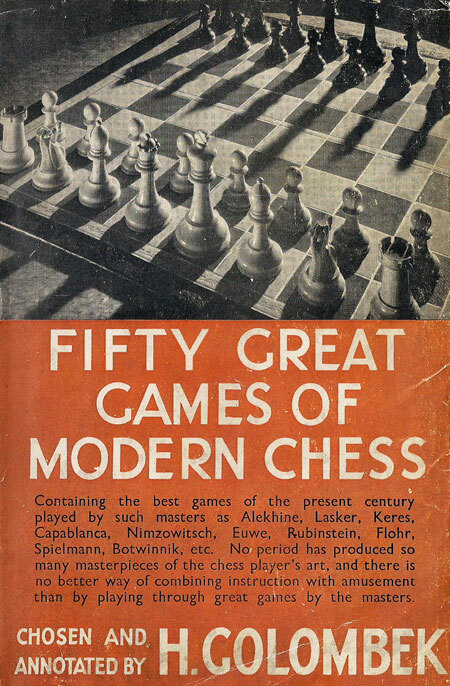
Legend, according to James Pratt, has it that HG wrote the book without the aid of a chess set!
and Capablanca’s Hundred Best Games.
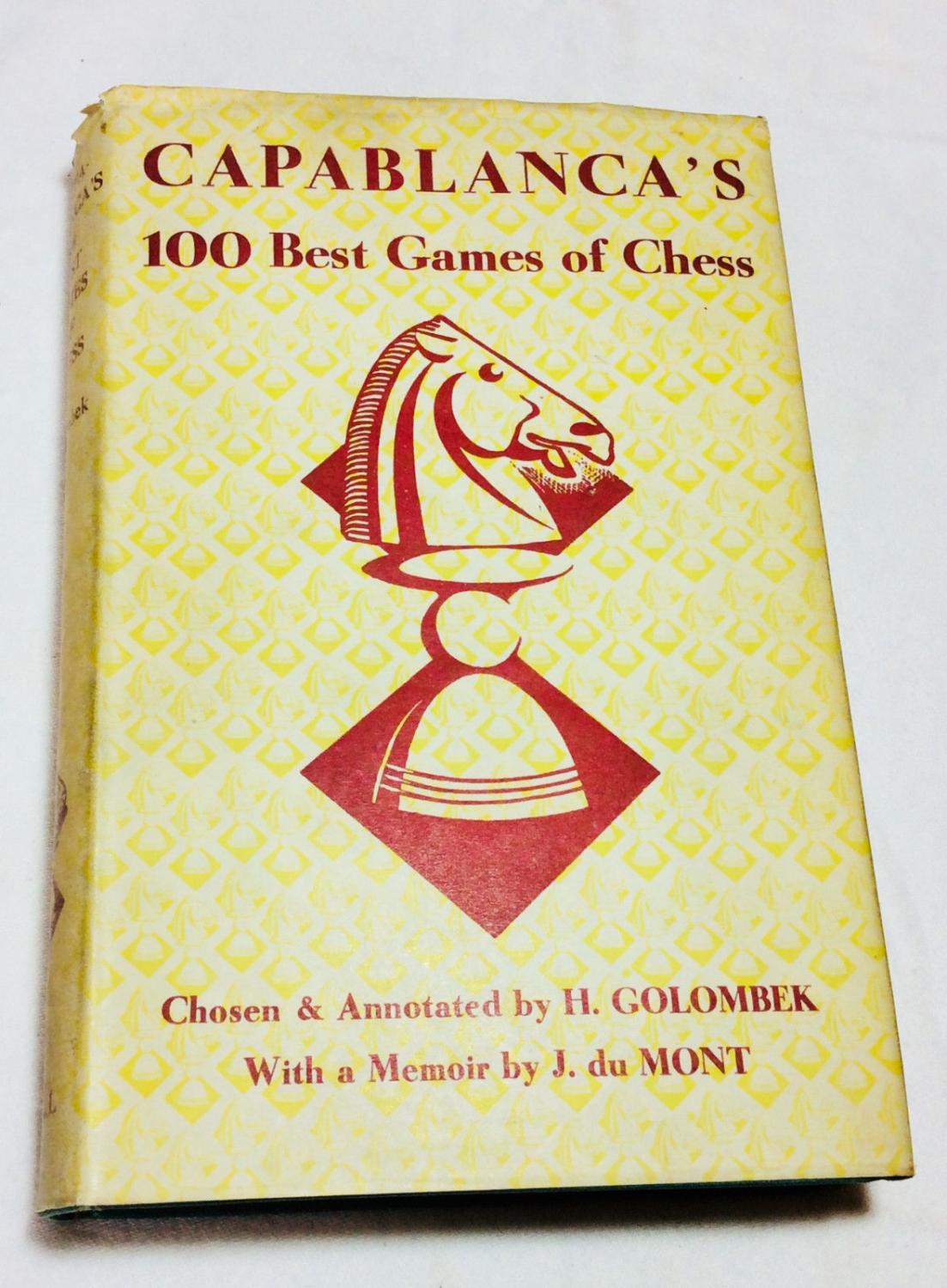
He reports chess tournaments for The Times, and edits The Times Weekly chess column.
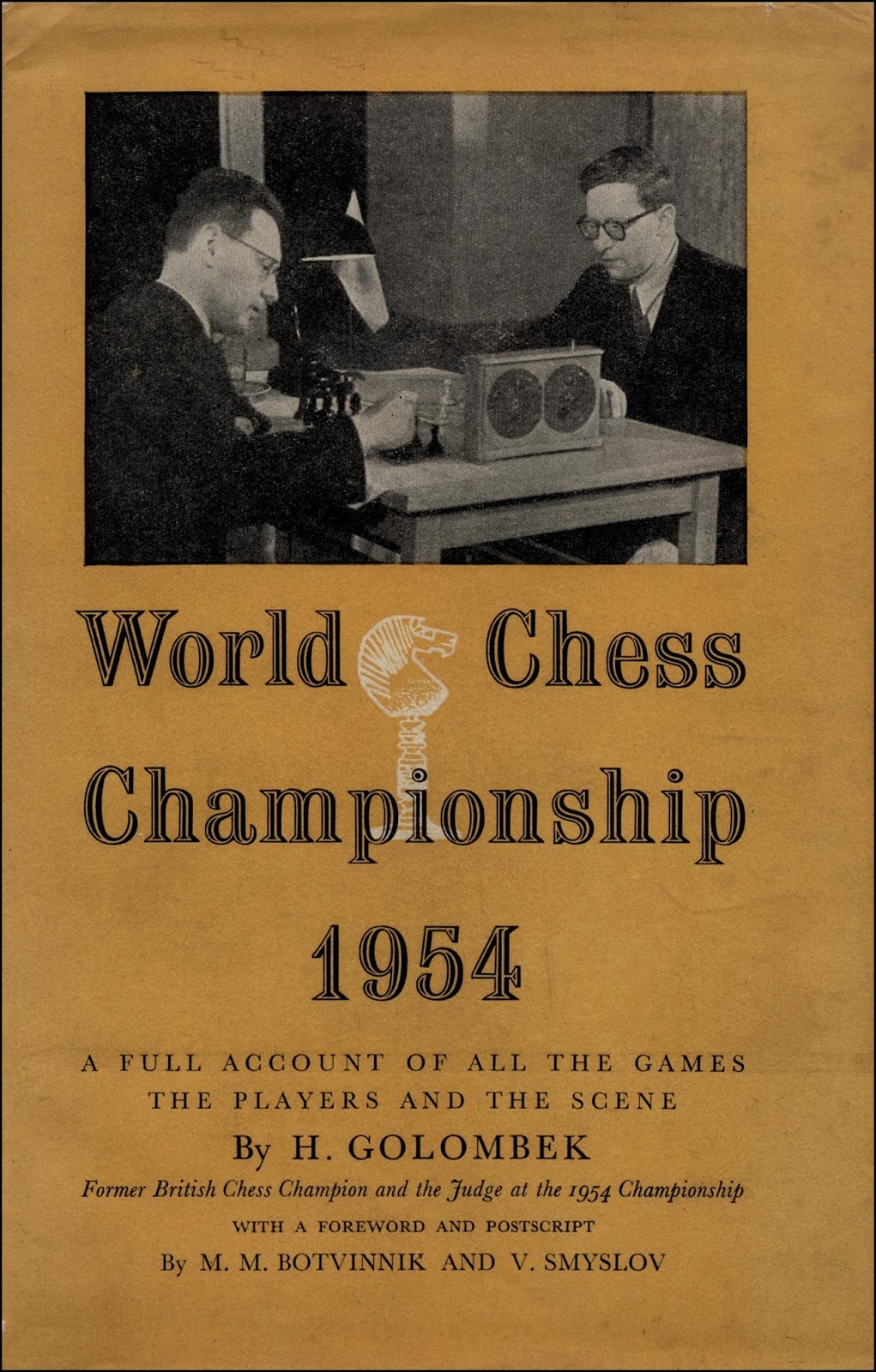
His chess is perhaps not inspired and lacks the spark of enterprise, but he is a solid player on the whole and is apt to hold the best to a draw.”
Here is HGs entry from Hooper & Whyld (The Oxford Companion to CHESS) :
“English player and author. International Master (1950), International Arbiter (1954), honorary Grandmaster (1985). In 1945 Golombek became chess correspondent of The Times, a position he held until 1989. Also in 1945 he decided to become a professional chess-player.
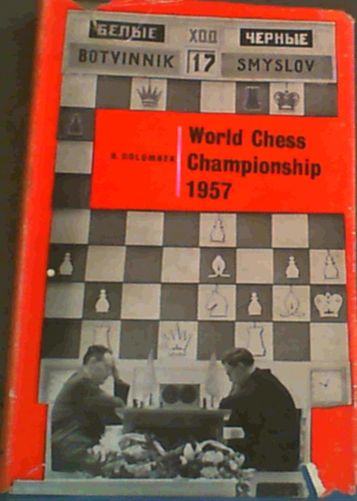
He won the British Championship three times (1947, 1949, 1955) and was equal first in 1959 but lost the play-off (to Jonathan Penrose) and played in nine Olympiads from 1935 to 1962. An experienced arbiter and a good linguist, supervisor of many important tournaments and matches, he served for 30 years on the FIDE Commission that makes, amends, and arbitrates upon The laws and rules of chess.
His many books include Capablanca’s Hundred Best Games (1947),
The World Chess Championship 1948 (1949),
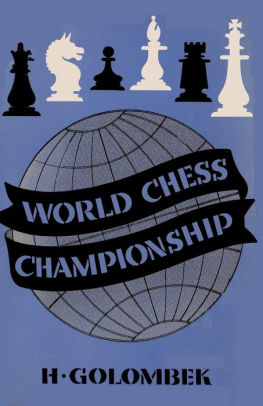
Réti’s Best Games of Chess (1954),
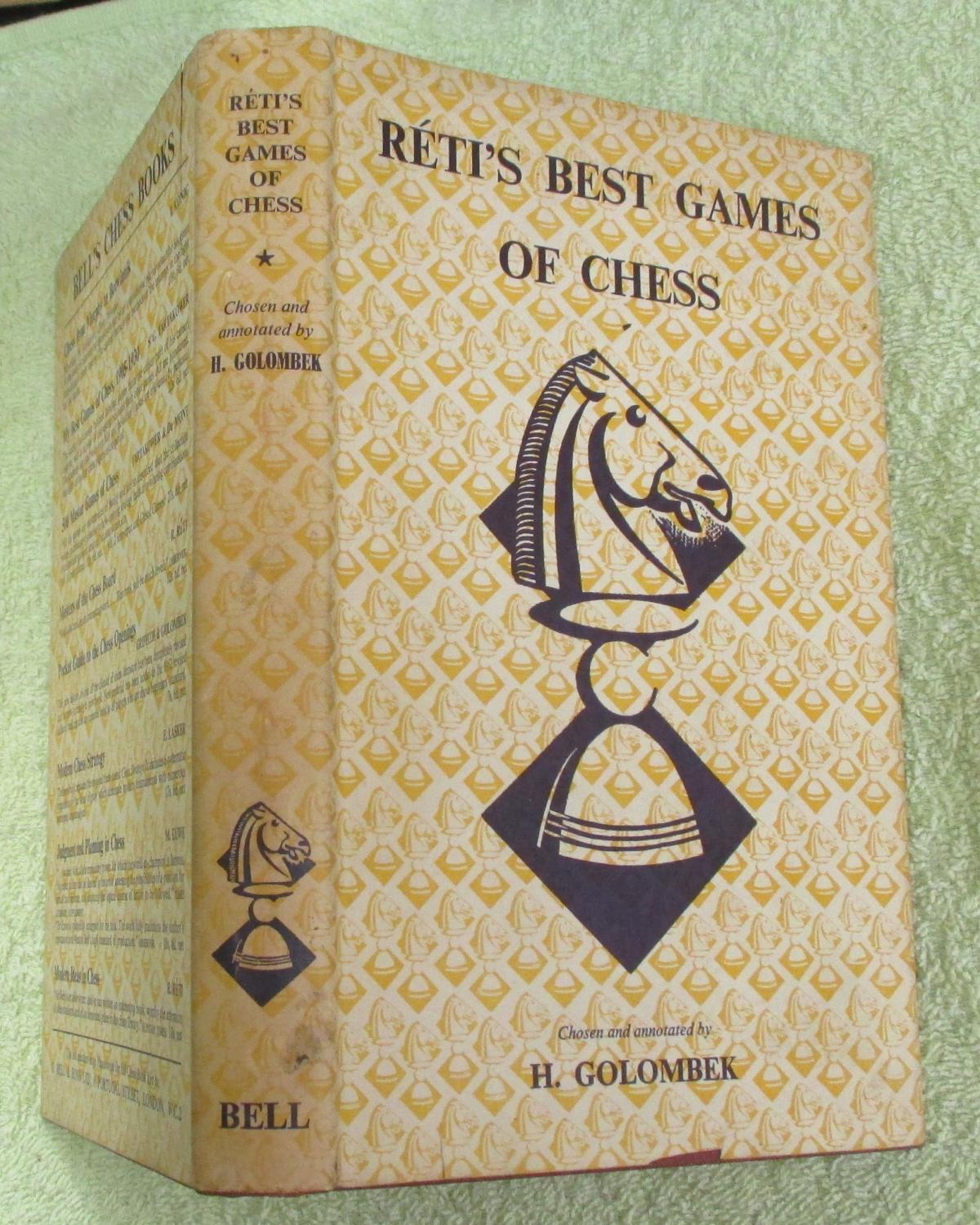
and A History of Chess (1976).”
H. Golombek, the Present Chess Correspondent of The Times is in every way a contrast to Alexander. His forte is accurate positional play which brings him many good victories against the ordinary rank and file but rarely yields better than a draw against the very best. The grand master needs more than accuracy to shake his equanimity.
Golombek has a wide theoretical knowledge and seems equally at home in every type of opening, though his preference is for the close variety. He is a fine analyst and has
written a number of very interesting books of which I must make special mention of The World Chess Championship 1948. During a sojourn in hospital I worked my hardest to flnd flaws in the annotations to this work, but quite without success.
He is Games Editor of the British Chess Magazine and has considerably enhanced the reputation of that journal. Very popular abroad, he was asked to officiate as judge at the world championship match in Moscow between Botvinnik and Smyslov. Although as far as settling disputes is concerned the job was, I understand, a sinecure, the appointment was a high honour both to Golombek himself and to the country he represents.
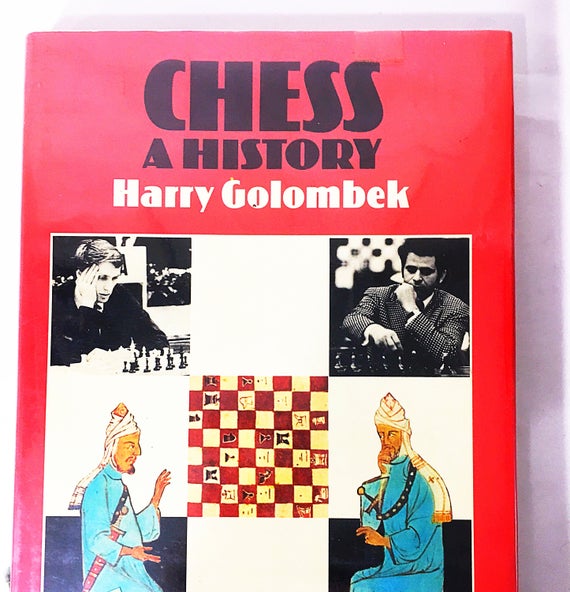
From The Encyclopaedia of Chess (Robert Hale 1970 & 1976), Anne Sunnucks :
“International Master and International Chess Judge. British Champion in 1947, 1949 and 1955. Captained the British Chess Federation team for many years in Chess Olympiads. In the 1972 Olympiad, captained the BCF women’s team. Chess author and chess correspondent of The Times since 1945 and the Observer since 1955. British Chess Federation to FIDE.
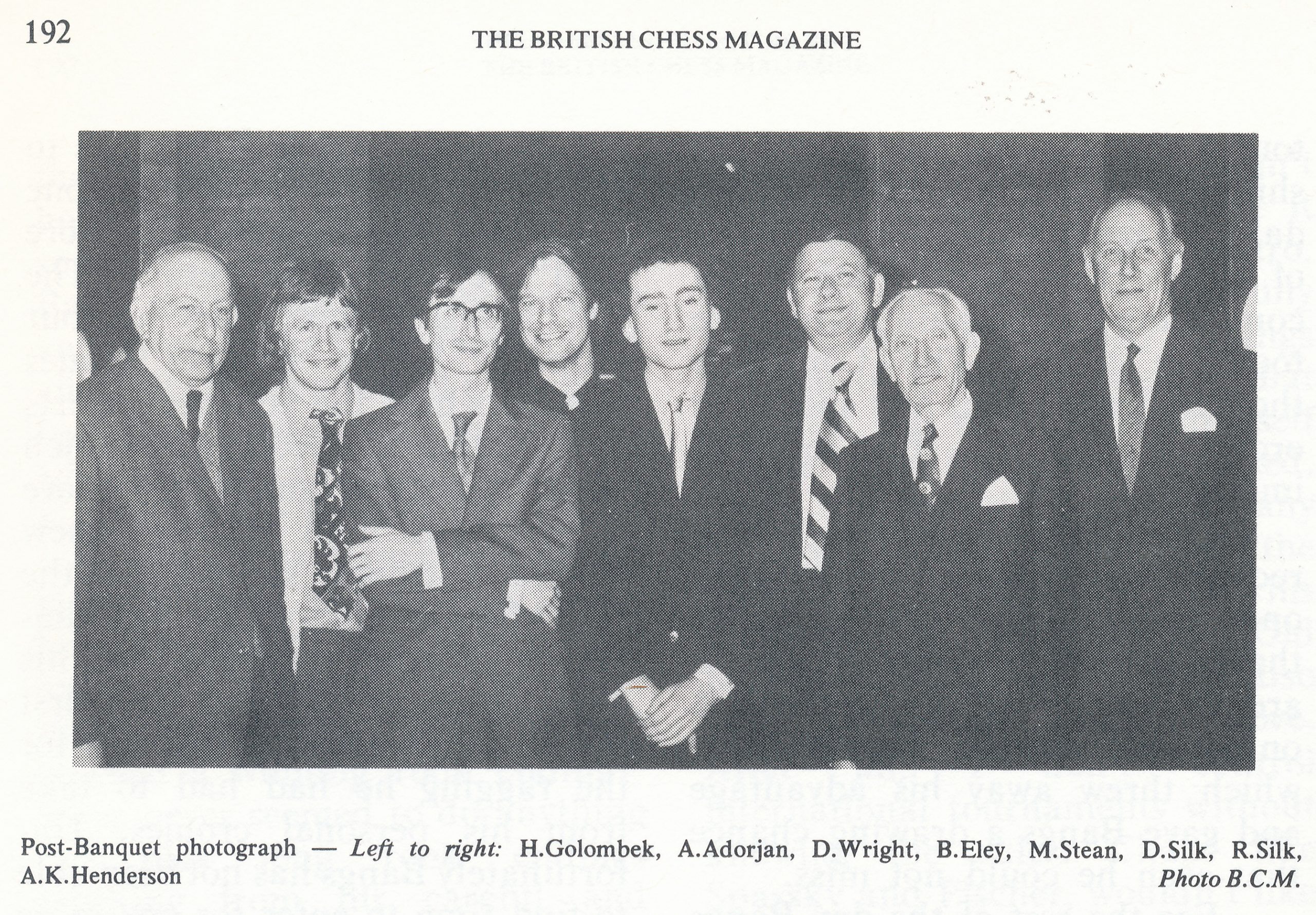
Born in London on 1st March 1911, Golombek learned to play chess at the age of 12 and in 1929 won the London Boy’s Championship. Two years later he became the youngest player to win the Surrey Championships. After graduating in languages at London University, Golombek devoted his full time to chess, apart from the way years, when served in the army and at the Foreign Office, and was awarded the OBE for his services to the game in 1966. He was the editor of the British Chess Magazine from 1938 to 1939 and for many years served as its games editor. He is now its overseas news editor. In his capacity as International Chess Judge, he has acted as judge in World Championship matches since 1954.
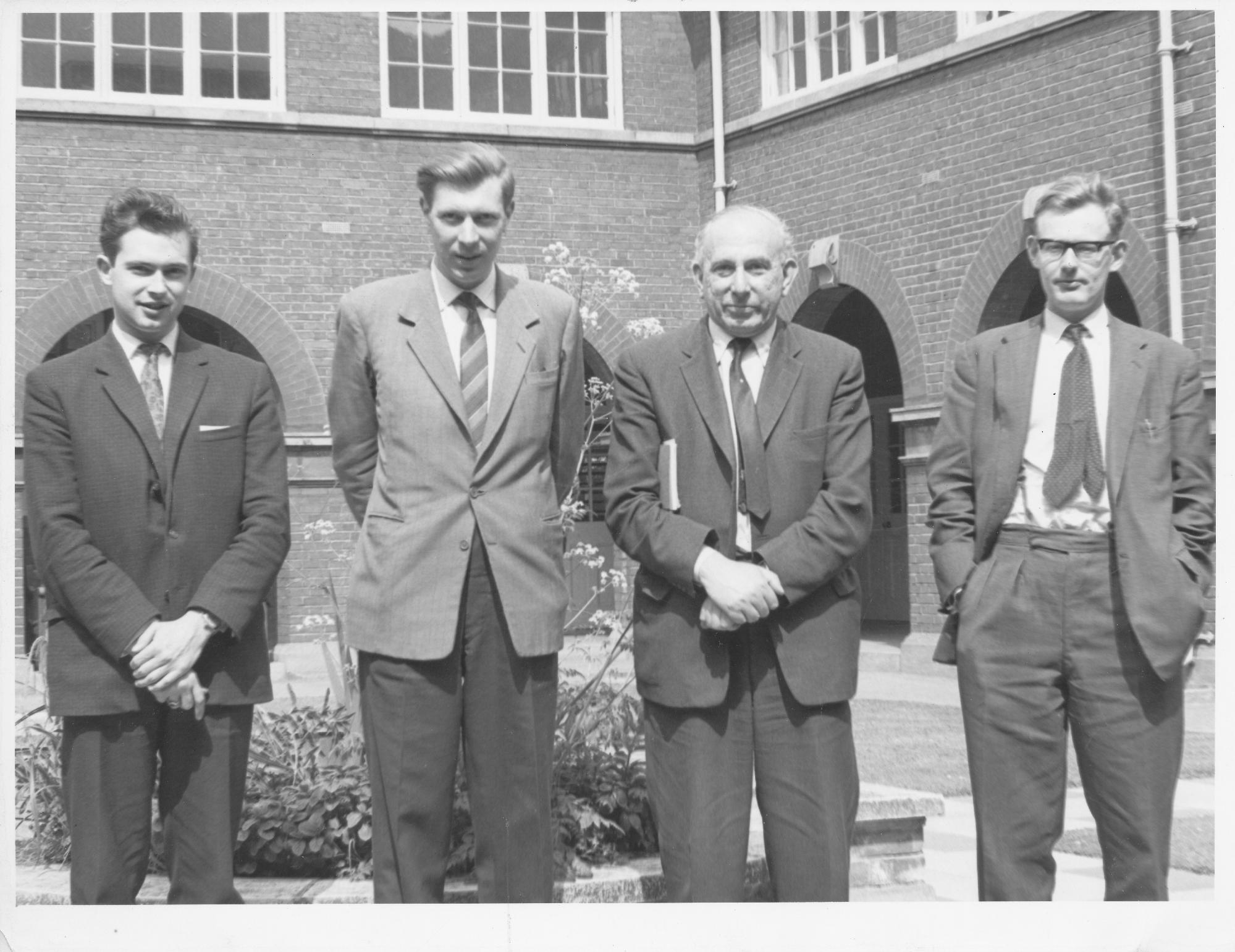
He has competed in a number of international tournaments, his best results being 1st at Antwerp 1938, 1st at Leeuwarden 1947, 1st at Baarn 1948 and -4th with Barcza, Foltys and Gliogoric at Venice 1949. in 1951, he represented the British Chess Federation in the Zonal tournament at Bad Pyrmont and came 5th, qualifying for the Interzonal. ”
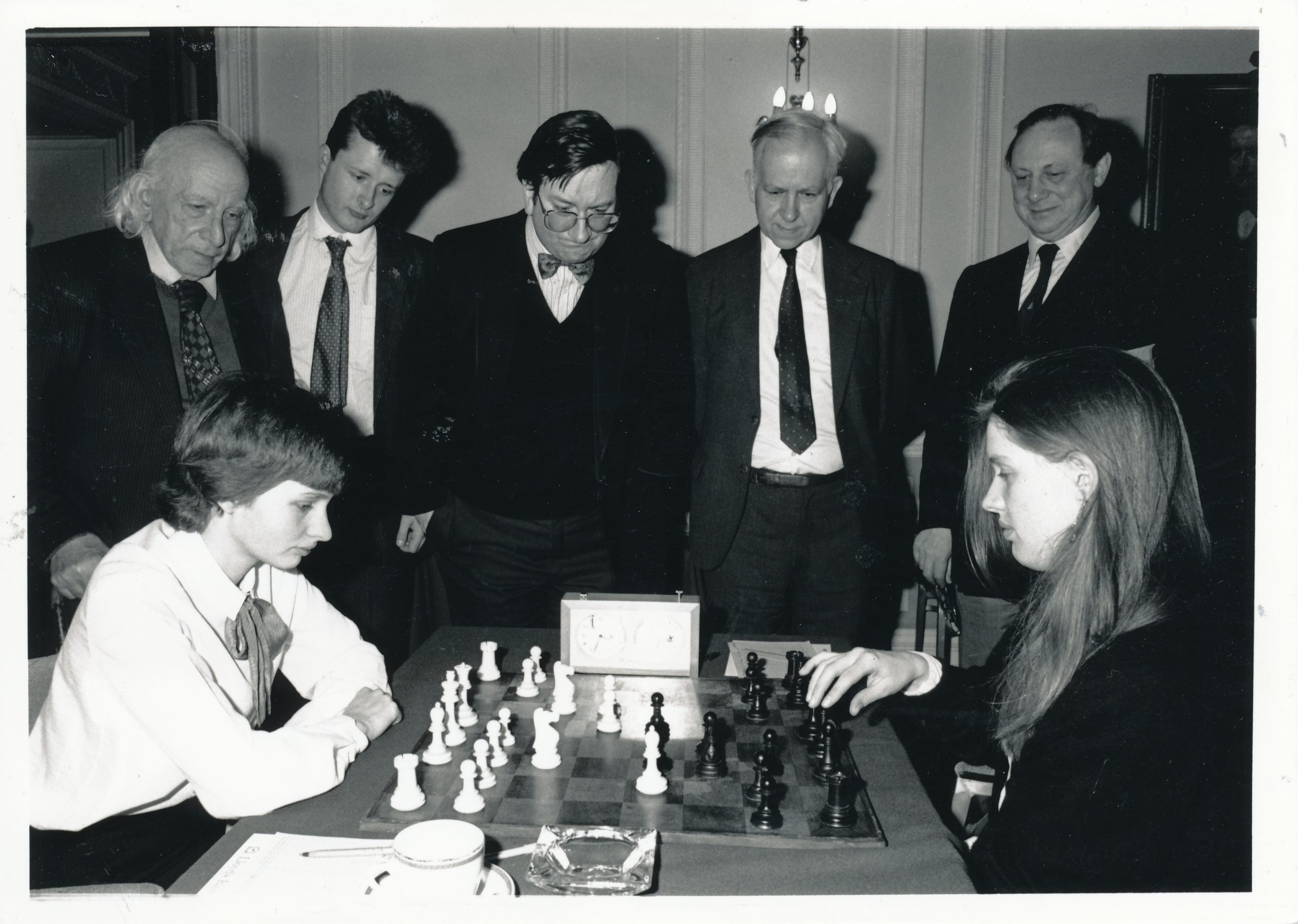
His publications include : Capablanca’s 100 Best Games of Chess (1947); World Chess Championship 1948 (1949); Pocket Guide to the Chess Openings (1949);
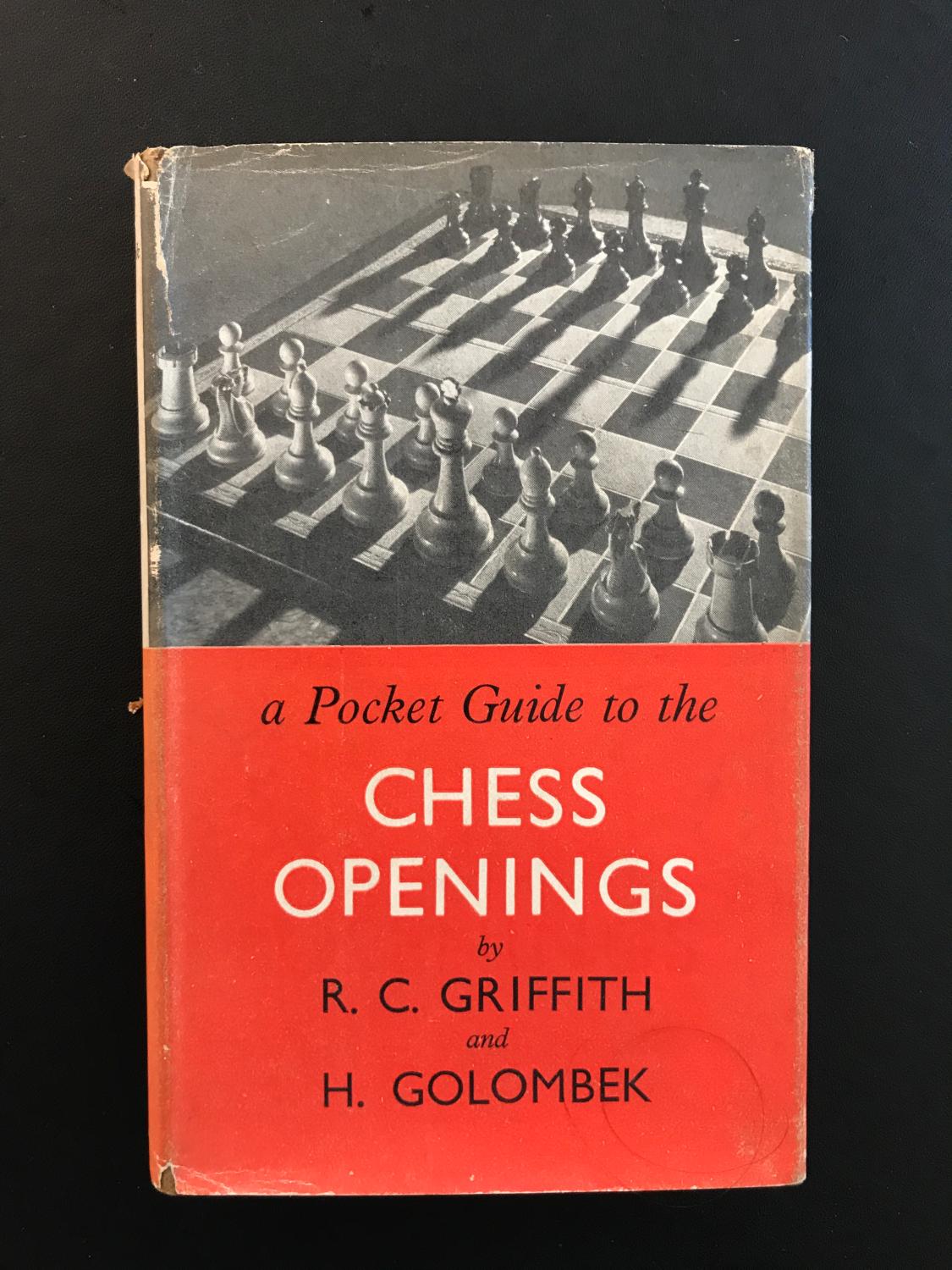
Hastings Tournament 1948-1949 (1949);
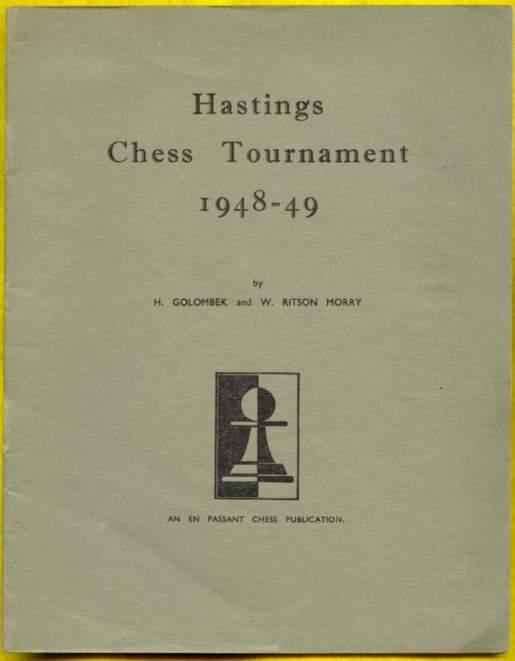
Southsea Tournament 1949 (1949); Prague 1946 (1950);
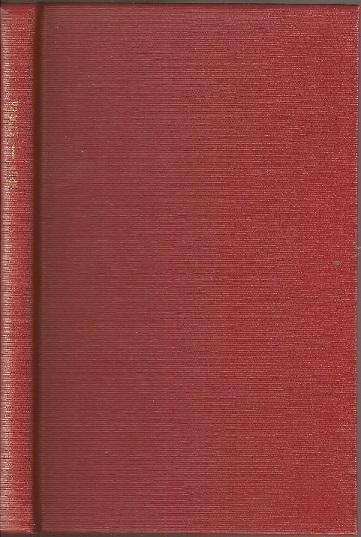
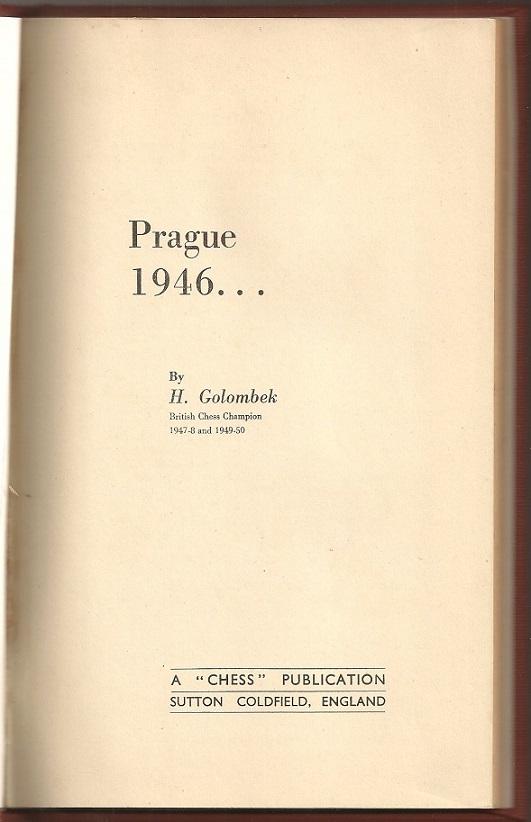
Budapest 1952 (1952);
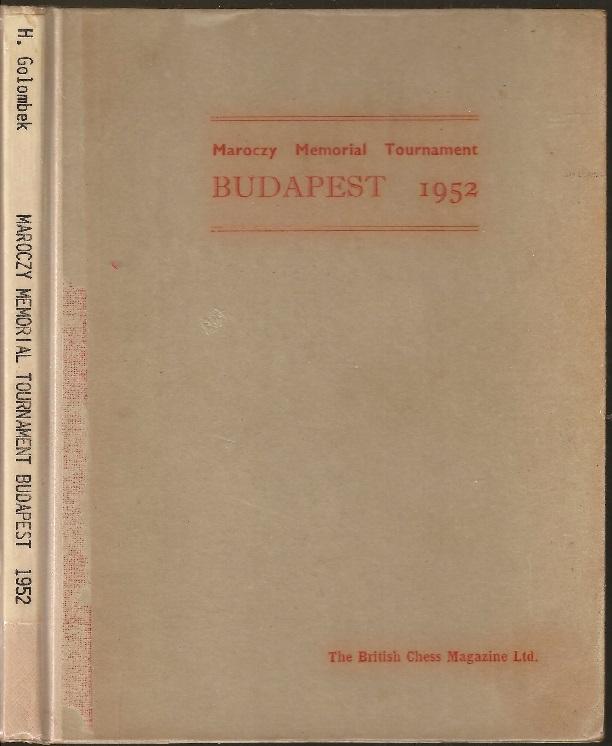
50 Great Games of Modern Chess (1952); Reti’s Best Games of Chess (1954); 22nd USSR Championship (1956);
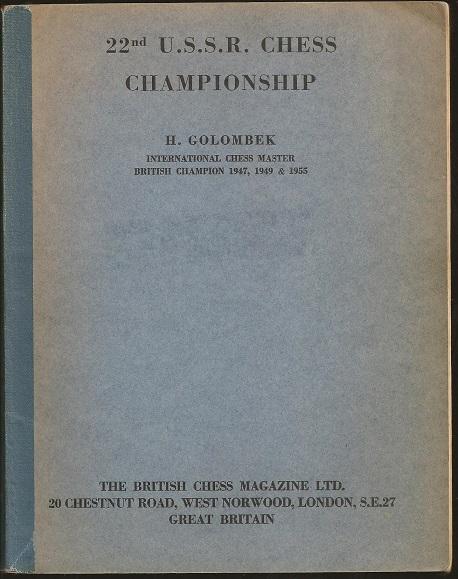
World Chess Championship 1957 (1957); Modern Opening Chess Strategy (1959);
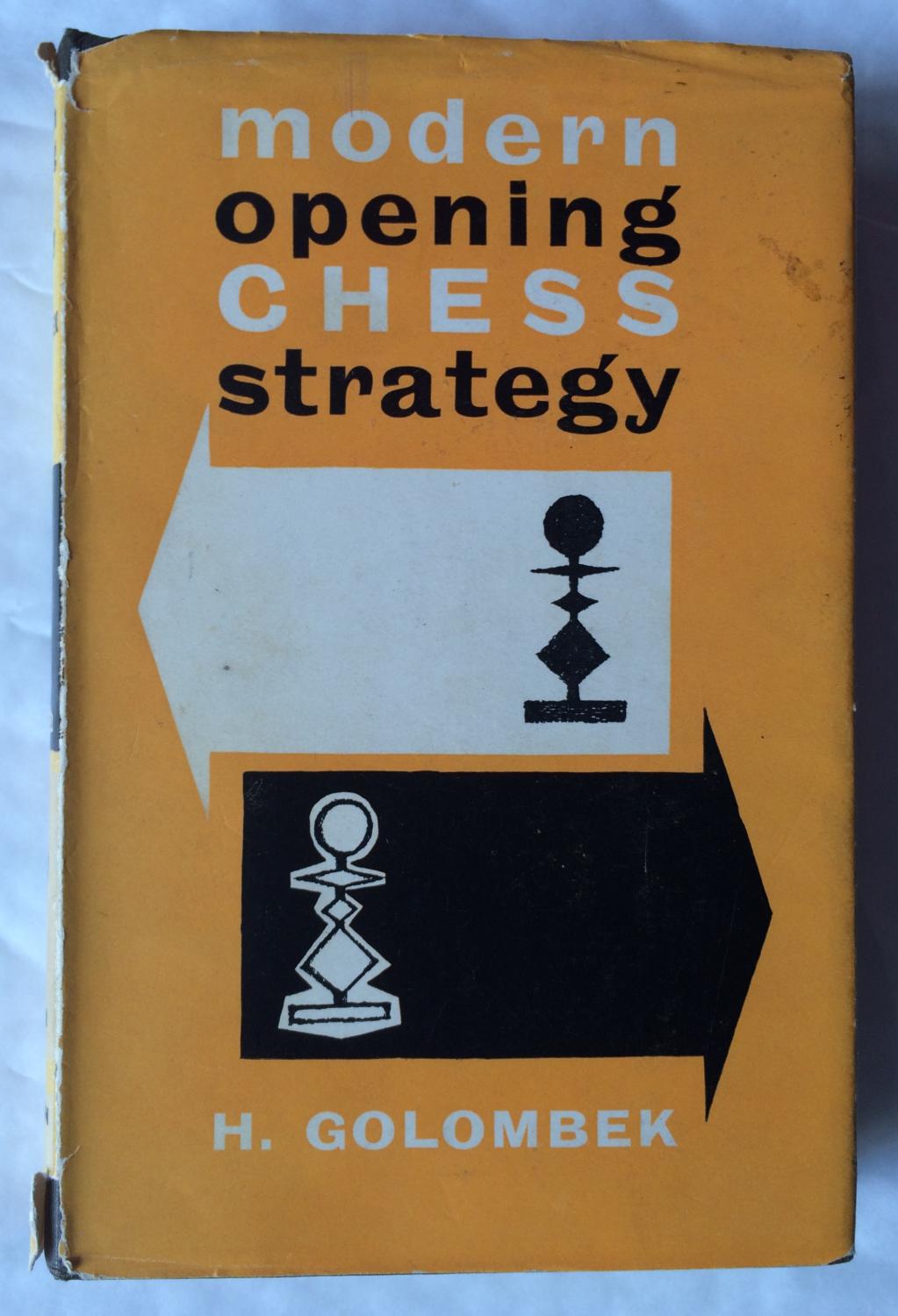
and a translation of The Art of the Middle Game by P. Keres and A. Kotov.
He enjoys classical music and has been known to be successful on the Stock Exchange.”
A reasonable enquiry might be : “What did Harry write about himself?” Well, according to
The Encyclopaedia of Chess (Batsford, 1977)
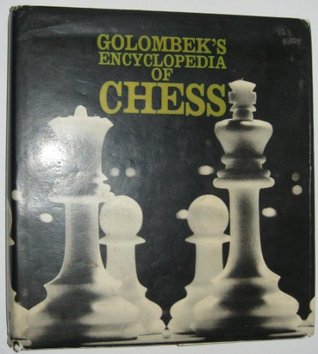
we have :
“British international master, three times British champion and the first person to figure in that country’s Honours List on account of his services to chess. Golombek was born in London and lived there till the Second World War. Educated as Wilson’s Grammar School and the University of London, he became London Boy Champion in 1929 and London University Champion 1930-3. By this time he was part of a trio of the leading players in England, the other two being Alexander and Milner-Barry. (Ed : It is curious that HG does not mention William Winter : maybe they were not like minded souls?)
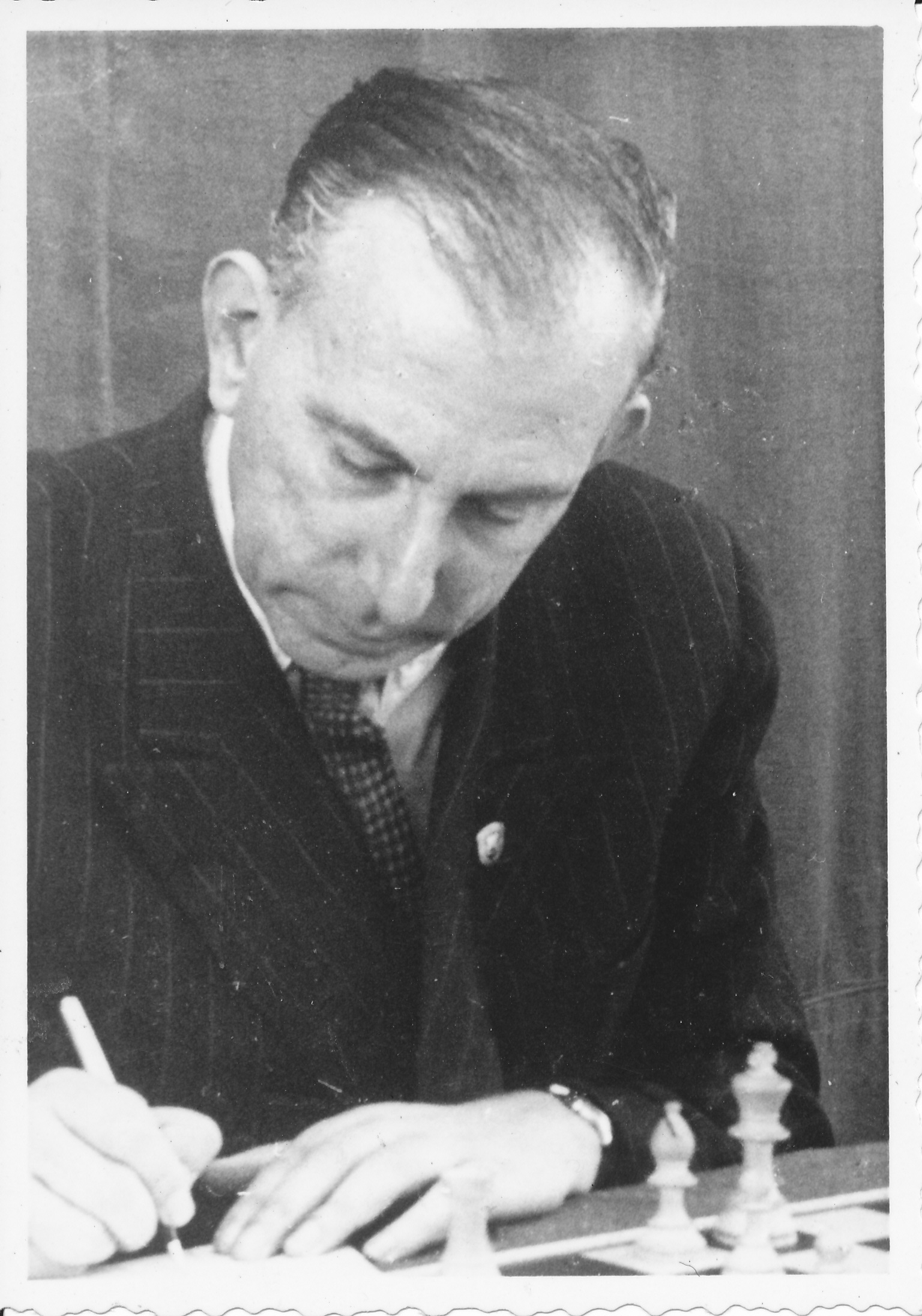
His best result in the British championship before the Second World War was -2nd with EG Sergeant, 1/2 a point below Alexander at Brighton 1938. In that year he won first prize in a small international tournament at Antwerp ahead of Koltanowski. In 1938 too he became editor of the British Chess Magazine and occupied this post till he entered the army in 1940.
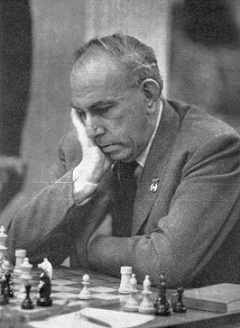
Before the war he had already played in three International Team Tournaments (or Olympiads as they subsequently became called) at Warsaw 1935, Stockholm 1937 and Buenos Aires 1939.
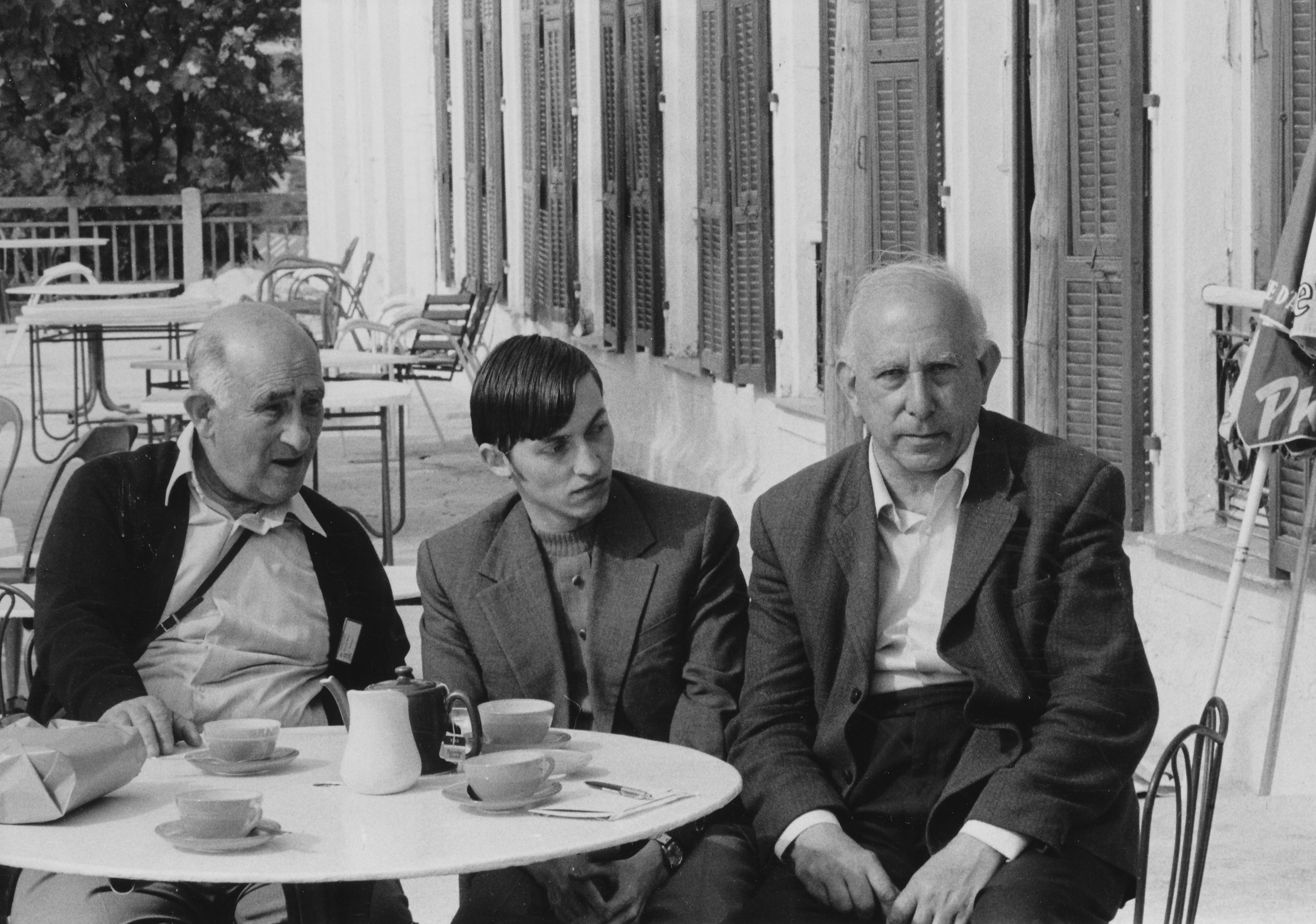
After the Buenos Aires event he went onto play in an international tournament at Montevideo where he came second to the World Champion, Alexander Alekhine.

In the war he served first in the Royal Artillery, from 1940-1 and then, for the rest of the war, in the Foreign Office at Bletchley Park, employed (like Alexander, Milner-Barry and quite a number of other chess-players) in code breaking.
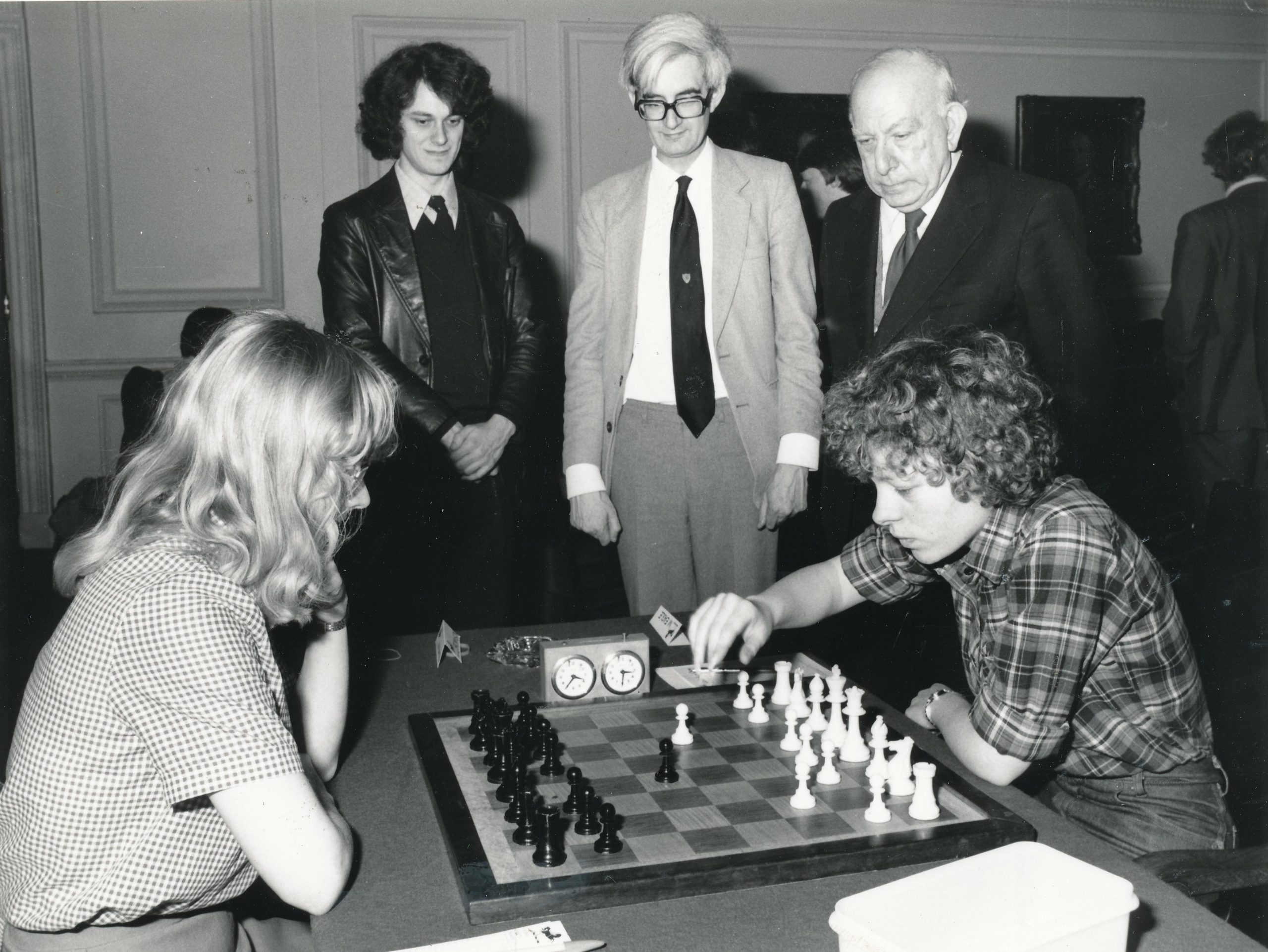
After the war he made chess and writing about the game his livelihood, becoming Times Chess Correspondent in 1945 and Observer Chess Correspondent in 1955. As a player he had a consistently good record in the British Championship, coming in the prize list on fourteen out of eighteen occasions he competed in the event. He was British Champion at Harrogate 1947, Felixstowe 1949 and Aberystwyth 1955.

Here is HGs win against his old friend PS Milner-Barry from Aberystwyth 1955 :
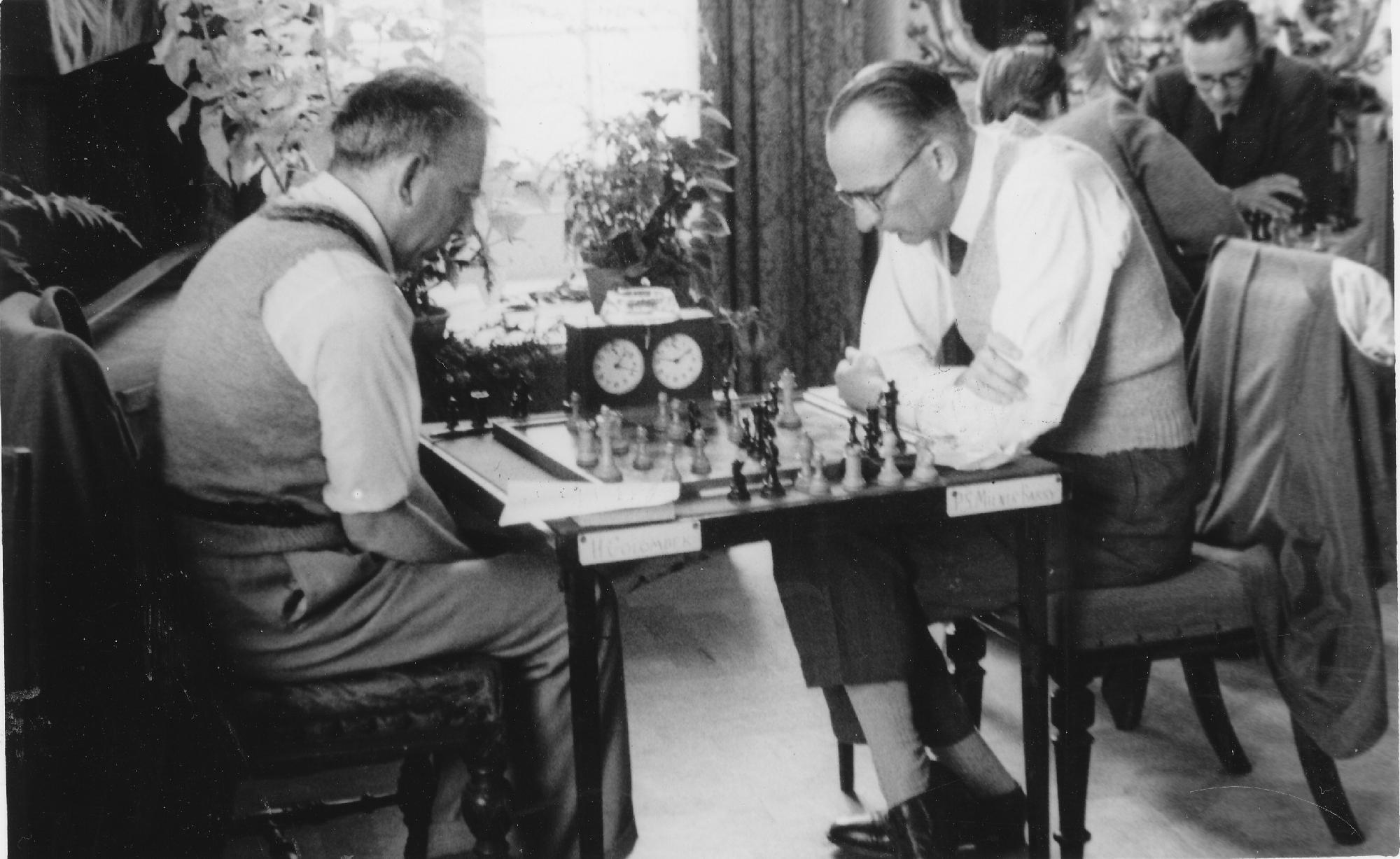
He represented England in six more Olympiads, Helsinki 1952, Amsterdam 1954, Moscow 1956, Munich 1958, Leipzig 1960 and Varna 1962.
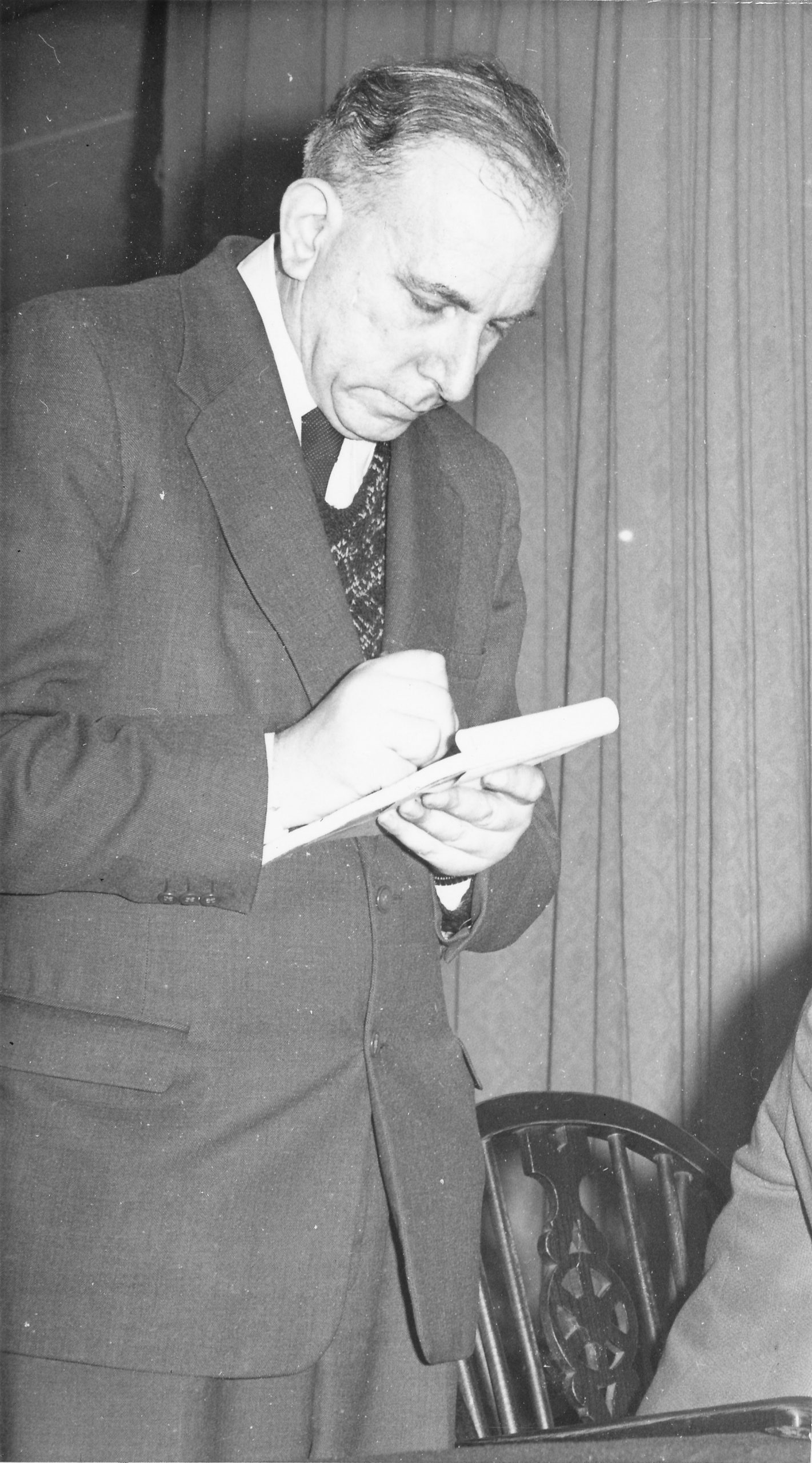
His best individual international results were first prizes at small tournaments in Leeuwarden 1947, Baarn 1948 and Paignton 1950 (above Euwe and Donner); =4th with O’Kelly at Beverwijk 1949, =4th with Barcza, Foltys and Gligoric at Venice 1949, and 5th at the European Zonal tournament at Bad Pyrmont 1951, thereby becoming the first British player to have qualified for the Interzonal. He was awarded the OBE in the Queen’s Birthday List in 1966.

A founding member of the FIDE Commission for the Rules of Chess, he became a FIDE International Judge and as such officiated at six World Championship matches. He was also chief arbiter at a FIDE Candidates tournament, at an Interzonal and two European Team Championship finals, etc. When the FIDE President, Dr Euwe, had to return home from Reykjavik before the 1972 Spassky-Fischer match got started. Golombek represented FIDE in Iceland and did much to ensure that the match took place and that it continued to be played.
Harry gave more than the average number of simultaneous displays in this career. For the photograph below Leonard Barden provided the following caption :
“Harry was invited because it was the 50th anniversary of his victory in the London Boys 1929 a success which he often referred to in his Times column. There were seven 30-board simuls that day, the top three being England Juniors v USSR (Spassky, Vasyukov, Kochiev) where Spassky had the worst simultaneous result of his career. No 4 was by Murray Chandler, Harry was No5 and the others by Whiteley and Rumens. The juniors who played the Russians were personally invited.”
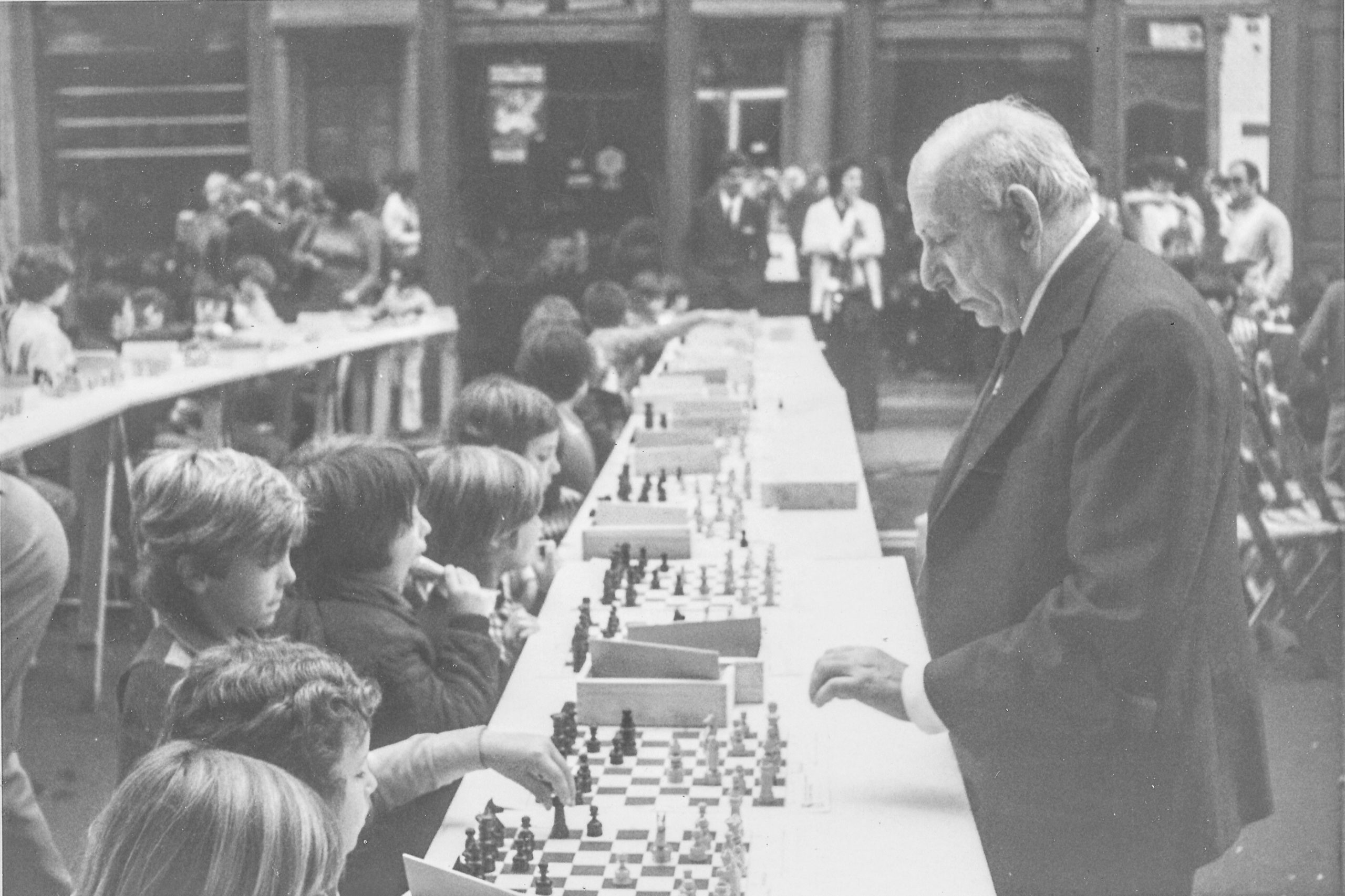
A prolific writer and translator of books on the game, he has had some thirty-five books published on various aspects of chess. Among them are : Capablanca’s Best Games of Chess, London, New York 1947; Reti’s Best Games of Chess, London 1954; New York 1975; The Game of Chess, London 1954; Modern Opening Chess Strategy, London 1959; A History of Chess, London, New York 1976.“

From British Chess (Pergamon Press, 1983), Botterill, Levy, Rice and Richardson, we have this rather brief biography :
“Thee times British Champion (Harrogate 1947, Felixstowe 1949, Aberystwyth 1955) and the first person to figure on the Honours List for services to Chess. He has represented England in 9 Olympiads. A FIDE International Judge and Arbiter has has officiated at 6 World Championship matches. He is chess correspondent of The Times and a prolific writer and translator”
Here is his brief Wikipedia entry
and here is a fascinating insight into HGs Bletchley Park days.
Bill Hartston wrote this excellent obituary published in The Independent.
A recent article from Andre Schultz of Chessbase.
Edward Winter has written this interesting article last updated in December 2020 despite announcing self-dormancy in March 2020.
Here we have a selection of publications not already mentioned above :
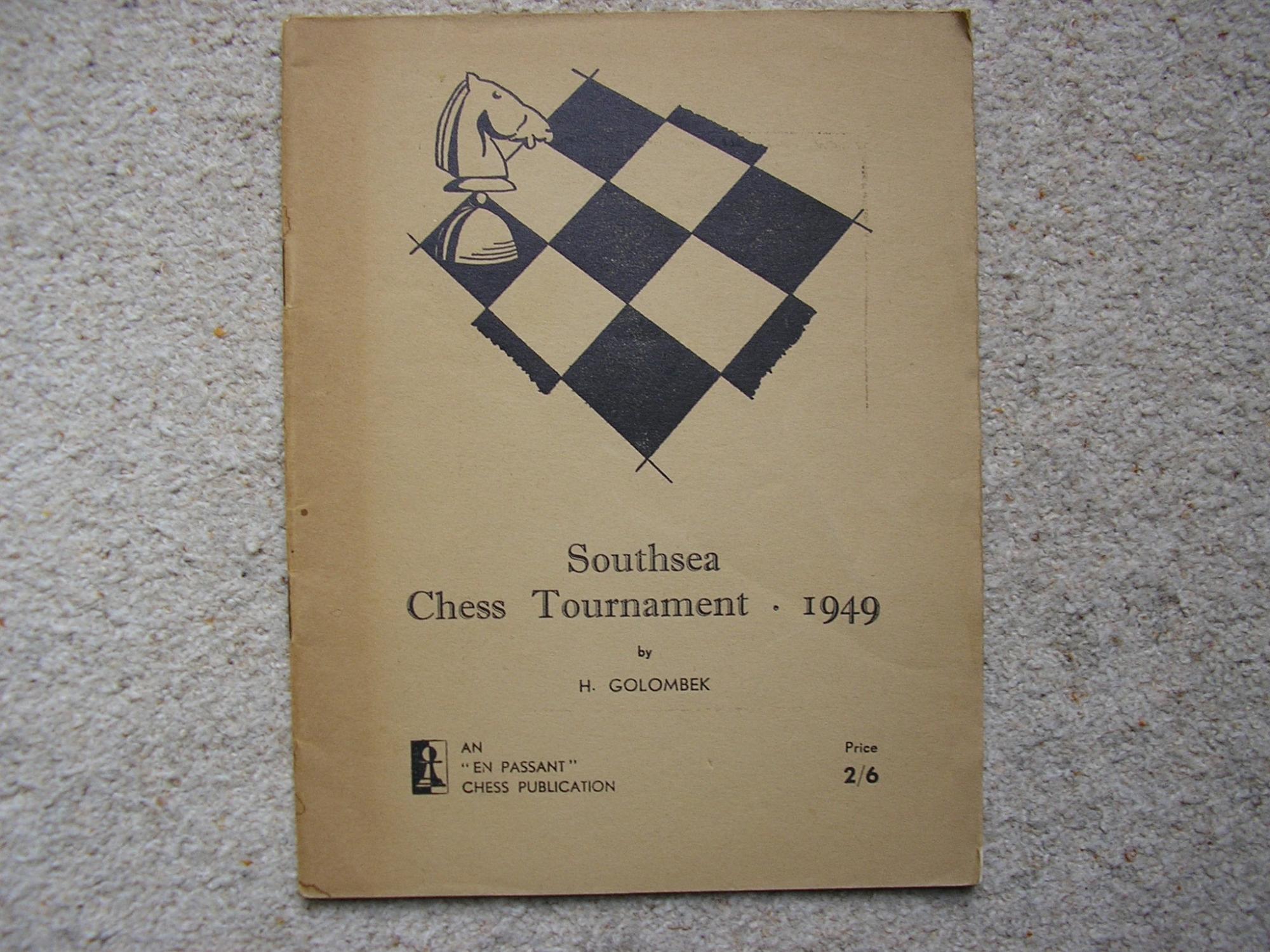
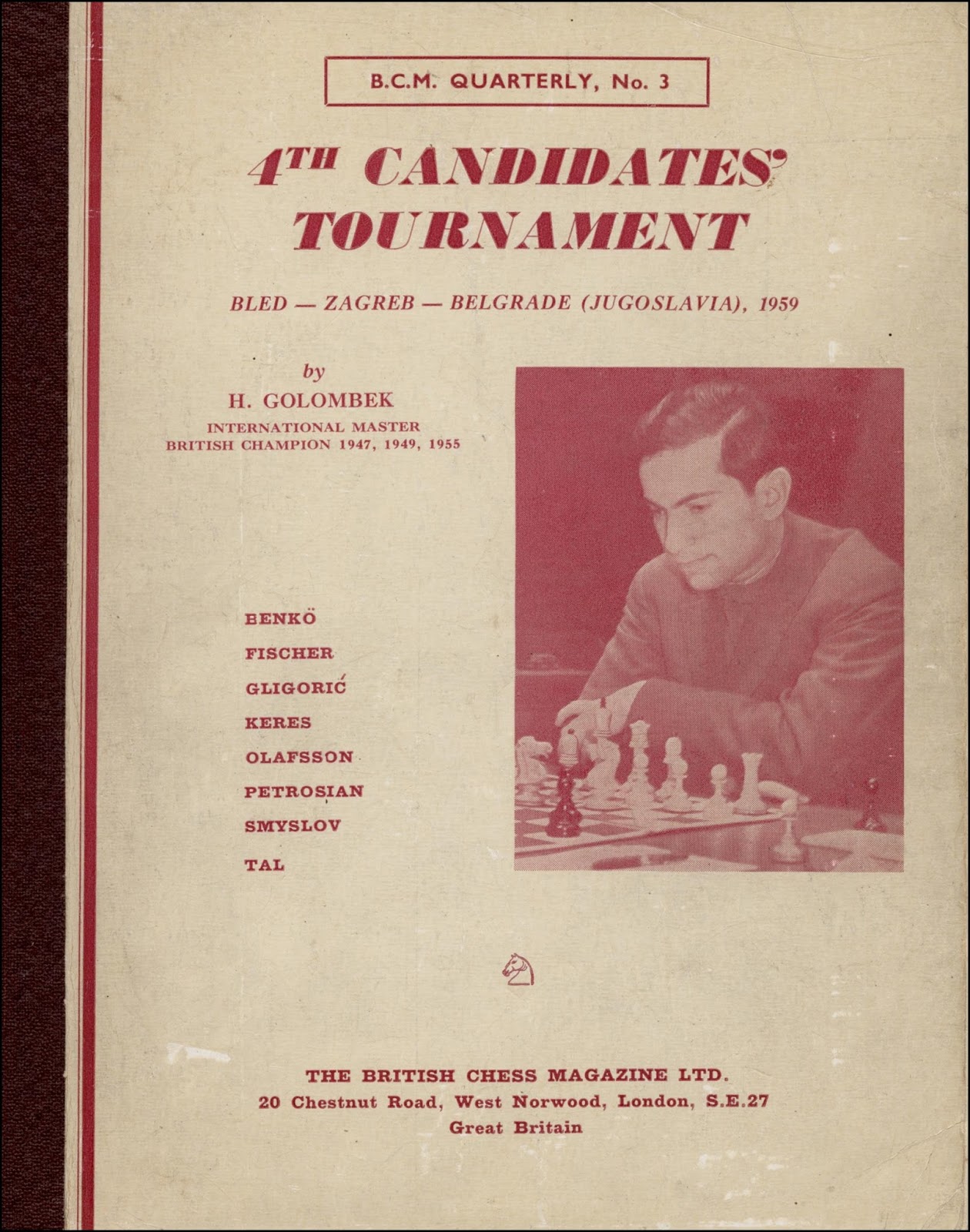
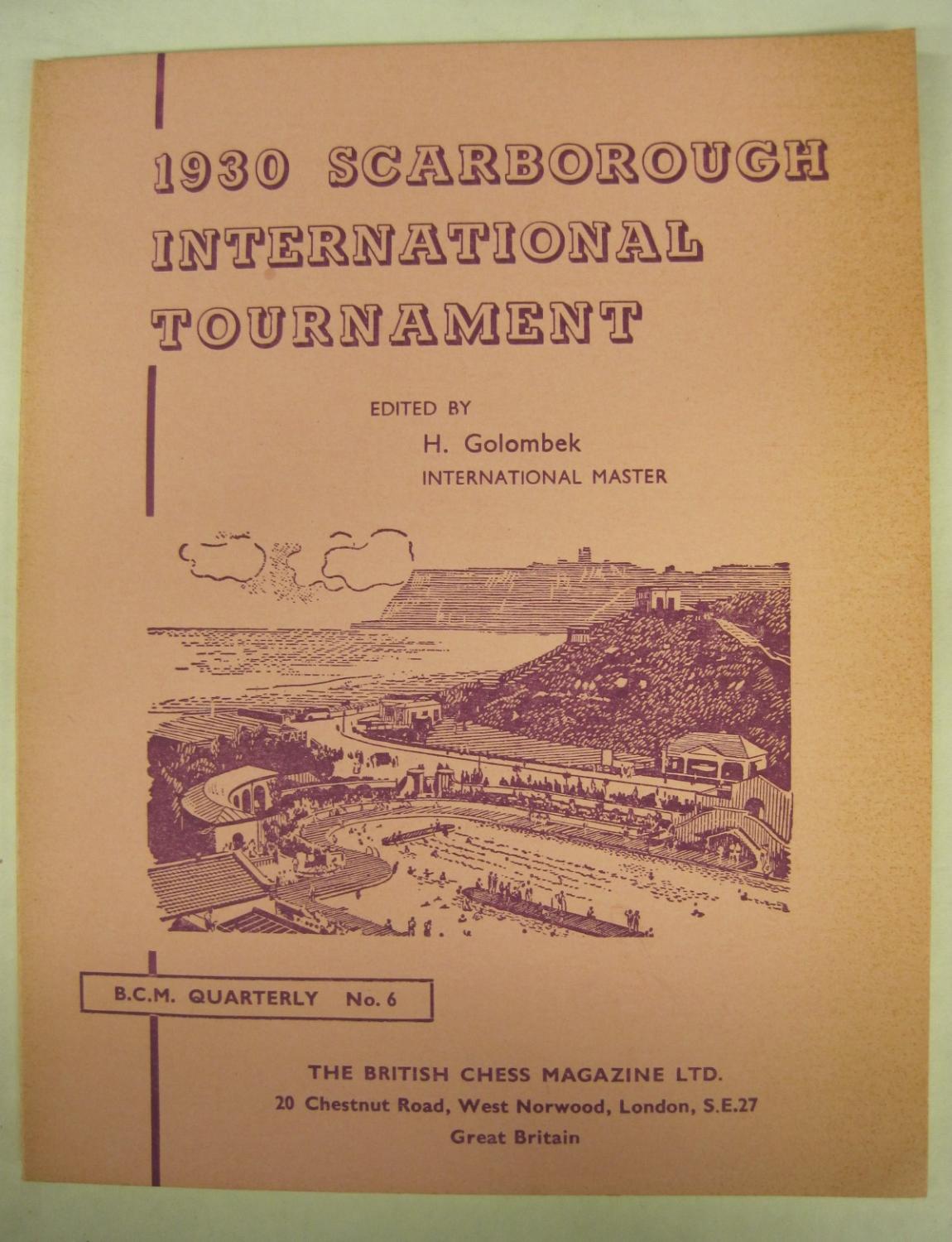

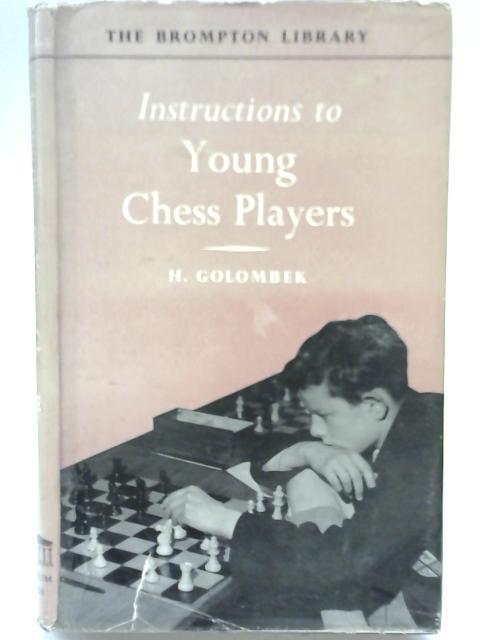
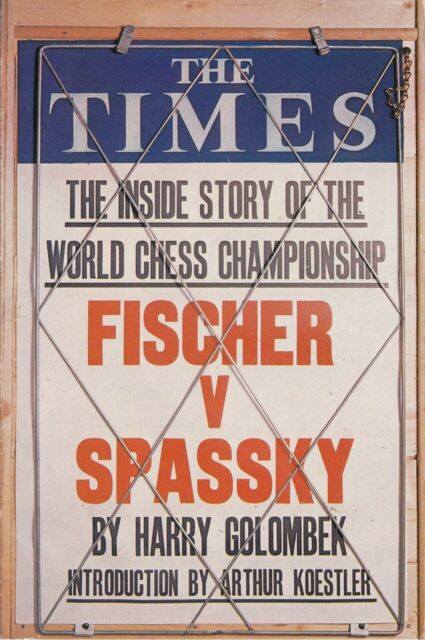
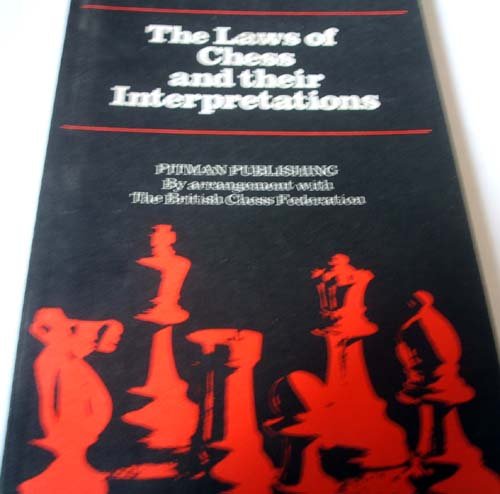
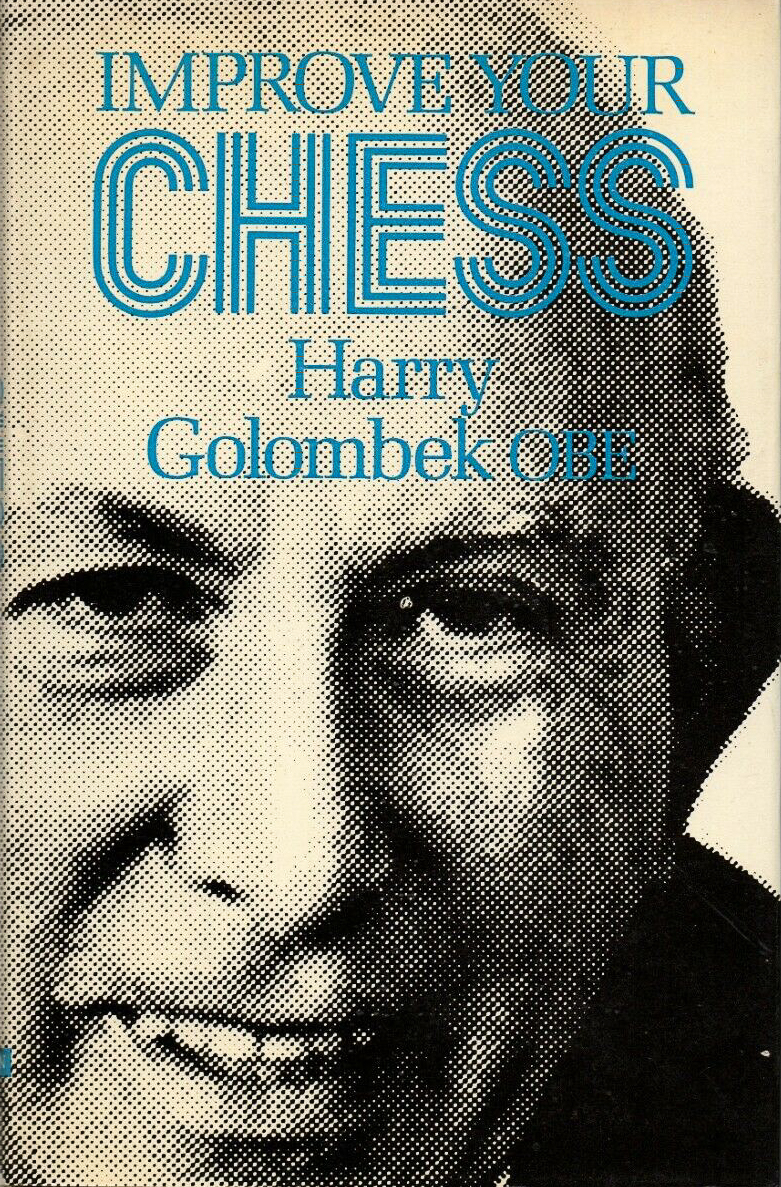

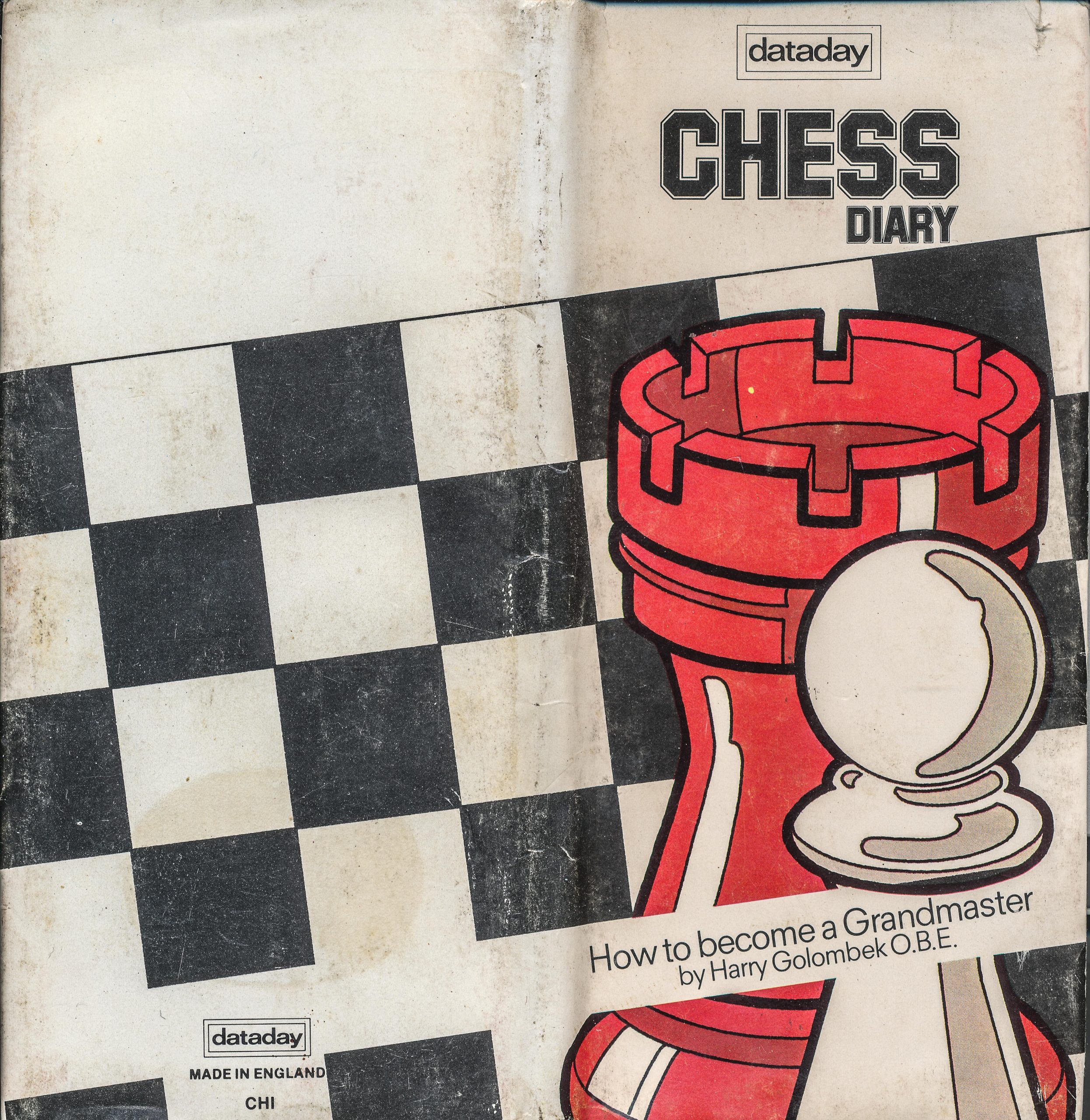


We remember Elaine Pritchard who passed away ten years this day on Saturday, January 7th, 2012.
Dorée Elaine Zelia Saunders was born on Thursday, January 7th, 1926. Her father was Henry de Beaufort Saunders (b. 7 Aug 1900, Folkestone, Kent d. Between Jul 1989 and Sep 1989) and her mother was Dorée Nellie Irene Dudley (b. 3 May 1900, d. 9 Jun 1970)
In the 1939 register Henry is listed as a Garage proprietor who had “retired through incapacitation”. He is recorded as a Air Raid Precautions Warden who was also a first aider. His wife is listed as undertaking “unpaid domestic duties”. The record for Elaine is blanked out with “This Record Officially Closed” meaning that they believe that she might still be alive. They are listed as residing at The George & Dragon Hotel in High Wycombe, Buckinghamshire.
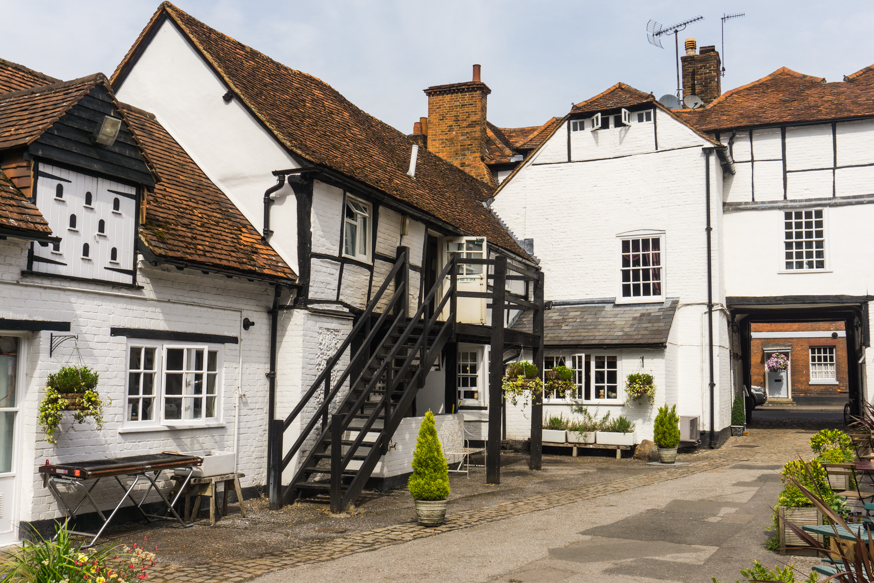
She was taught chess by her father and then her early trainer was Charles Dealtry Locock who lived with the family in the hotel above.
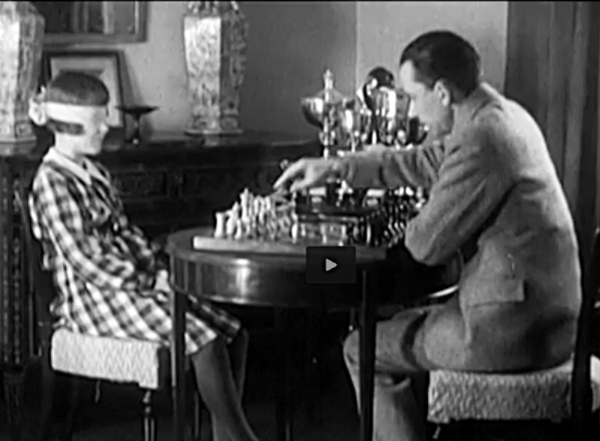
She married David Pritchard on Friday March 7th 1952 in the Chelsea Registry Office. Elaine was living at Wylderne, Bridge Street, Great Kimble, Aylesbury HP17 9TW. At the time of their marriage David was a Flight Lieutenant.
Elaine and David had a daughter, Wanda H Zelia Pritchard on March 21st 1958. She became Wanda Dakin who was also a chess player. Wanda attended Guildford High School for Girls and then Royal Holloway College, Egham.
In their later years Elaine and David lived at Badgers Wood, Hascombe Road, Godalming, Surrey, GU8 4AA :

From British Chess (Pergamon Press, 1983), Botterill, Levy, Rice and Richardson :
“Chesswise I seem already to have lived an alarmingly long time, the era of Capablanca and Alekhine back across the war years was another world. The three games I have chosen belong to three distinctly different periods in these fifty years – the juvenile long-ago, the most elderly present and the middle when I was playing tolerably well and was awarded the WIM title.
My father, assisted by a 2d. (= almost 1p) book of rules from Smiths, taught me the moves at somewhere round the age of five. We were rescued by the problemist CD Locock who noticed me playing in a girls’ tournament two years later. It was he who brought me up on a diet of the Scotch, the Evans and any gambit that was going. We analysed them in some depth – for those days – and my severe task-master made me copy out long columns of dubious lines. He also made me his guinea-pig for his Imagination in Chess and it is small wonder that I still find it hard to resist a sacrifice, and much of my undoing comes from premature sorties such as f4 and Qh5.
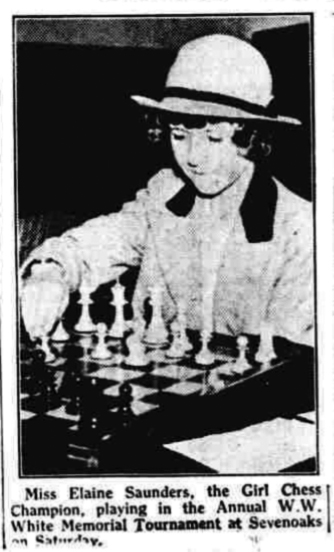
In retrospect he must have been a brilliant teacher. Starting in 1936 a succession of girls’ titles came my way including the FIDE under-21, and in 1939 the British Ladies at the age of 13. It is hard to assess how strong or weak one was at the time because there has been such a marked improvement in the standard of play among women over recent years. At all events, those pre-war years were happy ones, especially away from chess which took second place to horses and more physical pastimes.
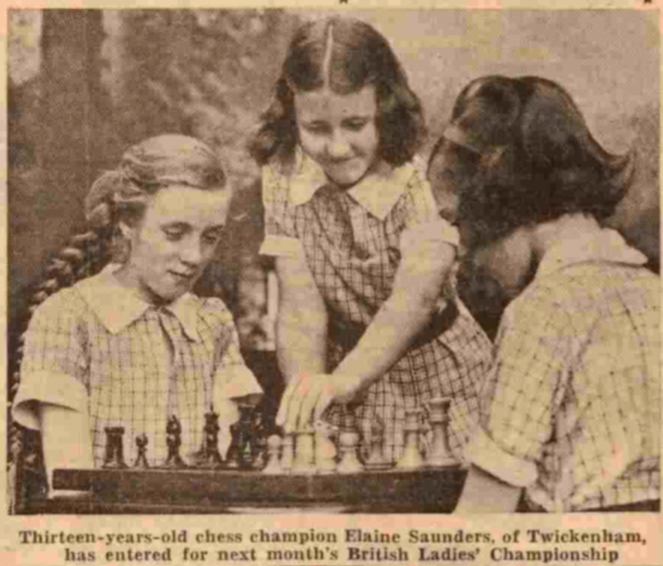
The incident which received the most publicity was the ‘affair Alekhine’. Most of the pre-war giants were kindly if a little condescending towards me but the new World Champion – he had just regained the title from Euwe – showed me no mercy. He took on 30 Kent players at the Charing Cross Hotel and after 5 hours demolished all except myself. The ending was equal. He stood over our board and glowered. ‘Give the child a draw’, said someone in Russian in the audience, which despite them mid-night hour were everywhere on chairs and even under tables. ‘I know what I am doing’ came the reply, and of course he did. I lost.
At 13 the world changed. I almost gave up chess. There were no celebrations after that Ladies Championship. The foreign masters packed their bags for home; we packed them for exile in Buckinghamshire and filling sandbags.
My saddest personal loss of the war was Vera Menchik, perhaps the strongest lady player of all time.
Leaving university with a poor, but lightning degree in French, I was employed by the Foreign Office and spent the next few years in London. While at college I had won the Notts County Championship and like to remember my last game on top board for county against the great HE Atkins, so many times British Champion, making his final appearance for Leicestershire.
I forsook women’s events and achieved probably my best results, finishing equal 3rd in the London Championship final, having beaten David Hooper with an Allgaier Gambit, and qualifying for the British Championship at Buxton in a section which included L. Barden, V. Berger and DB Pritchard.
Marrying David in 1952, we went to the Far East for three years and on our return I made a come-back to women’s chess and won the title at Blackpool in 1956. I was consequently despatched to the Western Zonal in Venice and finished equal 2nd with Lazaravic. This qualified me for the Interzonal, but my daughter Wanda arrived (March 21st 1958) before I could get to the starting post. Meanwhile with Eileen Tranmer we represented the BCF in the first women’s Olympiad in Emmen in 1957 where we finished 7th. The Finals went well for me and included a draw against Rubtsova, the then world champion. The results of the two tournaments were sufficient for me to be awarded the IWM title. My BCF grading at that time was 200 and has gone down ever since!
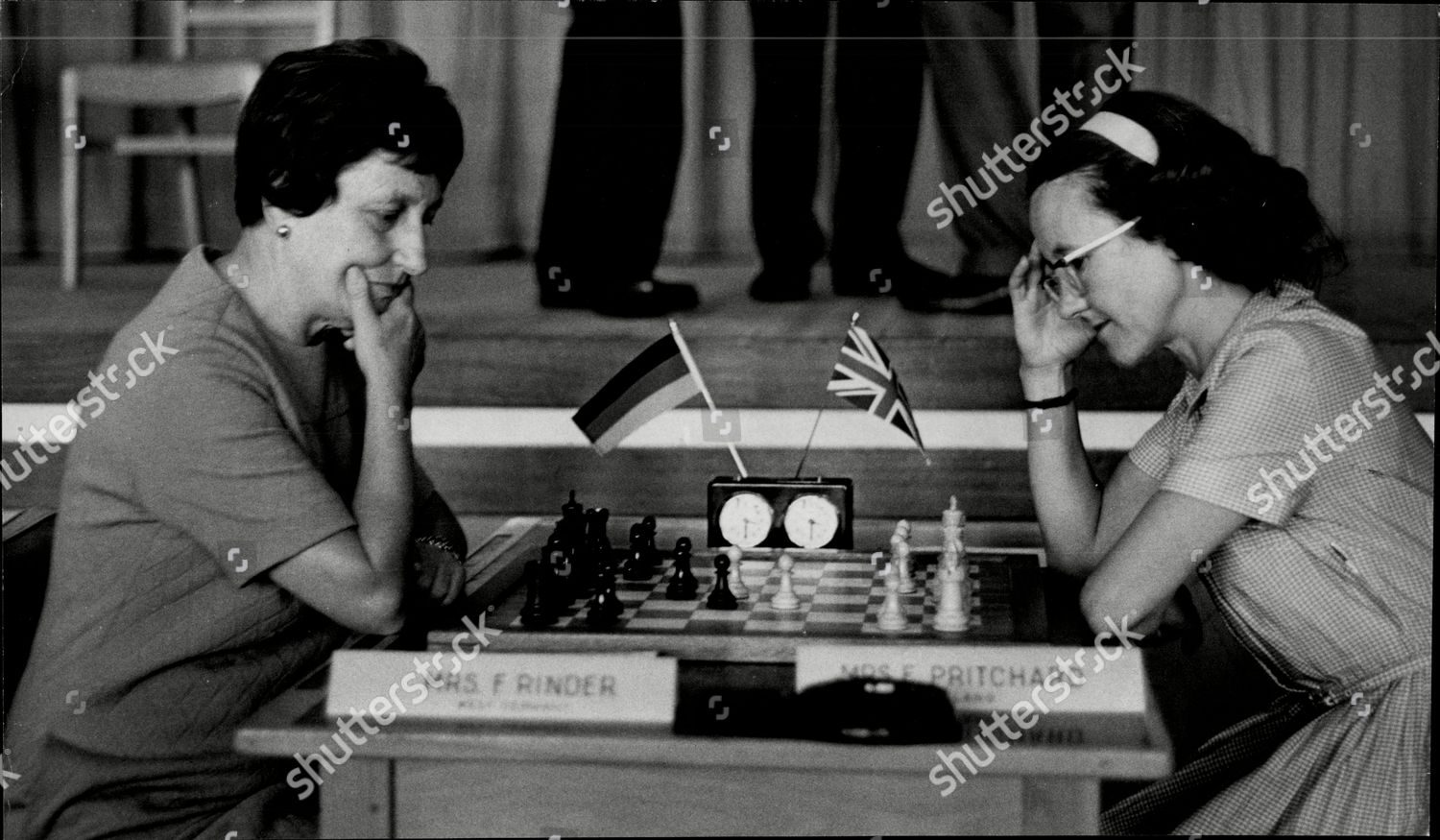
And so some 20 years on and still a teacher, we reach the final period, that of comparative dotage. Notwithstanding, I have been fortunate enough to have played in the last four Olympiads at Skopje, Medellin, Haifa and Buenos Aires, twice as captain of the team. It was, of course, pleasurable to win a silver medal at Haifa, despite the fact that the East European bloc was missing. The last of the three games comes from Haifa at a crucial stage. Playing for a team has always seemed more fun.
Also in my dotage belong two books, Chess for Pleasure
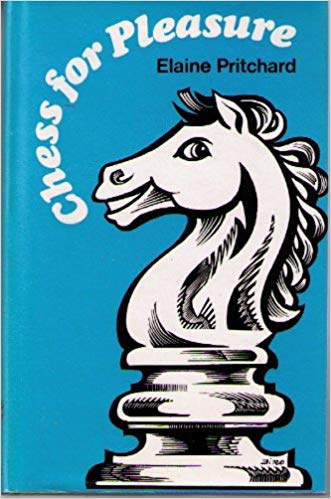
and The Young Chess Player (Faber) and organisation of girl’s chess, particularly the Faber Cup”

From The Encyclopaedia of Chess (Robert Hale 1970 & 1976), edited by Anne Sunnucks :
“International Woman Master (1957) and British Woman Champion in 1939, 1946, 1956 and 1965.
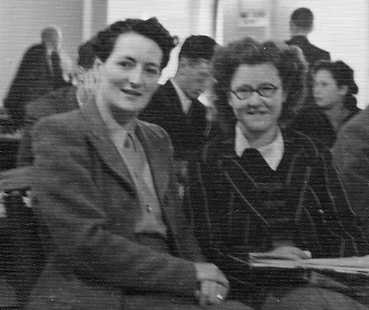
Elaine Pritchard was, as a child, one of the few girl prodigies in the history of the game. She was taught the moves by her father when she was 5.5 and started to play in tournaments at the age of 7. When she was 10 years old, she won an under-21 girls’ tournament sponsored by FIDE and at the age of 13 won the British Ladies Championship for the first time.
She is married to David Pritchard, ex-Southern Counties Champion and Malayan Champion in 1955, when she was stationed with the RAF in Singapore, who tells of how when he first met her, when she was about 7, she was unable to reach the far side of the board.
Her successes in more recent years include 2nd in the Western European Women’s Zonal Tournament of 1957 and 6th in the same event at Arenys de Mar in 1966; 3rd at Havering 1967 and 3rd at Paignton 1967. She played for the British Chess Federation team in the First Women’s Chess Olympiad at Emmen in 1957.”
From The Encyclopaedia of Chess, Edited by Harry Golombek :
“International Woman master and British Woman champion 1939, 1946, 1956 and 1965, she was a girl prodigy with perhaps the most natural talent for the game of any British-born woman. She was playing competitive chess at the age of seven and was only ten when she won the FIDE Girls Open chess championship (under-21) in London in 1936, winning eleven out of twelve games played.
British Girl Champion (under-18) 1936-8 she won the British Women’s Championship in 1939 at the age of thirteen. Winning the title on three more occasions she hardly ever had a bad result in the event but, by profession a teacher, she did not always have the time to devote to the game.
Her best international results were 2nd in the Western European Zonal Women’s tournament in 1957 (the year she gained the Woman master title), and two 3rd places in Paignton and Havering 1967. She represented the B.C.F. in Women’s Olympiads at Emmen 1957, Skopje 1972, Medellin in 1974 and Haifa 1976. (H.G.)”
Elaine did not merit mention by Hooper & Whyld it would appear.
The following obituary by James Pratt appeared in the February 2012 issue of British Chess Magazine :
“Via Godalming Chess Club we learn of the death of International Woman Master, Elaine Pritchard (née Dorée Elaine Zelia Saunders ) (7 i 1926 Brentford – 7 i 2012 Gloucester). British Lady Champion in 1939, 1946, 1956 and 1965, she became an IWM in 1957. A child prodigy, she won the World Girls Under 21s at the age of ten and first captured the British Ladies title at the outbreak of WWII. Mrs Pritchard wrote two books, Chess for Pleasure and The Young Chess Player. She was an occasional BCM contributor. Her last published grade was in 2003. She was an Honorary Life Member of the ECF.”
and here courtesy of Edward Winter is an excellent article on chess prodigies including many scanned photographs of Elaine.
and here is an obituary for the ECF written by Stewart Reuben
and here is her Wikipedia entry
and finally a discussion of Elaine on the English Chess Forum.